
 Javier Raventós
Javier Raventós
 Javier Raventós
Javier Raventós
Este libro se terminó de imprimir en Colombia en junio de 2022
Primera Edición
This book has? was? fnished printing in Colombia in June 2022
First edition
CREDITS
AUTHOR / Javier Ignacio Raventós Núñez
EDITORIAL COORDINATOR / Javier Ignacio Raventós Núñez
DESIGN / Beatriz Osuna Patiño
WRITING AND STYLE CORRECTION / Kevin Monzón, Javier Raventós
PRODUCTION DIRECTOR / Germán Izquierdo Orejuela
DIGITAL PRE PRESS / One Services
PRINT / Promograf S.A.S.
EDITORS / José María Raventós – Javier Ignacio Raventós Núñez
STOCK IMAGES / Freepik
Páginas: 10, 13, 17, 19, 20, 22, 24, 26, 35, 43, 53, 60, 187, 191, 193
ISBN / 978-628-95029-1-6
All rights reserved; reproduction prohibited in whole or in part without the express approval of the author.
This book has fnished printing in Colombia in June 2022
First edition
Juan
Juan Diego Osman, CEO Sistepagos
21 TRANSFORMACIÓN DIGITAL, RETOS, OPORTUNIDADES Y DESAFÍOS EN EL SECTOR FINACIERO
Gabriel Alzáte, Senior Consultant in Innovation and Digital Transformation, VP of Innovation at Red5g 23
37 FROM WORDS TO DEEDS: EVOLVING CORRESPONDENT BANKING IN THE SERVICE OF DIGITAL FINANCIAL INCLUSION
Sandra Rubio DaCosta, CEO & Cofounder of Imix
41 HOW TO ATTRACT INVESTORS TO A FINTECH
Camilo Zea, CEO - Pronus
45 MUJERES EN FINTECH
50 LEGAL ASPECTS OF FINTECH INVESTMENT IN COLOMBIA
Alexandra Baquero Neira, Sigma Partner
54 ININVESTORS WITH A FINTECH FOCUS
Silvia Flórez, Endeavor
60 FINTECH FIGURES IN COLOMBIA
Colombia Fintech
63 FROM THE TECHNOLOGICAL REVOLUTION TO THE DIGITAL REVOLUTION
Daniel Materón, CEO Rapicredit
27
Mayra Granada, CEO Wiipol
Ana Maria Prieto, Deputy Director, Ministry of Finance, Financial Regulatory Unit
30 BLOCKCHAIN: THE BANKING KILLER
Daniel Navarro, CEO & Founder of Nimmök
33 FINANCIAL INCLUSION IN COLOMBIA
Luis Carlos Ramos, General Manager Fintech in Sured
CONTENT CONTENT | 3 4 PRESENTATION Andrés Albán, CEO and CoFundador Puntored 6 FOREWORD Academic and Innovation Director JMR Comunicaciones 8 CROWDFUNDING IN COLOMBIA Erick Rincón Cárdenas, Associate Professor and Director of Tic-Tank at Universidad del Rosario 12 ATTRACTING FINTECH INVESTMENT Guillermo Guzmán, Director of AsoStartups 14 TOWARDS EFFECTIVE FINANCIAL EDUCATION FROM THE FINTECH MOVEMENT
Camilo
CEO & Founder Figuro 16 FINTECHS UNDER THE VENTURE CAPITAL SPOTLIGHT
& Alliances Colombia, México and Perú
González,
Mike Simmons, Scouting
18 “FINANCIAL INCLUSION”: A PROCESS THAT MUST TRANSCEND A TOPICAL CONCEPT
THE
TALENTS...
FINTECH SECTOR, FROM EMERGING TO CONSOLIDATED Esteban Velasco, CEO and Co-founder of Sempli 25 BUILDING TECH
OPEN FINANCE: A NEW COMPETITIVE CONTEXT
66 IRIS 74 SISTECREDITO 82 FONDO NACIONAL DE GARANTIAS 90 TRII 98 FLOID 106 LUEGOPAGO 114 NIMMÖK 122 MOVII 130 NUBLOQ 138 SUMUP 146 EPIK 154 RAPICREDIT 162 INFOBIP 170 METAMAP 178 LATAM TRADE CAPITAL 189 ECOSISTEMA DE AFILIADOS 194 AGRADECIMIENTOS
PRESENTATION
ANDRÉS ALBÁN CEO AND CO-FOUNDER PUNTORED

4 | FINTECH COMPANIES IN COLOMBIA ΙΙΙ
The number of Fintech companies has doubled in recent years and Colombia is one of the leading countries in the sector, being attractive for investors, foreign companies and startups that join this ecosystem that is trending globally. In the third edition of Fintech Companies in Colombia III: Their challenges and achievements; Javier Raventós continues the analysis of the sector with new companies and opinion leaders of the diferent Fintech verticals: digital payments, digital credit, personal fnance and crowdfunding to name a few.
In our case, Colombia is facing regulatory changes such as the CONPES on Financial Inclusion and the CONPES on Electronic Commerce.
We are the third country in the region to implement an Open Finance scheme and the market in general has been accelerating its transformation process. Although the government’s efforts have been important, there are still pending issues, such as the Open Finance Decree. A collaborative space is needed between the industry and regulatory bodies to strengthen the ecosystem and bet on training talent that responds to the needs of a changing market where the user will be at the center of decision making.
This book addresses issues related to fnancial inclusion, capital raising, financial education and Fintech talent, compiled in articles from the perspective of entrepreneurs, founders and industry leaders in the country. This will allow the reader to understand regulatory perspectives, trends, and to analyze the market in order to understand where the industry is and where it will move.
Additionally, a brief analysis of Colombia Fintech is included as a sample of the road traveled over the years; for its part, the Association has positioned itself as one of the most infuential in the region and that is why by December 2021 there were more than 290 companies that were part of it. Digital credit was the most representative vertical of the ecosystem, followed by digital payments and corporate finance; in addition, the Fintech industry achieved a record figure of 3.7 trillion pesos by 2021, representing 0.31% of the GDP of the Colombian economy.
We hope you enjoy this volume and have an approach to the trends of the Fintech industry in Colombia, you will find from the hands of leaders and entrepreneurs in Colombia how they join eforts to not only grow the industry, but continue contributing to the financial inclusion of Colombia.
ANDRÉS ALBÁN | 5
FOREWORD
JAVIER RAVENTÓS ACADEMIC AND INNOVATION DIRECTOR JMR COMUNICACIONES
The Fintech ecosystem in Colombia is becoming more robust every year. With a consolidated growth year after year, as we will see later in the article on Fintech fgures prepared by Colombia Fintech. We also see every day how the diferent Venture Capital are betting on investing in this ecosystem and each time with more and more important investments.
In this third issue of the book, we wanted to give special emphasis to fnancial inclusion, human talent, education and capital raising, among other topics. To this end, prominent professionals participate in this third edition, contributing their knowledge and experience, which will surely be of great value and contribution to the Fintech community and to professionals and companies that are not part of the ecosystem but that follow up on it. In this edition are the following cracks: Andrés Albán, Erick Rincón,
Juan Camilo González, Guillermo Guzmán, Mike Simmons, Juan Diego Osma, Gabriel Alzate, Ana María Prieto, Esteban Velasco, Mayra Granada, Silvia Flórez, Luis Carlos Ramos, Daniel Navarro, Sandra Rubio, Alexandra Baquero, Camilo Zea, Daniel Marterón, Carolina Vélez and the Fintech women in Colombia.
We will also fnd the story of important companies in the ecosystem that are doing an impressive job and where we fnd an impressive passion, innovation, development and great products/ services. Iris Bank, a bank that was born 100% digital, becoming the great ally of companies in Colombia, with easy and very agile procedures, with an annual growth rate of 40%. Luegopago. com: The frst “Buy now, pay later” market place in Latin America, empowering digitally consumers who want to have greater fnancial control. Floid: Pioneer in Open Banking; I could summarize
6 | FINTECH COMPANIES IN COLOMBIA ΙΙΙ
them as in all sources of information in a single API. FNG - Fondo Nacional de Garantías: which has facilitated access to fnancing for diferent Fintechs in Colombia. Today 13 Fintechs have a guarantee value quota that varies between 600 million and 77 billion. Nimmök: a large international consulting firm, expert in the development and co-creation of digital fnancial services businesses. Sistecrédito: 25 years, connecting people to their dreams. They have made it possible for more than 4 million people to access credit and fulfill their dreams. Trii: democratizing the stock market, with an app to invest in shares, easy and safe. Rapicredit: in just a few years it has managed to provide more than 4 million loans, making fnancial inclusion a reality for many Colombians. Movii: humanizing the Colombian fnancial system. A non-bank to move money. Sumup: which through its mobile data phones allows all types of businesses to
accept credit and debit cards, anywhere, easily. Nubloq: helping companies to offer financial products to their customers easily and securely. Epik: with its digital financial solutions, fast and secure, innovating in digital credit models and cobrand cards in Colombia and Central America. Metamap: building trust between companies and customers, verifying, evaluating and incorporating new customers in the blink of an eye. Latam Trade Capital: the fnancial ally of companies.
I hope you enjoy this work, as much as I have enjoyed doing it, learning from all these professionals and companies that are very very cracks. What they do is more and more impressive.
JAVIER RAVENTÓS | 7
CROWDFUNDING IN COLOMBIA
ERICK RINCÓN CÁRDENAS ASSOCIATE PROFESSOR AND DIRECTOR OF TIC-TANK AT UNIVERSIDAD DEL ROSARIO.

Crowdfunding obeys a collaborative economy model, which aims to achieve a better distribution of resources through a technology-driven exchange. In this way, using digital platforms, a democratized exchange has been promoted as a new alternative fnancing modality, which has managed to address the inequality and limited access that a large part of the population has to the fnancial system, as well as to generate a greater availability of resources in the country.
Collaborative fnancing is structured under the basic pillars of exchange, enabling interaction between users who have interests that can be reciprocally satisfed by meeting in a digital
space, that is, through the intermediation of a digital platform that serves as a communication channel between the parties. These platforms provide exposure to diferent productive projects that require fnancing, facilitating relationships between the owners of a project and investors or lenders who see in it an opportunity to increase their income or obtain another type of beneft.
These alternative financing platforms are an innovative mechanism for finding different sources of funding, generating possibilities of acquiring economic resources without facing the various entry barriers imposed by the traditional fnancial system. This is an attractive alternative
8 | FINTECH COMPANIES IN COLOMBIA ΙΙΙ
for small, medium-sized, and new companies that do not have the possibility of acquiring credit easily and, additionally, do not have sufficient exposure to attract investors to promote their projects.
At the same time, these platforms have represented greater competition in various economic sectors, since different actors are integrated and develop their projects leveraged by this method of financing, furthermore, generating more employment in the country and stimulating the national economy. Likewise, Crowdfunding manages to reduce costs since its operation is leveraged by technology and digitalization, which reduces operating costs and allows transactions to be carried out easily and quickly.
On the part of the contributors, the benefts are also evident, since they can expand their investment portfolio, have the possibility of investing in diferent projects that are advertised on the Crowdfunding platform, maintain the value of their money over time, and even obtain profts above infation. In addition, the integration of new participants is enabled, since small investments can be made in diferent projects, so it is not necessary to have large amounts of money to join this activity or assume large risks in a single investment project.
Crowdfunding identifies four main categories of globally recognized funding:
Loans: Borrowers agree to pay the loan to the lender, plus interest on a predetermined date;
Equity: Investors ofer capital in exchange for a stake in a company;
Donations: Financing of social or charitable projects, without expecting money or a reward in return; and
Rewards: A product or service is ofered in return for each person’s contribution to the project, i.e., a non-monetary consideration is obtained.
This new fnancing model is attractive, which is why countries such as Colombia have had the task of regulating its operation to provide greater legal certainty to this activity. Such regulation is based mainly on Article 335 of the Colombian Constitution, which states that any activity related to the management, use, and investment of the resources collected by the public must be exercised with prior authorization by the State and in accordance with the law. The collection of funds from the public is subsequently established as a crime penalized by Article 316 of the Colombian Penal Code, therefore, in order to allow this model to operate in Colombia without incurring the criminal type described in Decree 1981 of 1988, it has had to be integrated as a regulated and supervised fnancial activity.
For its part, the Securities Market Law (Law 964 of 2005) states that any entity that issues and ofers securities shall be subject to State supervision, mainly because securities are negotiable rights whose purpose is to raise funds from the public. In addition, Decree 2555 of 2010 determines that the public ofering of securities requires, in addition to the authorization of the Colombian Financial Superintendency, registration in the National Registry of Securities and Issuers.
Thus, in line with the activities to promote fnancial inclusion carried out by the Colombian National Government, Decree 1357 of 2018 is issued with the purpose of making access to financing products viable for certain sectors of the economy that have particular needs on this front, such as small and mediumsized enterprises (PYMES) and establishing a regulatory framework for the operation of collaborative financing of productive projects through securities.
This Decree defnes crowdfunding as an activity carried out through an electronic infrastructure, in which a plural number of contributors are put in contact with a recipient that requests financing in its own name to allocate it to a productive investment project. Under this regulation, only two types of financing are allowed, through debt securities and equity securities. However, the exclusion of the other
ERICK RINCÓN | 9
categories of Crowdfunding does not imply that these operations cannot take place in the country, being their operation viable, although no regulation provides regulatory structure to these operations beyond general rules, such as those relating to the raising and public ofering of securities.

Likewise, to operate as a crowdfunding company it is necessary to be incorporated as a corporation authorized by the Financial Superintendency of Colombia to carry out this activity and to be registered in the National Registry of Securities Market Agents. In addition, stock exchanges
and securities trading or registration systems authorized by the Financial Superintendency of Colombia may also carry out this financing activity.
These authorized entities, in the development of their operations, must comply with the rules of disclosure of information, operating standards and functioning of the infrastructure that the activity entails, the mechanisms for the protection of recipients and contributors of fnancing, as well as rules for the prevention of money laundering and management of conficts of interest, among others. In addition, they must
10 | FINTECH COMPANIES IN COLOMBIA ΙΙΙ
ensure that each project has a maximum term for obtaining resources, which in no case may exceed 6 months from the date of publication of the project, time in which the minimum percentage that makes the respective fnancing viable must be reached, promoted by a plural number of contributors.
Finally, this Decree reiterates the intermediary status of these companies by prohibiting them from providing advisory services related to productive projects, directly managing the resources of the productive projects fnanced, ensuring returns or yields on the investment made, and acting as recipients or contributors.
Recently, in order to give greater applicability to this model, Decree 1235 of 2020 was issued, which enables the realization of Crowdfunding operations by donation, by determining that such platforms may allow or facilitate the delivery of donations to promote diferent projects.
On the other hand, this new Decree increased the maximum amount of fnancing, specifying that each recipient may receive a maximum of 58,000 legal monthly minimum wages (previously limited to 10,000) from qualified contributors and 19,000 legal monthly minimum wages (previously limited to 3,000) from non-qualifed contributors.
Thus, these platforms are currently empowered mainly to advertise collaborative financing projects, implement channels to facilitate the delivery of information on the productive projects to the contributors, and enable the necessary tools to execute the operations that formalize the fnancing of the productive project, collect resources through entities supervised by the Financial Superintendency of Colombia other than the crowdfunding entities themselves, provide additional collection services, manage systems for registering transactions on the crowdfunding securities that have been issued through the crowdfunding platform itself, and also provide services that allow recipients registered in the platform to receive donations.
Regarding the presence of Crowdfunding companies in Colombia, it is worth mentioning
that this activity is incorporated as a sector of the Fintech industry, as it integrates a branch of fnancing methods leveraged by technology. However, considering the 36% growth of the industry from 2017 to 2020, according to the Fintank Sector Report conducted by Colombia Fintech (2020), the percentage of entities that develop crowdfunding is significantly lower, as out of a total of 322 financial technology companies consolidated in the country, only 3.73% dedicate their eforts to Crowdfunding.
Some of the Crowdfunding platforms in Colombia along with some representative figures of the deployment of their activity:
The a2censo platform of the Colombian Stock Exchange allows its participants to make debt and equity investments from low amounts. To date, this crowdfunding platform reports 7,056 investors, 26,154 investments, 36,638 fnanced, and 94 successful companies.
Agrapp is an application through which contributors finance farmers obtaining an expected return of 18.5% E.A., reporting to date more than 399 investment partners that support 72 agricultural entrepreneurs in the country and a sum of more than 3.2 billion pesos available for fnancing the rural sector.
Help is a foundation aimed at fnancing studies and education projects in Colombia, which has collected more than 130 million pesos in micro-donations through crowdfunding, planted 1,100 trees, delivered more than 1,600 markets, and painted a school in Ciudad Bolivar.
Finally, it should be noted that Crowdfunding generates a competitive business environment in the country and represents benefits for both contributors and those financed. However, despite being an attractive sector for representing an alternative financing model, Decree 1357 of 2018 failed to promote this type of platforms, therefore, Decree 1235 of 2020 is issued, which modifes and adds certain aspects to encourage the incorporation and deployment of crowdfunding in the country.
ERICK RINCÓN | 11
ATTRACTING FINTECH INVESTMENT
GUILLERMO GUZMÁN DIRECTOR OF ASOSTARTUPS
By December 16, 2021, Latin American startups raising venture capital had raised $14.8 billion across 772 deals as recently reported by PitchBook.
That fgure, with reference to the state of venture capital investment, known two weeks from the end of 2021 represented by far a record amount of investment that in a single year totaled far more than the combined sum of total capital invested in the region from 2014 through 2020. Of that large annual amount invested by venture capital that triples the previous 2019 record of $4.8 billion, 42% was invested in fntech.
This report leads us to conclude without equivocation, and in spite of the catastrophic consequences that the COVID-19 pandemic has had on our region, that Latin America has defnitively and forcefully entered the radar of international investors, who additionally see, together with the venture capital investment funds of our region, that the fnancial technology sector is the one that has more potential to positively impact a market of hundreds of millions of people who share basic fnancial pains and problems magnifed by the quarantines of the past years 2020 and 2021, as well as by the fall in the performance indicators of our region, the potential to positively impact a market of hundreds of millions of people who share basic fnancial pains and problems magnifed by the quarantines of the past years 2020 and 2021, as well as by the fall in the performance indicators of our economies.
From the lack of fnancial inclusion to the low access to credit at reasonable interest rates for our Spanish-speaking people, 95% of the population in communities south of the dollar, which if addressed by agile, creative and well-

funded startups could be a definitive and key factor in meeting the 2030 sustainable development goals set by the UN.
Colombia in particular managed during 2021 to consolidate the growth of its fntech ecosystem in terms of the turnover of its startups, the number of jobs generated by these companies and the amount of investment, which as we have already mentioned, set record fgures in its annual fundraising. LAVCA reported that by the frst half of 2021, private equity investments in Colombia exceeded $1.3 billion dollars.
In view of the fgures we have on the table and in view of the immediate future of our economy, which is facing an increase in infation fgures, a
12 | FINTECH COMPANIES IN COLOMBIA ΙΙΙ
sustained devaluation and a stock market that has yet to take of, Colombia must take the route of adopting regulatory measures and other activities that will lead to the materialization of open banking and from there to a consistent evolution towards open finance, as has been the trend in other geographies, in order to open up opportunities for economic and social development.
If Colombia and its creative force as a whole intend to reduce unemployment and increase productivity within the framework of observing sustainable development standards as highlighted by the recent 2021 United Nations Climate Change Conference (COP26), new fintechs aimed at creating products and services that help consumers and businesses meet environmental goals must emerge in our country:
Green loans, Carbon footprint tracking, Asset tokenization, and New applications and protocols on distributed databases (known as blockchain).
Colombia in particular managed to consolidate the growth of its fntech ecosystem during 2021 in terms of the turnover of its startups, the number of jobs generated by these companies and the amount of investment, setting record fgures in its annual collection.
These new technologies, new standards and new applications and business models are the validators on which our entrepreneurs should ride to guarantee in the long term to Colombia and Latin America to maintain a generous fow of investment of entrepreneurial capital, and the strengthening of our technological, fnancial and business ecosystems.

GUILLERMO GUZMÁN | 13
TOWARDS EFFECTIVE FINANCIAL EDUCATION FROM THE FINTECH MOVEMENT
JUAN CAMILO GONZÁLEZ CEO & FOUNDER FIGURO

The last two years have seen an acceleration in financial products and services supply through digital channels. As of November 2021, investments in fintech had grown by 173% compared to 2020, according to Boston Consulting Group. In Colombia alone, the Association of Fintech Companies expected a 30% growth in the number of start-ups in this sector.
However, this boom in the supply of new digital fnancial products and services has brought a key question for the industry's future: how prepared are users to use these solutions efectively, and what role do fntechs play in this preparation?
Colombia is a country with enormous challenges in terms of financial education. According to CAF (2021), half of those surveyed in their study believe in ofers that guarantee them to multiply their money quickly. In addition, no population group in the country has high fnancial well-being scores.
According to the OECD (2020), only 28.8% of adults in Colombia reach the minimum desired financial knowledge score (the lowest score among all participating countries). In addition, the country has the lowest percentage of active savers and the fourth-lowest fnancial well-being score within the sample of countries belonging to this organization.
14 | FINTECH COMPANIES IN COLOMBIA ΙΙΙ
In 2022, there is no doubt that the use of digital platforms to deliver fnancial services to individuals and businesses is a promising and efective tool for promoting fnancial inclusion. The rapid growth of these solutions -in line with the trend of giving consumers more access and power- has made users increasingly responsible for their own fnancial planning. The multiplication of alternatives to pay, save, take credit, invest, or protect themselves has led the fntech movement to understand that fnancial education is a central axis of its success and consolidation. Traditional fnancial institutions understood this more than a decade ago. Law 1328 of 2009 made the development of fnancial education programs by credit institutions in the country mandatory. Although great initiatives have been developed in the last decade, many of these actions faced the immense difculty of making them massive and efective in physical offices, face-to-face workshops, primers, and fyers.
Today, fintechs are not only creating more convenient and diversifed channels to access better fnancial products and services but also better fnancial education vehicles.
One of the most signifcant advantages fntechs have over the traditional industry is the ability to educate in real-time, in the same place, and at the same time as the fnancial decision or interaction with the platform. Several fntechs are already recognizing this advantage in the country. The offerings are becoming increasingly varied from free personal fnance courses ofered by companies like Figuro (Insurtech), Tributi (PFM), and Tyba (Wealth Management) to webinars on specifc topics such as investments ofered by Trii (Wealth Management) or debt management at Linxe (Lending). Many others provide tips, notifications, and explanations throughout the use of their tools, like Habi (Proptech) with online appraisals, Nequi, or Nubank when depositing money or applying for a credit card. Even companies outside the fntech ecosystem understand the importance of promoting
fnancial education, as demonstrated by Platzi's School of Personal Finance for its students.
Consumers will have access to specialized fnancial programs and content in the coming years. For example, instead of a single fnancial institution trying to teach them everything about money management, they can learn protection strategies from an insurtech, budgeting from a neobank, and investing from a wealth management fntech. However, for these eforts to have a real impact, it will be necessary for these actors to collaborate amongst themselves and with inter-sectoral and national strategies for fnancial and digital education so that more people can beneft from fntech and true fnancial inclusion can be achieved.
Digital and financial literacy must also be closely linked. This is essential to prevent users from making inadequate financial decisions because they assume that their profciency with technology also indicates a high level of fnancial skills, or conversely, users with strong fnancial knowledge miss out on the benefts of fntech because of a lack of digital skills.
If the fintech industry wants to empower consumers, we must promote truly digitally and fnancially skilled and educated consumers. This is the only way we can realize the dream of the next decade: democratizing, personalizing, and decentralizing fnance and technology.
JUAN CAMILO GONZÁLEZ | 15
There are users with very good fnancial knowledge and capabilities who miss out on the benefts of Fintech because they do not have better digital skills.
FINTECHS
UNDER THE VENTURE CAPITAL SPOTLIGHT
MIKE SIMMONS SCOUTING & ALLIANCES COLOMBIA, MÉXICO AND PERÚ
Venture capital firms aim to obtain exorbitant returns for their investors while collaborating in the formation of an increasingly robust entrepreneurial ecosystem.
To achieve their objective, the frms analyze a series of factors of all the projects that come into their hands:
1 the capabilities of the founding team (undoubtedly the most relevant factor in early stage projects);
2 the identifcation of a substantial problem
3 the quality of the solution found;
4 the existence of a sufciently large market; and
5 the quality, capacity and scalability of the competition.
Many others could be mentioned, but their importance will depend on the stage of the project. In addition to the above analysis, a particularly relevant aspect should be studied when the project in question is a FinTech: the promotion of fnancial inclusion. To the extent that a Startup pursues fnancial inclusion, it will not only be impacting the lives of thousands and millions of people, but will also be building its own customer base, which in many cases will be accessing fnancial services for the frst time in their lives.

Latin America has around 70% of its population underbanked (including the unbanked). This highlights the size of the opportunity that FinTechs have in front of them.
While there are many factors that contribute to fnancial inclusion, I would like to focus on what I personally consider to be its two main pillars:
Credit Scoring:
Credit scoring consists of assigning a score to potential borrowers. In other words, it is an attempt to measure the repayment capacity of those who will become debtors. The credit scoring algorithms of traditional financial institutions have proven to be highly inefective, since they analyze limited factors such as:
1 delinquent status (payment of debts and taxes);
2 banked salary, corresponding to a formal job; and
3 bank account withdrawals.
As a consequence of the application of faulty scoring algorithms, a large percentage of the
16 | FINTECH COMPANIES IN COLOMBIA ΙΙΙ
LATAM population is classifed as ineligible for credit (“credit invisible”). This category usually includes freelancers , gig economy workers and, of course, the “unbanked” (even when they have a stable job).
However, there are many (insurgent) startups working on highly creative credit scoring mechanisms that analyze factors such as: call records, location of residence, and number of restaurants, ATMs or paved streets in the vicinity of the individual’s home. All of these data (and many, many others), analyzed together, allow for predictions of delinquency.
The above, which was unthinkable for the incumbent and traditional institutions, allows to:
1 credit the “credit invisible”, so that they can access fnancing for the frst time, and
2 enrich the information of many other borrowers in order to reduce the interest rate paid by them.
Education
No fnancial service could exploit its full potential without fnancial education of end users. It allows users to learn about sustainable consumption habits, and achieve savings capacity to eventually
be able to invest and make informed decisions.
Startups focused on promoting education can already be found in the market.
Entry level (whose audience is the unbanked population, who seek to learn about the diferent fnancial services available, and learn basic spending and saving behaviors);
Intermediate level (whose public is the banked population but without technical knowledge, generally seeking to take their frst steps in basic investments); and
Higher level (whose public is the banked population with previous technical knowledge, seeking to learn about sophisticated investments).
Over the next few years, it will be extremely inspiring to see how the unbanked of 2022 become credit takers and eventually sophisticated investors. Simultaneously, startups will upsell with their own customers: from wallet to credit services, and from credit to investment services. With a clear roadmap of the above, FinTechs pursuing fnancial inclusion will start of on the right foot when it comes to raising their first rounds of investment from institutional funds.
MIKE SIMMONS | 17
“FINANCIAL INCLUSION”: A PROCESS THAT MUST TRANSCEND A TOPICAL CONCEPT
JUAN DIEGO OSMAN CEO SISTEPAGOS

Surely we have had the opportunity to read countless articles, economic reports, statistical balances, about “financial inclusion”. It is a term that in recent years has gained relevance in the feld of fnancial services and, especially, in the Fintech sector. According to the World Bank’s defnition1 , “People and businesses have access to useful and afordable fnancial products and services that meet their needs: transactions, payments, savings, credit and insurance, delivered in a responsible and sustainable way”.
1 The Drive for Financial Inclusion: Lessons of World Bank Group Experience June 30, 2021
This is a defnition that brings us closer to the concept on which we have been working for many years on several fronts: government, fnancial system, Fintech sector. According to the Quarterly Finan cial Inclusion Report of Banca de las Oportunidades, as of March 2021 the indicator of access to financial products and services was 89.4% (more than 32 million adults have at least one savings or credit product).
However, it is essential to analyze whether we have really advanced in the process (based on the ofcial fgures we know, we should conclude that we defnitely have). In order to achieve an
18 | FINTECH COMPANIES IN COLOMBIA ΙΙΙ
adequate answer, it is necessary to carefully study the numbers provided regarding the result of the multiple strategies adopted to develop a satisfactory financial inclusion process whose positive impact on society is refected in benefts for the intervening parties and the economy in general.
From various sectors, multiple alternatives have been built that have made financial services more dynamic, allowing them to be available to users under more flexible and agile linkage conditions through the adoption of digital tools and channels.
The work goes beyond complying with statistics and the results expected from the governmental sphere.
The great challenge for the Fintech sector is to ensure that a process that is so necessary in countries in the region, especially ours, transcends fgures and quantitative objectives and becomes an engine for building solutions within everyone’s reach, generating permanence, recurrence and something even more important: “belonging”. When we feel that we belong to something, we develop loyalty, we express what we think, we contribute to the collective construction. It is this
spirit that should move us to reach thousands and thousands of Colombians (as we already do today), but with clear objectives: to reduce inequality, generate value in society and allow free access to multiple services with the most important challenge we could have: at afordable costs for millions of people.
We are facing a reality whose figures reveal that there is still an enormous amount of work to be done by all the actors of the national economy. According to DANE fgures about the labor market in Colombia 2 , as of November 2021 the percentage of informality was 47.3%, that is to say, about 5,485. 000 people were considered informal workers (according to the report, “the defnition adopted by DANE for the measurement of informal employment refers to the ILO’s 15th ICLS resolution of 1993 and to the recommendations of the DELHI group -a group of experts convened by the United Nations to measure the informal phenomenon- in which it is stated that a worker is considered informal if he/she works in an establishment with up to five workers, excluding independent workers engaged in his/her trade and government employees”).
JUAN DIEGO OSMAN | 19
2 Mercado Laboral. Principales resultados enero a noviembre de 2021. DANE
It is these fgures that should lead us to focus our eforts on providing access to those who, due to their activity, encounter enormous obstacles to access fnancial services.
In an interesting report by Credicorp Capital Group about the Financial Inclusion Index 3 , there is a data that illustrates the current situation.
It states that 7 out of 10 Colombians do not use any fnancial product per month (in percentage terms, 72%).
The sector has grown signifcantly. Investments in companies in the sector have increased in the last two years. Verticals such as credit and digital payments continue to be very relevant and their participation in the ecosystem is fundamental. However, it is necessary to continue working together in order to ensure that low-income people can have real access to fnancial services, to a broad portfolio and within their reach. We must decentralize the operation that will allow us to advance in meeting the challenge of fnancial inclusion at a national level. Statistics show that there is still a high concentration of users in the country’s main cities. According to a report by Banca de las Oportunidades in March 20214 , the percentage of adults with an active or current fnancial product (usage indicator) at that date
3 Índice de Inclusión Financiera IIF, Grupo Credicorp Capital. Año 2021
4 Reporte trimestral de inclusión fnanciera, Banca de las
was 74.4%. However, it is important to highlight that, according to this study, the access indicator is definitely much higher in the cities (above 98%), on the contrary, in rural areas it does not exceed 70% and, in the so-called dispersed rural municipalities, it is 57%. Possibly, access to internet or connectivity, use of new technologies, knowledge of digital tools, constitute an entry barrier to new options that allow access to fnancial services. However, it is essential to work hand in hand with all market players if better results and penetration in remote areas are to be achieved.
Even though the numbers show great progress in terms of access to fnancial products by the adult population of this country, we are still far from the main purpose, which is the one that refers to indicators of access, use of financial products, expansion of new solutions to rural and remote areas, access to fnancial products based on a cost scheme that is not exclusive, training in fnancial education for users, design and implementation of digital solutions that are easy to use and access.
The construction of alternatives must continue to advance. The articulation of efforts by the national government and the fnancial and Fintech sectors is essential. It is necessary to carefully analyze the opportunities for improvement and develop strategies that lead to results that allow us to conclude that fnancial inclusion is not just a current concept.

20 | FINTECH COMPANIES IN COLOMBIA ΙΙΙ
Oportunidades, primer trimestre 2021
DIGITAL TRANSFORMATION, CHALLENGES,
OPPORTUNITIES AND CHALLENGES IN THE FINANCIAL SECTOR
GABRIEL ALZÁTE SENIOR CONSULTANT IN INNOVATION AND DIGITAL TRANSFORMATION, VP OF INNOVATION AT RED5G

A few years ago we started talking about TD, some companies have taken it with great responsibility and others are just understanding the great opportunity they have, today it is not who is the biggest, it is who generates more value and how fast they can move.
Fintechs have managed to change the customer experience in the financial sector, they have listened to the customer and their needs, payments, transfers, remittances, etc., they
managed to penetrate non-bank markets, use technology as a means to help innovation in service and design of new products. These companies, most of them born from passionate entrepreneurs and with an extraordinary business vision, have captured the attention of large fnancial businesses, that is what it is all about, to be able to work together and take advantage of good ideas and not have to invent the wheel.
GABRIEL ALZÁTE | 21
The financial sector begins to have new challenges, cryptocurrencies, NFT (non fungible touches) and the metaverse are trends that are beginning to show runa reality, for example in the metaverse that surely we are a few years away from its reality and today we fnd platforms like Decentralan that although they are a beginning of what is really this new parallel universe is still much fabric to be cut. But today we already see how in digital games, in the same Decentralan to acquire goods such as houses. Lots, digital clothing, etc., are paid with cryptocurrencies and the fnancial sector can not be oblivious to this happening.
Fintechs are already being created focused on metaverse as well as on the management of NFTs, cryptocurrency wallets to make sales of these non-fungible assets, so it is important for companies in the fnancial sector to start managing these trends.

There are many ventures that require budgets to run their minimum viable products, it is difficult for these entrepreneurs to access credit many times, there are fintechs that leverage this efort with loans even being part of the project as partners, this is the dynamics of the new world, do not see the competition, but rather see the opportunity to grow together and achieve the goals.
One of the challenges for governments is to streamline the new laws that allow the continuity of fntechs in their innovation processes, many times technology goes faster than laws, we cannot aford to lose great innovative proposals because we do not have adequate legislation for this new world. We cannot aford to lose great innovative proposals because we do not have adequate legislation for this new world.
The great challenge for the financial sector is to achieve open banking, that is, to share information in order to decentralize, this could be used by fntechs to create new products and services of value that allow a bank with better indicators of satisfaction and use.
Some traditional banks are doing very well the intra-entrepreneurship to achieve “Fintech” as spin offs that allow them to move faster in the market, to be able to launch more fexible products and compete in the market with other fintechs, these actions allow to have parallel business models seeking sustainability in the future of banks. Therefore the importance of continuing to create fnancial startups supported by technology that are achieving great results and most importantly are impacting in a good way the lives of consumers. The most important thing is that they are impacting the lives of consumers in a good way.
22 | FINTECH COMPANIES IN COLOMBIA ΙΙΙ
THE FINTECH SECTOR, FROM
EMERGING TO CONSOLIDATED
ESTEBAN VELASCO CEO AND CO-FOUNDER OF SEMPLI

Recently, fintech was seen as an emerging industry with multiple startups entering the competitive arena. To speak of “emerging” is an understatement when looking at the dynamics and evolution of their business and value proposition. We see an industry growing with two purposes:
1 generate access to financial products and services in segments with low penetration or underserved segments; and
2 to ofer agile, simple and close experiences to customers. Along these lines, fntechs have become one of the most important market triggers to promote the financial inclusion
necessary for the development of Latin America, both for individuals and companies.
So what’s next for fntechs?
Today there are complementary challenges that will allow the industry to mature at the pace and rhythm that characterizes them.
With regard to the market, fintechs must provide scenarios of greater trust for segments of customers not yet served or simply awaken greater security and certainty in segments that maintain exclusive relationships with traditional or incumbent players.
ESTEBAN VELASCO | 23
The emergence of guarantee seals, affiliation groups, greater positioning and brand recognition, and even the entry of more highly regulated products, will lead to greater market confidence in fintechs. In a complementary manner, it is necessary to work hard on issues related to fnancial education, with the objective of enabling greater knowledge about the diferent options that clients have to adequately manage their fnancial products and to do so in such a way that access is amplified in a responsible manner.
In the face of the competitive environment, fntechs have several challenges to overcome on three fronts.
First, attracting high-value talent with experience in a disruptive sector is vital to continue the accelerated growth of this profle of companies. Diverse talent that combines market, commercial, operations, regulatory and financial knowledge with the creative explosion of dynamic technology, data and automation environments. The attraction of talent must of course be complemented by maintaining the high motivation and consequent retention of people who value the efervescent environments of fntech.
Secondly, generating levels of scale is imperative for the viability and sustainability of fntechs. This scale should be seen both in terms of a greater volume of clients or
revenues, and in the possibility of generating operating leverage that allows them to do more with an optimal and efficient use of resources, an issue that all fintechs will have to go through if they want to reach the economic fundamentals of balance between market acquisition and proftability.

Finally, there is investment or fnancing. We have witnessed an explosion of fundraising by fintechs, becoming in recent years the startup vertical with the highest attraction of venture capital profile funds, which has been quite positive for the development of the industry.
This will continue to be a constant in regions where the gaps in fnancial inclusion are still wide, so liquidity and availability of resources will remain in force.
In any case, fntechs will have to be vigilant of possible excess inflation in valuations and/or the respective investment terms and return expectations required in this type of operations.
Finally, the whole must be greater than the sum of its parts, so collaboration spaces between the diferent players will be fundamental for the industry to continue to stand out as it has been doing.
24 | FINTECH COMPANIES IN COLOMBIA ΙΙΙ
BUILDING TECH TALENTS...
MAYRA GRANADA CEO WIIPOL

Today we talk about innovation, digital transformation, user-centric service experience, technology, the tech era and other issues to be taken into account for a company to be successful. Most of us leaders have even questioned whether human talent will be necessary in the future or whether it will be easily replaced by machines.....
Today, I want to tell you a little about what I think and more than what I think, what I feel, vibrate and live daily in the great challenge of building teams that are result-oriented and passionate about what they do. I am totally convinced that human talent is the most important and valuable thing that an organization has, and that one of the most relevant challenges we leaders face in
today’s world is the ability to shape, build and develop teams that do not work only for a salary, but for passion, that every day when they wake up they feel joy and gratitude for having a company to go to, perform their duties with dedication, giving their best and that this is reflected in extraordinary results for the company.
During my career as a professional in the fnancial world I have had the opportunity and blessing to meet different types of leaders, with their example I have learned that I can replicate and defnitely not. There are the traditional ones who still lead with strict compliance with schedules, long working hours, perfect protocol of clothing, building long and tedious processes, only their ideas are good and become reality and the
MAYRA GRANADA | 25
organization where they are today is their only world, for them all people are easily replaceable, because they never want someone better. I have also had leaders with essence, who let you be as you are, let you do and fail to learn, who support ideas, make them come true, are committed to your growth and create a culture of innovation and discipline that the only thing they end up getting are positive results, those leaders who surround themselves with the best talent and are not afraid of anything, because they feel safe, they shine with their own light.
I want to tell you that I have found it vital in the conformation of the team for Wiipol, Fintech that I currently lead:
To hire human beings with well-formed values and principles from home, to inquire about their family life, their education, with whom they have lived and also to understand their context, what makes them happy and what does not.
In this sense, each person should be allowed to show and act with their essence, this will allow them to be happy in their actions. Generate spaces and teach different methodologies that allow creating and
implementing ideas that beneft the process of each collaborator, of the area and that are focused on the user. It is important that people are allowed to make mistakes and that everything is used as learning for the implementation of new projects.
Autonomy in their position and inclusion in decision making are important for the team to feel committed and valued by their superiors. The creation of a benefts portfolio focused on the user, i.e. knowing what the current employee likes.

Generate trust and respect between the team and their superiors, this will allow to generate stronger relationships.
As leaders, we must be aware that one of our greatest responsibilities is to train people of integrity who can occupy different positions and face diferent challenges with frmness and judgment, contributing to the company’s results and to having a better society.
I hope my short but substantial experience will help you in your daily challenges. Best regards!
26 | FINTECH COMPANIES IN COLOMBIA ΙΙΙ
OPEN FINANCE: A NEW COMPETITIVE CONTEXT1
ANA MARIA PRIETO DEPUTY DIRECTOR, MINISTRY OF FINANCE, FINANCIAL REGULATORY UNIT

Digitalization in the provision of fnancial services
New technologies and digitalization have transformed the dynamics of communication and interaction and consequently have impacted the way payments are made and the way goods and services are accessed in the economy. The increased connectivity of the population and the efects of the pandemic have accentuated these efects.
In terms of financial activity, this new reality has led consumers to demand higher levels of convenience, efciency and quality of services (Mckinsey Company, 2021 (a)). In response, the industry has transformed its ofering with new products, speed and greater added value in the provision of its services. Doors have also opened
to new players, some highly specialized and digital, such as neobanks, and others, such as bigtechs, with operating models in which their main activity is complemented with financial products provided by financial institutions under collaborative schemes.
The open finance 2 scheme enables these dynamics, not only because greater access to data makes it possible to deepen user profling and thus add value with other related services, but precisely because it facilitates opportunities for collaboration between the diferent actors (BIS, 2020). The impact of open fnance over the next decade is estimated at 1.5% of GDP in the
ANA MARIA PRIETO | 27
1 Extracto del documento técnico Arquitectura fnanciera abierta en Colombia publicado por la URF en Octubre de 2021.
2 Entendido como la práctica bajo la cual las entidades fnancieras habilitan a otras entidades o a terceros, acceder a la información de los consumidores previa autorización de los mismos.
The regulation of opoen banking around the world

European Union and the United States, and up to 4% in emerging countries (BIS, 2020). (Mckinsey Company, 2021 (b)).
Regulatory response in the world, in the region and in the region
The implementation of open fnance has taken place under different regulatory approaches. Some countries, such as the United Kingdom, define it as a mandatory activity with specific operational standards that banks must comply with for the exchange of information. Others, such as Hong Kong 3 , have proposed a voluntary adoption, under the data protection regime and introducing general information security principles. Finally, there are countries such as the United States where implementation has been driven by industry. Regardless of the model, there is consensus on the need to seek the greatest degree of openness and interoperability in the scheme.
In the region, Brazil and Mexico have been making progress in open banking through mandatory models. In the frst case, the Central Bank defned phases and cycles through which the applicable information has been expanded, starting with that of banking channels in February 2021 until open fnance in December of the same
year. In Mexico, the model originated with the Fintech Law of 2018 4 , in June 2021 it began its regulation with public data and is expected to continue advancing until it reaches transactional information.
The evolution of open finance has generated relevant regulatory discussions (OECD, 2020). Under what rules is it possible to create collaborations between financial and non-financial entities, what activities can be carried out by one or the other, and what are the responsibilities and duties that each one assumes, according to the nature of each agent, their economic function and their legal authorization. It has also generated a refection on the need to authorize financial entities to ofer technological and infrastructure services, related to fnancial services, in schemes known as banking as a service, given the recognition of the new competitive and digital context faced by the sector. In some markets the authorities have been enabling the new schemes on a case-by-case basis; in others, the need to make adjustments to the regulatory framework has arisen (ECB, 2021).
Figure 1 Overview of the regulation of open fnance Source: BBVA (2020)
3 Hong Kong Monetary Authority. Open API Framework for the Hong Kong Banking Sector. 2018.
28 | FINTECH COMPANIES IN COLOMBIA ΙΙΙ
4 Cámara de Diputados del Honorable Congreso de la Unión –Estados Unidos Mexicanos. Ley para regular las instituciones de tecnología fnanciera – DOF 09-03-2018. Artículo 76 y concordantes.
Colombia on the way to an open fnance scheme
Public and private actions have allowed Colombia to make progress in fnancial inclusion in recent years; according to figures as of March 2021, 87.8% of the adult population has at least one fnancial product. However, there are still sectors of the population with obstacles to enjoying these services on a daily basis and a large part of the transactions in the country are still carried out in cash, which perpetuates the environment of informality and operating cost overruns for the population.
Open finance emerges as an instrument to promote efficiency and competition in the industry and facilitate the use of financial products. Since 2020 the National Government has made progress in the regulation of such standard, for which the Financial Regulation Unit has published documents and convened market players to workshops and discussion tables. In October 2021 it presented a draft decree whose fnal issuance is expected for the second quarter of 2022.
The proposed regulation has followed a voluntary approach, and two reasons underlie the decision to follow such an approach. The frst is due to the policy objective to be achieved, which is none other than to expand the provision of fnancial services. It is therefore up to the institutions authorized to ofer such services to fnd in open fnance a sustainable business case for renewing their products, channels and models.
The second focuses on the powers of the current legal framework and, at the same time, the need for a timely regulatory response to the speed with which the market is being transformed. In efect, obliging access to data would require the use of regulatory powers not provided for in the current legal framework, and concentrating the initiative on a legal reform could affect the opportunity to define rules conducive to innovation.
For this reason, and under the general enabling of information processing provided for in the data protection regime, the URF published a draft
decree that encourages the access and use of fnancial consumer information and promotes the development of digital ecosystems and the commercialization of technology and fnancial infrastructure by supervised entities.
Complementarily, the project regulates the initiation of payments as a new activity of the low-value payment system. This addition would allow users to initiate payments and transactions from their accounts through third parties other than their fnancial institution. These schemes are provided by agents participating in the payment systems, focused on broadening acceptance and transactional interoperability, without managing deposits.
With the implementation of this regulation, Colombia becomes the third country in the region to implement an open fnance scheme that brings benefits to all. To consumers, by making it easier for them to have their information available to expand their fnancial alternatives and products, to the industry by expanding its strategies and coverage to provide more and better financial services, and to the market in general by accelerating its transformation process.
Bibliography
URF (2021) Arquitectura fnanciera abierta en Colombia.
Mckinsey Company (2021 (a)) Financial services unchained: The ongoing rise of open fnancial data.
McKinsey Global Institute (2021 (b)) Financial data unbound: The value of open data for individuals and institutions.
BIS (2020) Enabling open finance through APIs.
OECD (2020) Digital Disruption in Banking and its Impact on Competition.
ECB (2021) The rise of non-bank finance and its implications for monetary policy transmission.
ANA MARIA PRIETO | 29
BLOCKCHAIN: THE BANKING KILLER
DANIEL NAVARRO CEO & FOUNDER OF NIMMÖK

“Capitalism is a process of creative destruction, a process where technological change and entrepreneurial initiative cause the death of old industries and the birth of new activities.”
- 1883-1950
This phrase explains many of the past and present industrial revolutions. The new world order began in 1989 when Tim Berners- Lee created the World Wide Web, just as the Berlin Wall was falling, giving rise to the greatest economic transformation known to date, affecting all industries. Google, Facebook and Twitter disrupted the media. Mercado Libre, Rappi and Amazon transformed commerce. Uber and Airbnb changed the way we travel. The Internet broke the power of old intermediaries.
While the Internet was doing away with old intermediaries, it was replacing them with new, much more powerful ones.
For example, with more than 2 billion users, Facebook controls a large part of the world’s information and communication; it even replaces functions traditionally performed by states, such as identity registration.
DIGITAL REVOLUTION
The fip side was a formidable concentration of power and wealth. It is the users who publish Facebook content and drive Uber vehicles, but it is the middlemen who reap the lion’s share of the profts. The digital revolution democratized access to computing and communications,
Joseph Schumpeter - Austrian economist
30 | FINTECH COMPANIES IN COLOMBIA ΙΙΙ
promising to free us from the tyranny of middlemen; however, it generated the greatest accumulation of power and income. A market where few keep everything and where wealth accumulates in the richest 1%.
Today, we rely entirely on large intermediaries - banks, governments, large social media companies, credit card franchises, retail chains, supermarkets, etc. - to establish trust in the economy. These intermediaries perform the logic of business, transactions, identification and authentication of individuals, and carry out clearing, settlement and record keeping. They do a good job, but there are growing problems, such as the fact that they are centralized and can be hacked and their information breached: JP Morgan, the US Government, FB, LinkedIn, Home Depot, several Latin American banks and others found out the hard way.
CREATION OF WEALTH, BUT WITH GROWING SOCIAL INEQUALITY
Banking continues to be the most delayed in evolving along with technology, thus slowing down the fow of the economy, progress and inclusion. Financial transactions are just numbers (it’s just information, bits); however, to operate they need thousands of people, expensive buildings and giant data centers.
The centralizing entities take our data, meaning we cannot monetize it or use it to better manage our lives.
to better manage our lives. They have appropriated the bounty of the digital age asymmetrically. We have wealth creation, but with growing social inequality.
What if there were an internet of value? A kind of distributed, vast, global ledger, running on millions of computers and available to all. What if every asset could be stored, moved, transacted, exchanged and managed without powerful intermediaries? What if there were a native medium for value? The technology that enables this, and that will perhaps have the greatest impact in the coming decades, has arrived.
It’s not social media, big data, robotics, 5G, or AI. It is the technology underlying digital currencies.
In 2008, an anonymous individual invented the technology called “Blockchain”, whose first application was a digital currency called bitcoin, officially launched in 2009. We all became obsessed with cryptocurrencies, while something much more powerful and devastating was being developed: the blockchain, a technology capable of disrupting all digital industries and creating a democratic internet “of the people, for the people and by the people”.
We are facing a revolution that will change the lives of people and organizations completely. Bitcoin is not a fiat currency controlled by a nation-state. The blockchain makes it possible to establish trust and make transactions without a third party, without an intermediary. This seemingly simple act sparked a spark that ignited the world.
A REVOLUTION BASED ON TRUST
For the frst time in history, people, regardless of their geolocation, can trust each other and make an end-to-end transaction. Trust is not established by a large institution, but by collaboration, through cryptography and intelligent code. And since trust is native to this technology, it was called “Trust Protocol”.
The Blockchain brings back the human aspect by providing privacy and security to users rather than making corporations more powerful than ever.
Industries that function as intermediaries between producers and consumers of goods are at risk of being de-intermediated and replaced by P2P systems. This seriously threatens banks, the big bit intermediaries in a world where money is a record in a database. The fnancial industry is being taught a lesson by players such as Nu Bank, Movii and UALA. And they don’t want to be the next fntech morsel.
In a world where 2 billion people lack a basic bank account, blockchain comes with the promise of
DANIEL NAVARRO | 31
creating a global system for savings, payments, investment and credit. A system that allows capital to circulate at close to zero cost, which anyone can access from their mobile anywhere. A true democratization of fnance.
FALSE DISCOURSE OF DIGITAL TRANSFORMATION.
Bank executives need to end their digital transformation charades and recognize that while what they call “digital transformation” may be benefcial to their short-term performance, it is not transformative for the times we live in.
For many banks, their so-called digital transformation eforts are not strategic. In fact, in many institutions, the digital transformation strategy is not even part of the organization’s overall strategic planning process. That doesn’t make any sense.
Underlying the shortcomings in banks’ digital transformation eforts is this problem: few are transforming for the future of the industry, most are transforming for yesterday’s industry.
In other words, banks are simply playing catchup, making investments and changes they should have made years ago.
The future of banking is uncertain and its end seems near, but there are trends that the fnancial system should take advantage of and not fear:
1) Integrated finance. The integration of fnancial services into nonfnancial websites, mobile applications and business processes will help banks generate huge banking-as-aservice (BaaS) revenues. However, few banks have identifed BaaS as a strategic priority for their organization.
2) DeFi. In its definition of decentralized finance (DeFi), ethereum.org, says DeFi “uses cryptocurrencies and smart contracts to provide services that don’t need
intermediaries.” When it comes to funding real-world lending activity, DeFi outperforms traditional financial institutions. A DeFi protocol makes true P2P loans. It never holds the asset; it simply sets the price between borrowers and lenders. It performs the core function of lending at ultra-low cost because it has near-zero fxed costs. In essence, DeFi could cut out the middleman. You have yet to hear of a bank’s digital transformation initiative thinking about how DeFi will afect their institution’s place in the world.
3) Metaverse. The metaverse will change banking in several ways. Games and attractions become a source of banking trafc. A bank could open branches on Aconcagua, in the Orinoco Basin, in the Rocky Mountains or in the Sahara Desert and fully customize its users’ experience based on location.
BLOCKCHAIN TO GET OUT OF THE ICU.
The question remains: are banks, their boards of directors and executives willing to give up the old and decadent to bet on the new blockchain economy, or do they prefer to wait for its end lying in the intensive care unit where they are today?
32 | FINTECH COMPANIES IN COLOMBIA ΙΙΙ
Yes, the future is uncertain, that is why at Nimmök we assist entrepreneurs, organizations and governments to strategically adapt to the new world order and successfully execute the transition.
FINANCIAL INCLUSION IN COLOMBIA
LUIS CARLOS RAMOS GENERAL MANAGER FINTECH IN SURED


In this new reality where the digital transformation of companies was driven by the crisis generated after the Covid 19 pandemic, the presence of fnancial products that allow to digitize money and make transactions in the virtual world with security and ease, using cell phones and internet access to make transactions without the need for travel and at lower costs for the end customer, has taken great relevance. This high growth in the use of digital technologies has brought great challenges to fnancial institutions, which have had to adjust their innovation processes in order to develop new business models, which are signifcantly diferent from traditional banking models. But it is important to see that the challenge has not been only for financial institutions, as all the players in the ecosystem have been afected, from technology providers, traditional financial institutions, fintech companies, neobanks, transactional platforms, telecommunications companies, payment
networks, the regulator and the national government have had to develop capabilities to manage the crisis and meet the needs of the post-pandemic world.
Several studies have been conducted in Latin America, which have shown that the efforts made by the government and the private sector to increase the rate of fnancial inclusion, allowing the low-income population to access and use fnancial products, will improve their quality of life, increase their opportunities for economic development and improve social equity.
According to figures from Banca de las Oportunidades, by June 2021 more than 32.9 million Colombian adults had at least one formal fnancial product, with savings accounts, deposits and credit cards being the products with the highest participation. This fgure places the indicator of access to fnancial products at
LUIS CARLOS RAMOS | 33
89.4%, which is a very interesting fgure. However, the usage indicator shows a different picture, reaching 74.6% in the same period, which means that of the 32.9 million adults with a formal fnancial product registered, 27.4 million had one of these products active.
The Colombian government, through the National Financial Inclusion Strategy, has implemented a series of public policies aimed at improving the fnancial inclusion indicator with the Banking of Opportunities program, which seeks to promote and develop capacities in fnancial institutions, the cooperative sector, microcredit NGOs, supervised and non-controlled microfinance institutions and now Fintechs, to bring fnancial products and services closer to the low-income population and thus integrate them into their daily economic activities.
The program is quite promising; however, for this to happen, there must be a commitment that goes beyond political intention and the desire for fnancial institutions to increase their coverage and capillarity in the supply of their products. For example, it is necessary for fnancial entities to have responsible credit placement policies in order to avoid over-indebting individuals and thus control the punishment of their products and phenomena such as “gota a gota”. It is clear that access to fnancial services must be so broad that it is useful to satisfy the needs of clients, with frequent use in a sustainable and responsible manner.
Hand in hand with credit products, there will always be access to insurance, but for this it is necessary that the supply of insurance and microinsurance has greater coverage and depth in order to generate confdence in the market and ensure that the client can easily and clearly access these products. All this must go hand in hand with fnancial education processes, so that more and more people adopt good practices in the management of their income and expenses, and in this sense, I believe that the National Government must make a change in this context.
It is clear that at the school stage, immersion in quantitative subjects is fundamental in the
development and evolution of logical thinking, criticism, abstraction, the ability to solve problems, to face risks, and in general, in the intellectual development of children, but what about responsible fnances? There is a clear need to include educational lines in schools that guide children and young people in the importance of managing their fnances, in the understanding of the economic dynamics of countries and hopefully also in the dynamics of international markets to understand the global economic environment and thus, take that knowledge to the good management of their resources.
It is also of great importance to expand the channels of access to fnancial services and in this task the fnancial sector has been working constantly for years in the development of channels (formerly called non-traditional) such as banking correspondents and electronic platforms, so that customers of financial institutions can manage their fnancial products without having to go to bank ofces.
Today, we have the presence of the Fintech sector that has managed to reach a signifcant population and that from the development and offer of mobile Apps, web platforms and integrations through API’s, seek to capture that large percentage of customers, some unbanked and many others who are already banked, but in practice do not use their financial services and continue to manage their resources with cash. In this sense, the presence of electronic wallets, which allow customers to make digital payments in stores through OTP (One Time Password) or QR codes, has become important. Likewise, digital credit Fintech, insurtech (digital insurance) and personal fnance and wealtech, have managed to occupy a relevant place in the world of digital fnance.
But will these eforts be enough? All of the above is necessary to reach more Colombians with fnancial services, but there is one factor of great relevance to make these strategies materialize: Telecommunications. It is of utmost importance to allow more Colombians to have access to stable internet plans on their cell phones and in their homes.
34 | FINTECH COMPANIES IN COLOMBIA ΙΙΙ
Today, telecommunications companies offer plans that allow the purchase of data for browsing and also bring these services to homes and businesses, but the fgures are not very encouraging and internet coverage is quite uneven. At the end of 2021, there were more than 70 million active mobile lines in Colombia, of which more than 56 million are prepaid, that is, 2 out of every 10 lines are postpaid. According to the Vice Minister of Connectivity Walid David, “The country reached 32.9 million mobile Internet connections, predominantly prepaid with 18.9 million users, compared to 14.07 million in postpaid” in 2021. Regarding Internet access in homes, the Ministry of ICT has the goal of connecting more than 70% of the country to the Internet by August 7, 2022. This shows great challenges in terms of expanding the coverage of Internet services in Colombia.
Now, it is important to point out that the exclusion rate of the financial sector and the non-use of products is mostly due to distrust in fnancial institutions, the high costs of these operations, the lack of knowledge of the scope of the products and the intention to remain invisible in the market. But we can go beyond the fnancial sector and talk about the Postal sector: The National Government, through Decree 464 of 2020, declared postal services as an essential service, but it has been a sector that has worked tirelessly to accompany all Colombians and send money throughout the national geography for several decades. This sector has always been there, in the most remote areas of the country accompanying the low-income population in its economic development, and today it has a
greater presence and capillarity than any fnancial institution. In fact, thanks to this presence, there have been important alliances, of which I would like to highlight, without going into detail, three of them, perhaps the most important:
I would like to highlight the investment of “SuRed, la red de los colombianos” (Matrix Grupo Empresarial) as majority shareholder in SEDPE Powwi, which has been a milestone for the Postal sector, since it is the frst company in this sector that since December 2020 ofers, through the SuRed App, a fnancial product called MiCuenta SuRed by Powwi in order to accompany the banking and financial inclusion policies of the national government; I would also like to mention Movilred’s efort with SEDPE Movii to reach the unbanked population, and fnally Efecty, which in commercial alliance with Banco Pichincha ofers a fnancial product.
Clearly, these eforts to reach that market partially neglected by traditional banking generate great possibilities to bring Colombians ever closer and help improve their quality of life. According to Economist Impact’s Global Microscope report that assesses the enabling environment for financial inclusion across 5 categories and 55 countries, with the objective of understanding the relationship between the key enablers of fnancial inclusion, namely policy, regulation and infrastructure, and fnancial inclusion outcomes, Colombia ranked first during 2019 and 2020 by showing the greatest improvement in the domains of product and point-of-sale stability and integrity in the domestic fnancial sector.

LUIS CARLOS RAMOS | 35
Global Microscope 2020 Scores A. Latin America and the Caribbean
Total score versus digital infrastructure score (Maximum score 100 points)
However, in Colombia there are great challenges for the diferent actors of the ecosystem that force us to continue working to improve the conditions of people at the base of the pyramid. Among them, I consider that the costs of fnancial services are a fundamental factor to improve the levels of inclusion, given that they directly afect the payment capacity of clients and users. On the other hand, the need to work on public policies that help the rural and dispersed rural sectors, to improve the coverage of internet services, to improve the financial depth for the sector, to increase the diversity of financial products according to the needs of the population.
It is necessary for regulation to accompany these eforts with strategies to facilitate and promote the reduction of informality, to allow migrants and refugees access to diferent products and services, as well as to include in its value ofer fnancial education plans to expand knowledge of these, so that customers understand and improve their use.
With the democratization of banking, new players are expected to enter the ecosystem
and their investments are expected to improve the supply of fnancial products at the base of the pyramid and thus improve access, use and cost of operations.
There are also new opportunities for the ecosystem with the arrival of emerging technologies that can be applied to their business models. Thanks to blockchain technology, users will be able to monetize their transactions through cryptocurrencies (once the regulator approves their use in the country). The metaverse, or 3DWeb is linked to non fungible tokens (NFTs) that will enable transactions to buy and sell digital goods and track the possession of these assets thanks to the blockchain.
Finally, there is news on the telecommunications side with the arrival in Colombia of 5G and the new Wi-Fi 6 standard that will allow higher connection speeds and download capacity, which is expected to allow TelCo’s to reach more Colombians and expand their coverage in the rural sector.
COLOMBIA PERÚ URUGUAY ARGENTINA MÉXICO BRASIL CHILE COSTA RICA SALVADOR PARAGUAY BOLIVIA JAMAICA PANAMÁ HONDURAS ECUADOR R. DOMINICANA TRINIDAD Y TOBAGO NICARAGUA GUATEMALA HAITÍ VENEZUELA 90 80 70 60 50 40 30 20 10 0
Total Infraestructura digital 36 | FINTECH COMPANIES IN COLOMBIA ΙΙΙ
Source: Microscopio 2020
FROM WORDS TO DEEDS: EVOLVING
CORRESPONDENT BANKING IN THE SERVICE OF DIGITAL FINANCIAL INCLUSION
SANDRA RUBIO DACOSTA CEO & COFOUNDER OF IMIX










It is well known that Colombia is a global benchmark in financial inclusion. A large part of this leadership lies in the capacity of its correspondent networks to bring financial services closer to the communities. In Colombia since 2015, 100% of municipalities have a point of access to financial services, 465 available for every 100 thousand adults, with 232,202 correspondents enabled nationwide by the end of 2020.
In Colombia, correspondents have grown their transactional volume by more than 40% uninterruptedly over the last 10 years. In 2020 alone, they grew 46% in coverage, being the second fastest growing channel in transactional volume, second only to the mobile channel.
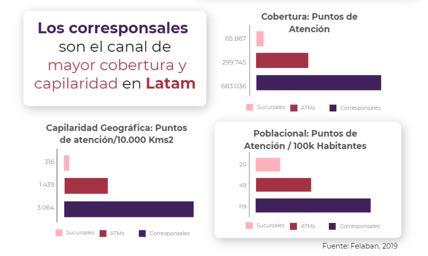








SANDRA RUBIO | 37
G2P: THE
ROLE OF SUBSIDY PAYMENTS IN THE DEVELOPMENT OF STEWARDSHIP
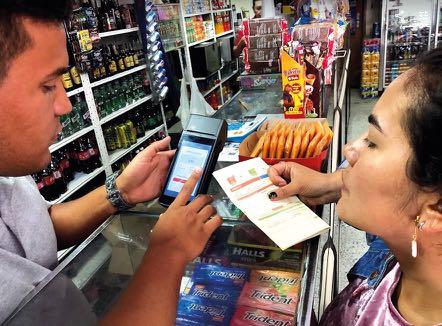
The national government’s subsidy payment strategies have been implemented by developing networks of correspondents to provide this service independently since 2014, allowing an evolution in its coverage and operational maturity that has enabled the “cash out” service of subsidies dispersed for the frst time digitally in electronic deposits (digital accounts) as of 2020.
The new strategy for dispersing Solidarity Income subsidies during the COVID emergency in Colombia resulted in almost one million new accounts in the system that year alone, exceeding account access goals by reaching 87% by the end of the year. A key enabler of this strategy was the possibility of having that efective “last mile” layer in place throughout the country, where subsidies could be withdrawn at a nearby correspondent.
Correspondent Banking in Latin America originally emerged in Brazil in 2002, and solves the problem of queuing for large billers. Those of us who were older were able to wait in the long line at the utility company to pay the monthly bill. Later this line was made at the bank branch, a service that the big banks had for their big biller clients. Correspondent banking in Latin America responds to a strategy of “CASH TRANSFER”. It is 90% cheaper for a fnancial institution to have a correspondent attend to a payment than to attend to it in a branch.
38 | FINTECH COMPANIES IN COLOMBIA ΙΙΙ
What is a banking correspondent? It is an independent third party that represents an entity (bank, cooperative, Fintech) providing fnancial services on its behalf.
“A BIG CHALLENGE FOR CORRESPONDENTS IS TO EVOLVE TOWARDS DIGITAL”.
Colombia recently passed the Digital and Mobile Correspondents Law, Decree 2022 of 2020, which simplified the operational and compliance requirements for agents to provide correspondent services.
The objective of the regulatory reforms, which also include regulatory modifications of simplifed credit and digital accounts, is for financial institutions to promote an offer of products and services with new technologies, and allows their operation without the need to have a commercial premises or store and even connection to a data network.
Still more than 80% of correspondent transactions are still collections (utilities, payments, credit and more recently e-commerce). Correspondents are still a “cash referral” mechanism.
The role of the correspondent within the ecosystems of neighborhoods, villages, rural villages is as an agent of change in the adoption of digital fnancial services. Leverage the relational and commercial potential of correspondents on the adoption of new digital fnancial services with high profitability such as microcredit, microinsurance and the opening of simplified accounts. This transition has yet to happen.
CGAP has developed a major think tank on the role of correspondent networks around the world, measuring their impact in terms of financial inclusion and poverty reduction. The Journeys to the Last Mile look at how correspondent networks (mobile money agent networks in other geographies such as Africa) are a key player in the adoption of digital fnancial services in communities.
THE CHALLENGE OF MONETIZATION
To guarantee the coverage of correspondent services in peripheral locations, it is very important to reduce the creation (CapEx) and operation (OpEX) costs of each correspondent. The reason why only large banks maintain an exclusive correspondent channel is because the creation of the network is costly as long as the operating model continues to involve devices (dataphones) and reliance on street sales forces to support the operation.
Increase revenues with new, highly profitable services for the ecosystem, such as microcredit, microinsurance and account opening. The principle is the same as the direct sales business: a third party (correspondent) develops its sales capacity to reach its natural market (its neighbors) with new services. This has been done efectively in credit models such as FinTech Afore, and MiBanco’s Soy Líder program, where independent third parties refer, recommend and originate digital credit to their neighbors.
A winning combination of cost reduction and revenue enhancement is critical to reaching rural and informal communities with new digital fnancial services. Transcending the real promise of fnancial inclusion.
Successful Digital and Mobile Correspondent models operate in Africa and Asia, where agents use a mobile application, and are ofered education, empowerment and digital assistance services.
SANDRA RUBIO | 39
BREAKING THE FRONTIER WITH TECHNOLOGY: EVOLVING THE DISTRIBUTION NETWORK.
The new ecosystems where “correspondents” enable digital credit, or microinsurance or account opening are in all kinds of places. In rural areas, for example, in the value chains where agro-inputs are purchased for planting and then where the crops are sold. Only 15% of small farmers have access to formal fnancing. In the informal sector, where cab drivers or informal vendors need money to work or to supply their businesses. Beyond the cash diversion we know as correspondent banking, it is a matter of intervening in supply chains to provide access to opportunities for the economic recovery of these people in the informal sector.
Evolving the Distribution Model for Digital Financial Services

Implementation of technological platforms with digital applications and digital identity management to improve processes of linkage, empowerment, training of new agents and monitoring of their quota and/or liquidity. Use of analytics and data for cash needs forecasting, risk mitigation and to enable more confdence with access to credit to the agent. Ensure monetization by generating alternative income from referrals and origination of new clients, diversifying the payment scheme beyond deposits and withdrawals (cash in and cash out).
Sources:
• Reporte de Inclusión Financiera 2020, Banca de las Oportunidades
• Better then Cash Alliance: Dispersión de Subsidios en Pandemia https:// www.betterthancash.org/news/learning-series-covidcolombia
• CGAP de Redes de Corresponsalía https://www.cgap.org/topics/ collections/cico-rural-agent-networks
• Estudio GSMA sobre evolución del modelo de Distribución de Servicios Financieros Digitales https://www.gsma.com/mobilefordevelopment/ wp-content/uploads/2018/07/Distribution- 2.0-The-future-
40 | FINTECH COMPANIES IN COLOMBIA ΙΙΙ
HOW TO ATTRACT
INVESTORS TO A FINTECH
CAMILO ZEA CEO - PRONUS

Although the Fintech movement has been in the world for more than a decade, the pandemic accelerated and generalized its adoption, generating investment spaces in it and also in Insurtech, Proptech, Wealthtech, Regtech.
Indeed, digitization was enhanced by the adoption of low-touch technologies and the adoption of fexible working models in response to mandatory quarantines. The crisis changed the global banking sector in several areas,
introducing a new landscape and stifing growth in some traditional product areas. Fintech also showed its power in financial inclusion and end-user satisfaction, thanks to its customercentered model.
Our country, in particular, has managed to consolidate itself as one of the main players in fnancial innovation in Latin America with more than 200 Startups at present, only surpassed by countries such as Mexico and Brazil.
CAMILO ZEA | 41
In this context, the question arises as to how to attract capital in a highly competitive environment where investment resources come from sophisticated funds, accustomed to the technological standards of the developed world. In our experience, we have been able to identify 12 basic elements that companies must internalize in order to be more attractive for investment. The order in which I present them does not necessarily defne their level of importance, but the defnition of some of the points precedes others.
1. Financial projections with a plan for the use of resources: It is important that the use of resources allows the company to grow and that the financial model internalizes the strategic growth plan, clearly projecting how the investment will be used, clearly distinguishing capex (capital investment) and opex (cost of maintaining the operation).
2. An adequate projection horizon: It is important that the time horizon of the projection is adequate. If it is too short, it is not very credible, and if it is too long, the opportunity cost increases. We often fnd models that seek to cover capex and opex in an 18-month horizon. This may be a prudent time between rounds, to minimize the wear and tear involved in fundraising, on the one hand, and on the other hand, to give space for investments to translate into tangible growth for investors in the next round.
3. Ticket Size: The size of the round matters. We often hear investment bankers saying that it is easier to get a $100 million investor than a $100,000 investor, and the reason for this is that the due diligence the investor must do in each case is equal; therefore, they prefer the largest ticket possible. Using the 18-month round, as well as a good model of capex and opex needs, points in that direction.
4. Do not neglect B2B: In terms of digital business model, unless you have very large capital available, our frm’s experience shows that B2B businesses have many advantages
over a B2C model. Among these benefts are that customer acquisition costs are lower, tickets are higher and there is a reduction in operating costs, especially in customer service. If you are looking for a B2C business but do not have capital, you can get there by looking for a B2B2C alternative, where the frst step is to reach companies and the second step is to reach consumers directly.
5. Monetization: A clear form of monetization is fundamental; after the disastrous After the failures suffered by UBER or WEWORK, to mention a few, in their capitalization rounds, investors have adopted a much more critical and skeptical position towards ethereal monetization models.
6. Data Potential: It is of utmost importance that business growth is leveraged mainly on its technological assets. Not only the capture of information but also the use of data as a tool to optimize processes, reduce costs, produce new business ideas, improve customer segmentation, among others, are aspects that investors look at with care. This point is crucial and connects with the previous point of monetization. A well-built database, rich in information, is an invaluable source of revenue generation... even if not all possible lines of business have been identifed. That is what an investor sees and values with great care when making his decision.
7. Innovation: Technology is an indispensable tool to propose an innovative business model. This generates differential comparative advantages that allow the company to lead market segments. However, it is not only technology, since it is rapidly commoditized. The business model must be solid and the technology its leverage. Technology alone does not do the magic.
8. Scalability and Business Expansion Capacity: A business model must have the capacity to grow organically in an accelerated manner in order to be sustainable in the
42 | FINTECH COMPANIES IN COLOMBIA ΙΙΙ
eyes of investors; however, such optimal scale is difcult to achieve when there is no regional scope objective. For that reason, in our experience, it is difcult to raise capital when the business scope is restricted to the local market. Thinking big and, above all, leveraging the project regionally, taking advantage of the language, cultural and economic similarities of the region, is a “must”.
9. Market understanding: Back to basics. A scalable business model must be supported by its main drivers, and these must be clearly identifed in the fnancial model. Aspects such as the economic environment, the sector, the product and the customers, modeled in depth, allow us to see the viability of the business. The scalability of the business must be supported by a target market with growth opportunities.
10. Robust Corporate Governance: Robust corporate governance strengthens decisionmaking processes by aligning stakeholder interests, generating investor confidence and, therefore, greater access to fnancing.
11. Risk Management: Adequate risk management allows mitigating negative impacts on business growth proactively. This is a key point in reducing financing costs. In our experience, only a financial model based on rigorous risk identifcation and management is sufficiently solid to present to sophisticated investors.
12. Strong regulatory and compliance frameworks: It is important that the business model is supported by regulations. This allows mitigating risks, helping the sustainability of the business. Additionally, valuation multiples of regulated digital businesses are much higher!

CAMILO ZEA | 43
CUSTOM MADE
Finally, it is important that the fnancing solution be adapted to the company’s needs. For this reason, it is necessary to identify the best forms of fnancing ofered by the market. To do this, it is necessary to:
1. Understand the behavior of the underlying asset and the processes associated with its management in order to find a 100% compatible solution to the operation. Therefore, it is necessary to estimate the size of the transaction based on the company’s fnancing needs.
2. Once the needs of the company and the characteristics of the transaction have been defned, it is necessary to design and structure a financially efficient and fully bankruptcy-remote transaction for the beneft of the stakeholders in the transaction.
3. The process of constructing the transaction documents needs to be done in a technical manner so that they reflect the financial characteristics of the transaction.
Pronus Track Record
In fntech transformation processes, we have increased the market value of our clients by up to 6 times.
Asset-Backed Securities (ABS) transactions structured by Pronus Capital, which are currently in the market, amount to ~USD 145 Mn.
We are in the process of raising ~USD 5 Mn for technology-based startups with high fntech and insurtech potential.
We are raising ~USD 200 Mn for private equity funds that we have structured.
Other Asset-Backed Securities (ABS) transactions currently in the structuring process amounting to COP 800 Mn.
44 | FINTECH COMPANIES IN COLOMBIA ΙΙΙ
MUJERES EN FINTECH


Mujeres en Fintech: A community based on inclusion, sustainability, and leadership in the Tech ecosystem.
LinkedIn: https://lnkd.in/drqVDfG
Talking about the importance of women in diferent economic contexts or gender inclusion should cease to be a fashionable topic or mention to celebrate Women’s Month because we hold “half of the sky”. They account for 3.85 billion souls out of the 7.7 billion that inhabit the Earth. If the gender gap were to disappear, between 12 and 28 trillion dollars would be added to the
world’s GDP by 2025. The sum of the wealth of the United States and China.
Taken from El País “La brecha de género sale cara”.
Hence the importance of consolidating as a community, taking into account that every day we are more women who bet on entrepreneurship, digital business, we add value to companies for our wonderful charisma and knowledge of our role, to the diferent bets and changes that the ecosystem presents in the digital divide to maximize profitability in companies and demonstrate a significant impact on reducing costs by the balance we generate.
MUJERES EN FINTECH | 45
Courtesy: Wilber Lareous
On the other hand, we consolidated to help each other and make our success stories visible, increase our recruitment, and build a network that not only has an impact not only locally but also internationally. And that is how, incredibly, a couple of years ago, in the midst of the pandemic, many of us were given the opportunity to participate in diferent initiatives, to mention a few: Start Path by Mastercard - USAID, She Is Global Forum, Capital for Women, and some of us are part of the Board of the Colombia Fintech Association.
Thus, and after identifying actions, synergies and key gender approaches for business success, in a pleasant meeting of the ecosystem convened by https://thisweekinfintech.com/ we launched our brand “Mujeres Fintech Col” and understood the relevance of continuing to add value to the construction of a model based on empowerment, increasing its visibility and Networking.
CHALLENGES:
Today, 6 out of every 100 ventures that receive investment have at least one woman in their founding team. And if we talk about Fintech, the fgures are even lower, reaching 3 out of every 100. And it is not a matter of proportionality: in Latin America alone, more than 35% of FinTech ventures are led by women. But something very special happens: companies with women in their leadership increased between 8% and 13% the return on assets; and those with 25% of women in leadership positions generate increases of 4% on cash flow returns and 8% in sales growth, not to mention that companies that meet all the variables of the PAR Ranking (Aequals) are 25% more proftable in their ROA. “For these reasons and many more, the purpose of companies like SIGMA has focused on supporting and generating value around women leaders. Contributing to the capital raising Capital For Women-led Startups, and in its two moments has achieved more than 250 enrolled and 50 classifed, who have received completely free mentoring on topics such as business model, fnance for Startups, Impact and raising investment, among others”.
María Carolina M. Sarria.
Another great challenge is fnancing, since it is the biggest and most severe obstacle. Among some of the fndings ENDEAVOR highlights the main ones in its Whitepaper: (https://www. endeavor.org.mx/ women-in-tech/)
Access to fnancing through capital investment
(equity)
Work-life balance
Access to debt fnancing
Lack of networks in the ecosystem
Lack of fnancial literacy
Access to mentoring
Being a professional in STEM areas
So, in what ways do we as FinTech women contribute to the entrepreneurial ecosystem?, How do we make the ecosystem unique?
“The diversity of approaches, thoughts and ways of seeing the world is always favorable to innovation and the generation of ideas applicable to real problems in society. Having mixed and multidisciplinary work teams increases the possibility that a product or service will be successful in the market, especially when we develop segmented concepts that in our case have a direct impact on gender, providing greater avenues for development and inclusion”.
“Women are permeating the system by our own strength, but it is necessary that men join the movement of diversity and inclusion. It has been proven that we not only generate more resources in companies and projects but also that with our power of consumption, 80% worldwide, we can change the course of humanity, the economy and make it more sustainable and lasting.”
Jessica Olivany and Pamela Hollmann Co-Founders Velara Fintech.
The 2019 report “Panorama of gender impact investing in Latin America”, Value for Women[1] points out that, although this movement has attracted the attention of investors globally, in the Latam region interest is still incipient. Through interviews with 48 investing companies that fnance businesses with social impact, they identifed the following challenges:
46 | FINTECH COMPANIES IN COLOMBIA ΙΙΙ
Data on gender and gender equality investment in the impact investing sector is scarce.
Of all venture capital and private equity funds, 6% are placed in women’s businesses and 94% in men’s businesses.
Even if they consider investing with a gender focus, organizations that wish to do so lack strategies and require advice on how to do so, especially in terms of impact measurement data.
It is recommended that the following four lenses be considered in order to design and implement products with a gender focus:
Gender-sensitive investment lenses
Women in leadership: Equality in the workplace Products and services that beneft women and girls.
The presence of women in leadership positions is critical to closing gender gaps, as it allows companies to have better policies and programs in place to promote equality and assess their diversity and inclusion.
Actions in favor of gender equality in the organization, which improve the environment and productivity, such as equal pay, coresponsibility between work and personal life, and prevention of and attention to workplace violence. Providing fnancial and human resources and the will of the C-level to implement related policies and regulations.
Analyze whether they are taken into account in the company’s mission, to understand their needs as consumers and develop markets focused on them. Appropriate communication and images.
Equality in the value chain and advocacy practices.
Generation of business opportunities for women-led businesses. Collaboration with civil society, guilds, local or global organizations and companies that work for the empowerment of women.
Source: Pro Mujer (2020). A gender lens investing scorecard helps investors and companies advance gender equality. Disponible en: https:// promujer.org/2020/08/26/gender-lens-investing-scorecard-helps-investors-companies-advance-gender-equality/ [1] Value for Women (2019). Panorama de la inversión de impacto con enfoque de género en América Latina. Disponible en: https://v4w.org/ wp-content/uploads/2019/09/Panorama-de-la-Inversion-de-Impacto-con-Enfoque-de-Genero-AL.pdf
88% OF CAPITAL RAISED DIRECTED TO COMPANIES CREATED ONLY BY. MEN
79% OF COMPANIES THAT HAVE RECEIVED FUNDING HAVE BEEN FOUNDED ONLY BY MEN.
27% OF COMPANIES WITH 50 OR MORE EMPLOYEES HAVE BEEN CREATED BY WOMEN.
(Gender conformation statistics of Latam Fintech Associations). Source: Endeavor.

25% TECHNOLOGY STARTUPS WITH ONE OR MORE WOMEN ON FOUNDING TEAM WORKFORCE WOMEN MEN
63% 86%
MUJERES EN FINTECH | 47
Colombia stands out as the leading country in female entrepreneurship with 27%.
98% OF THE CAPITAL RAISED HAS BEEN DIRECTED TO COMPANIES CREATED ONLY BY MEN.
84% OF THE COMPANIES THAT HAVE RECEIVED FINANCING HAVE BEEN FOUNDED BY MEN ONLY.
9% OF COMPANIES WITH 50 OR MORE EMPLOYEES HAVE BEEN STARTED BY WOMEN
26% TECHNOLOGY STARTUPS WITH ONE OR MORE WOMEN ON FOUNDING TEAM WORKFORCE WOMEN MEN 59% 80%
The challenge is to develop products and services with a gender focus. How can this be done? Why can it be a good business?
The change does not only consist of developing products and services with a gender focus, but also that those who develop them are women; however, here we find a first challenge since the technology sector continues to present a signifcant inequality due to the fact that, from an early age, the professional feld is dominated by men.
Although significant progress has been made in the last decade, according to MINTIC1 women between the ages of 45 and 65 are the least technologically educated; additionally, only 11 percent of women work in the ICT sector, a fgure that has been maintained and is worrying because it is a number that has not increased and women are not exploring that world, which makes it difficult for women to improve their economy since in the future all jobs will depend on technology and their linkage and insertion will favor their economic growth.
This is because, according to research by the consulting firm ATK earney, companies led by women generate more economic benefts, even if they receive less funding 2
The International Labor Organization (ILO) and the European Commission indicate that the GDP growth of different countries would
1 htps://www.mintc.gov.co/portal/inicio/Sala-de-Prensa/MinTIC
2 https://repositorio.cepal.org/

97% OF THE CAPITAL RAISED HAS BEEN DIRECTED TO COMPANIES CREATED ONLY BY MEN.
76% OF THE COMPANIES THAT HAVE RECEIVED FINANCING HAVE BEEN FOUNDED BY MEN ONLY.
22% OF COMPANIES WITH 50 OR MORE EMPLOYEES HAVE BEEN STARTED BY WOMEN
20% TECHNOLOGY STARTUPS WITH ONE OR MORE WOMEN ON FOUNDING TEAM WORKFORCE WOMEN MEN
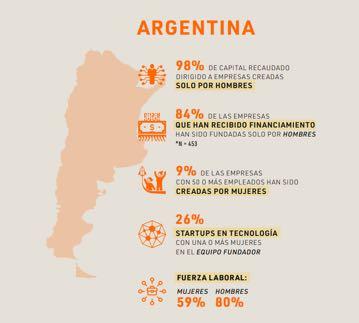
48% 82%
beneft enormously if they contribute to reduce the gender gap, promoting the approchement between women and technology 3 , but the leadership of women in banking and fnance is also needed, as strategists in the purchase of securities or compliance professionals at middle and managerial levels.
Now, FinTech solutions are shaping the fnancial services industry through 4.0 technologies, such as artificial intelligence and blockchain, which have helped venture capital investment and drive its transformation, which implies perseverance, flexibility and innovation capacity, and in this sense, women have a lot to contribute.
The focus should be given from the data, its analysis and interpretation, to take advantage of them in the best way, focusing on discovering how digitization contributes to the fnancial sector, what contributions from artifcial intelligence (AI), data analytics, machine learning and blockchain can help improve fnancial services and increase the ability to generate revenue and profts and how the study of such information can be used to address problems of information and data analysis in the fnancial services industry; “this is how a more diverse, inclusive and competitive digital economy will open new opportunities for every woman to develop her potential, become skilled in new technologies and, in this way, transform the future not only of Colombia but of Latin America”
Liliana
3 htps://revistadigital.inesem.es/
Pantoja - LUMON.
48 | FINTECH COMPANIES IN COLOMBIA ΙΙΙ
TO CONCLUDE:
What we never imagined was to find in our community, in addition to a personal and entrepreneurial process, a radical change in the understanding of the power of women’s support networks for professional growth and entrepreneurship, and how women have the great ability to inspire others with what we do. These are bonds that have climbed into the emotional depths of each of us, reinforcing our levels of confdence, empowerment, credibility, understanding, acceptance and even self-love. “Understanding our realities as women, who face every day a combined multitasking between diverse activities and family lives, in which sometimes we feel incapable, overwhelmed and insecure, knowing that it is “normal” and that it is not a situation alien to all women, has helped us to internalize and learn from the fragile, how strong, capable and powerful we can become, and that when we have down moments, we have a team to come back to feel recharged again.”
Alexandra
Mendoza – Liquitech
Today we understand that a good trajectory and the preparation of each one is a fundamental part for the growth and role of a woman in any organization or enterprise. “Women’s leadership implies “people skills”, maintaining a good presence, having charisma, good initiatives, team building and carrying out projects that generate inspiration. No matter what the economic sector, as long as we have the doors open to add value, be heard, develop projects or programs that add value to society and even through which we can achieve economic and social impact.
Carolina Vélez - Finsocial -NetCare Life
Being an entrepreneur is difficult. Being an entrepreneur is much more difcult. The road is easier when we travel it as a team. Women’s networks are a great asset for networking, support, knowledge and practical tools.

By building our community, we are developing our skills and strengthening our ability to scale and take our businesses to another level.
Sandra Rubio – Imix
Evidencing the multiplying power of this first small group of women and the positive efects it has begun to generate in other new women who have joined the network, confirms the importance of thinking about the more than 690 women and more who, for whatever reason, have not been selected for some programs, or who are simply out there alone trying to start their own businesses.
In how we can, through a formal group, provide support, leadership, inspiration and referral for all of them and how we can, together, consolidate the most important empowerment network in the country, in a sector that is becoming increasingly important in investment and new businesses: the FinTech industry.
Through FMEF we seek to create synergies with different private and governmental entities to strengthen entrepreneurship and female empowerment, which can provide more and better tools to women who are already in the industry and need support in key aspects to continue growing their businesses, or who are starting their projects and need support to develop them successfully.
MUJERES FINTECH COLOMBIA
LinkedIn: https://lnkd.in/drqVDfG
MUJERES EN FINTECH | 49
LEGAL ASPECTS
OF FINTECH INVESTMENT IN COLOMBIA ALEXANDRA BAQUERO NEIRA SIGMA PARTNER

As technology advances, the options for doing Fintech business also increase and so does the appetite of investors to invest in this type of business.
The speed with which technological innovation has evolved in the provision of fnancial services in Colombia is undeniable. As of 2019, according to the Finnovista report, there were more than 700 fintech ventures in Latin America, and, according to the Colombia Fintech report(note) Colombia is the country with the third largest number of fintechs in the region. From 180 companies with this business in 2019, we grew to 322 by January 2022.
Likewise, the appetite for investment in the Fintech business has also increased exponentially; in fact, investment in 2021 in this sector reached US$93 billion, which represents 90% of all investments in 2020. The reason is summarized by Carlos P partner of The Boston Consulting Group: “Many startups have developed solutions to meet demands by traditional companies. Innovative business models, high speed of response and the ability to ofer a simple and dazzling experience are key factors that have enabled the development of successful fntechs“1
At the same time, traditional fnancial entities have implemented varied strategies to “get on the bus” of transformation in the provision of their services; 90% of the banking entities in Colombia have undertaken alliances with fntechs, 70% have outsourced services to these ventures and 60% have implemented digital laboratories to boost innovation organically (ANIF, 2018). According to a study by ANIF.
Given this panorama of growth in the appetite for investment in the Fintech sector, I will mention some legal aspects that must be taken into account, both by “ Founders “ and investors.
Let’s start at the beginning: From a legal point of view, there are several aspects that are important for the Venture Capital sector in order to obtain investment.
The frst thing to remember is that the provision of a service through a fntech is not a “para service”, or an unregulated service. On the contrary, the financial activity is of public interest, originated by the State and provided by individuals through the fgure of the assignment or authorization, which is materialized through the operating permit issued by the Superintendence of Finance (Article 335 of the Political Constitution).
50 | FINTECH COMPANIES IN COLOMBIA ΙΙΙ
1 En: “Estado de Fintech Q3. BOSTON CONSULTING GROUP. Press Releases, Nov 17, 2021. www.bcg.com.
Both the penal norms and those regulating the fnancial activity (Decree 1981 of 1988), among others, establish the meaning of “massive or habitual capture”.
It is understood that a natural or juridical person captures money from the public in a massive and habitual manner in any of the following cases:
“1. When its liabilities to the public are composed of obligations with more than twenty (20) persons or more than ffty (50) obligations, in either case contracted directly or through an intermediary person.
“Liabilities to the public are understood to be the amount of the obligations contracted for having received money by way of a loan or any other in which the provision of goods or services is not foreseen as consideration.
“2. When, jointly or separately, he has entered into in a period of three (3) consecutive months more than twenty (20) mandate contracts for the purpose of managing money of his principals under the modality of free administration or to invest them in securities at the discretion of the mandatary, or has sold credit or investment securities with the obligation for the purchaser to transfer to him the ownership of securities of the same kind, at sight or within an agreed term, and against reimbursement of a price.
“In order to determine the three (3) month period referred to in the preceding paragraph, the date corresponding to any of the mandate contracts or sales transactions may be taken as the initial date.
“Paragraph 1.
In any of the aforementioned cases, one of the following conditions must also be met:
“a) That the total value of the monies received for the set of the indicated operations exceeds 50% of the net worth of that person; or
“B) That the respective operations have been the result of having made public or private oferings to unnamed persons, or of having used any other system with identical or similar efects.
In conclusion: It must be reviewed whether the activity developed by the respective fintech constitutes massive capture, that is, through the receipt of money from twenty or more persons with obligations that imply the return of the money without a good or service as a counter beneft, or, regardless of the number of persons, the performance of ffty or more obligations of the same nature.
Article 316 of the Criminal Code - Law 599 of 2000 - reaffirms this concept of mass solicitation.
CORPORATE STRUCTURE.
Secondly, the investor must verify both the corporate structure and the business model of the fintech before making the investment, especially if it is an “equity” investment. This is because, although the most common corporate form used by entrepreneurs in Colombia, due to the advantages ofered by this type of company, is the simplifed corporation SAS, those entities that provide financial services authorized to raise funds from the public under the terms mentioned above, must be incorporated as corporations.
RIGHT OF FIRST REFUSAL.
Bylaws and application of the general rules of the Commercial Code. Pre-emptive rights. In Colombia there are two ways to participate in equity in a company:
Through the alienation of the existing shareholding or through the subscription of issued shares that are in reserve or the issuance of new shares. In the event that the aforementioned rules do not apply, it is necessary to review the establishment of the preemptive right in the bylaws.
If the law is enshrined in the bylaws, the provisions of the same shall prevail and shall be applied. If it has not been mentioned, a reference must be made to the commercial rules that regulate this company, which means that in
ALEXANDRA BAQUERO | 51
the absence of the right enshrined in the bylaws, it does not mean that it should not be complied with, and therefore the ofer of the shareholding must be processed with the existing partners. In a corporation, the partners have the right of frst refusal to purchase, that is to say, the partner who is going to sell must notify the existing partners of his intention to sell and the partners who have a shareholding will have preference for the acquisition, according to their shareholding.
INVESTMENT OPERATIONS THROUGH CRYPTOASSETS
What is the regulation of cryptocurrencies in Colombia?
In Colombia the authorities have been cautious in issuing regulations for cryptocurrencies. The reason is related not only to the difculty of their control, especially in relation to money laundering and terrorist financing issues, but also to the fact that since they are excessively speculative assets, they lack protection by the State. This has been stated by the Financial Superintendency.
In Colombia, Banco de la República, which is the regulatory authority of the foreign exchange market, has been emphatic in indicating that crypto-assets do not have the status of foreign exchange, since they do not have the backing or participation of central banks, and therefore are not subject to foreign exchange regulation.
In addition, the Financial Superintendency has emphasized that cryptoassets do not constitute a valid investment for supervised entities and their operators are not authorized to advise and/or manage operations with such currencies. there are pronouncements by the aforementioned authorities, associated with the management of cryptocurrencies. Since they do not have the characteristic of being currencies, banks cannot carry out operations with them, as they do with foreign currencies.
On the other hand, in a concept of the Financial Superintendence of November 18, 2021, it
was established that in spite of having similar characteristics, the “equity tokens” as well as other financial instruments, cannot be considered as securities and in order to grant them such treatment it is necessary their recognition by the National Government.
However, in 2021, the Superintendence of Corporations modifed its doctrine, recognizing the use of cryptoassets as a way of injecting capital into a company, provided that this fact is widely disclosed, they are recognized as inventories, intangible or immaterial, the Colombian regulations on contribution in kind (articles 122 and following of the Commercial Code) are complied with, and the partners approve the appraisal of the same, from which moment they are jointly and severally liable for the value attributed to them.
Given the enormous interest and the increase in its use worldwide, the process of regulating sandboxes began in 2020, initially with pilot tests through which financial institutions can carry out cash-in (deposit) and cash-out (withdrawal) operations in financial deposit products on behalf of cryptoasset platforms.
The startup environment is growing every day and is nourished more and more by international experiences where acquisition operations are carried out through cryptocurrencies. At the same time, the interest of investors in carrying out transactions using cryptocurrencies has grown enormously.
However, as mentioned above, Colombia has not opened the option for the capital stock of companies to be represented in tokens, i.e., equity tokens, as is the case in other legislations.
In conclusion, for purposes of its realization in Colombia, although some cryptocurrencies or other fnancial instruments that are very suitable for the realization of investments by Venture Capital investors, may meet the characteristic of securities, it is required a government regulation that recognizes it.
To date, cryptocurrencies can be used from Colombia with accounts in other countries, being clear that the support and suitability of
52 | FINTECH COMPANIES IN COLOMBIA ΙΙΙ
the platforms are not monitored by the Financial Superintendency.
In other legislations, operations of conversion of equity to “equity tokens” have been carried out or the so-called “utility tokens” are used.
Crowdfunding or crowdfunding modalities
As previously mentioned, crowdfunding structures can be interesting for Venture Capital, insofar as they allow investments to be made in an agile and simple manner.
However, we must take into account several aspects. The first one is that Crowdfunding implies the exercise of a fnancial activity, and must be authorized by the Superintendence of Finance, as established by Decree 1357 of 2008, which recognized the existence of the figure, but in a somewhat “timid” way initially, seeking the protection of users who access them and which, in a high percentage, lack the financial information required for the purpose of investing their resources in them.
Executive Order1235 of 2020 increased the maximum funding ceilings allowing operations to increase .
The investor who wishes to fnance a crowdfunding platform incorporated in Colombia, must then check that the company is incorporated as required by the aforementioned rules, as Collaborative Financing Companies, otherwise, the financing activity can only be carried out through the Stock Exchanges authorized for such purpose.
There has also been a proliferation of institutions that carry out crowdfunding through an associative, non-proft organization and that are fnanced through a donation scheme.
This scheme is not within the scope of application of Decree 1357, additionally, this figure is not susceptible to receive Venture Capital investment, since it lacks a structure that allows the VC to hold a stake in the institution, as it would through a shareholding in a company, or through the possibility of negotiating the right to be a shareholder in the future (For example, through a SAFE, an instrument that allows the investor to become a shareholder of the respective startup, in a certain percentage in the SAFE, depending on the valuation of the startup, in the next round, with a discount on the same) that will allow an exponential growth of its investment to subsequently proceed to make an “exit”.

ALEXANDRA BAQUERO | 53
ININVESTORS WITH A FINTECH FOCUS SILVIA FLÓREZ ENDEAVOR
In order to accompany and train entrepreneurs in one of the most important moments of the growth process of their companies, Endeavor decided to join forces with several ecosystem players such as Banco de Bogotá, MatrixConsulting, Gómez Pinzón, Fundación Santo Domingo and A2censo, to develop the Capital Map, the frst guide in Colombia that offers concepts, tools
and best practices to all entrepreneurs in the country according to their stage, including: angel investment, seed capital, series A and B, private equity and other alternatives that go through expert banking and Fintech.
We also identified that these entrepreneurs have to do a long research to find investors
Endeavor Colombia - Capital Map / Investors with a focus on Fintech Companies
1984 VC Venture Capital Semilla
Logistics, Digital Health, Enterprise Software, Fintech, Ecommerce
8VC Venture Capital Semilla Servicios Financieros; TICs
Accel Venture Capital Semilla; Serie A; Serie B; GE Servicios Financieros
Accion Venture Lab Impacto Semilla Emprendimiento Social; Servicios Financieros; Salud; Agricultura
Acrew Capital Venture Capital Pre-Semilla; Semilla; Serie A Servicios Financieros; Workplace; TICs
Adobe Capital Impacto Semilla; Serie A TICs; Servicios Financieros; Educación; Salud
Advent Private Equity GE Servicios Financieros, Salud, Consumo, Tecnologia, Infraestructura, Energía
Agrega Partners Venture Capital Serie A; Serie B Cybersecurity, SaaS, Fintech.
Alexia Ventures Venture Capital Semilla; Serie A
AlleyCorp Incubadora; Venture Capital
SAAS, Healthcare, Fintech, Commerce Retail & Tech., Food & Agtech, Education, HR Tech
Pre-Semilla; Semilla; Serie A Servicios Financieros; Incubators
ALLVP Venture Capital Semilla; Serie A; Serie B Consumo; Servicios Financieros; Smart Cities; Logistica; Bienes Raiz; Movilidad; Educación; Salud; Workplace
Amador Holdings Venture Capital Semilla: Serie A Servicios Financieros
Andreessen Horowitz Venture Capital Serie A; Serie B Agnóstico
Angel Ventures Venture Capital
Pre-Semilla, Semilla TICs; Servicios Financieros; Alimentos & Bebidas; Agnóstico
Arrebol Capital Venture Capital Semilla; Serie A Servicios Financieros; Logistica; Agnóstico
Bancolombia Ventures Venture Capital
Pre-Semilla; Semilla; Serie A; Serie B; GE Servicios Financieros; TICs; Movilidad; Agricultura
BID Lab Venture Capital; Venture Debt Semilla; Serie A; Serie B; Fintech
Bridge Partners Venture Capital
Burch Creative Capital Venture Capital
Pre-Semilla; Semilla Servicios Financieros; Bienes raiz
Pre-semilla; Semilla; Serie A; Serie B; GE Servicios Financieros
Canary Venture Capital Semilla; Serie A Servicios Financieros; Marketplace
Capital Invent Venture Capital Semilla; Serie A Educación; Servicios Financieros; TICs
Carao Ventures Venture Capital Semilla; Serie A Agnóstico; Salud; Fintech; Bienes Raiz; Consumo; Biotechnology; Consumo; TICs; Educación; Logistica; Movilidad
54 | FINTECH COMPANIES IN COLOMBIA ΙΙΙ
NAME TYPE STAGE SECTOR
500 Startups Aceleradora Semilla Servicios Financieros
Proptech,
who might be interested in investing in their ventures, so the Capital Map ofers a mapping of more than 400 national and international funds in early and mature stage, with a description of their investment thesis that allows them to flter and compare, according to stage, investor profile, sector(s) of interest, geography and some companies that make up their portfolio.
Thinking about the beneft of this tool and how to extrapolate it to Fintech companies in the ecosystem, we decided to limit this mapping to 105 national and international funds that actively invest or have expressed interest in investing in Fintech companies and/or companies that ofer fnancial services in Latin America.
HEADQUARTERS WEBSITE OPERATION
Estados Unidos Internacionales
Estados Unidos https://500.co/ Internacionales
Estados Unidos https://8vc.com/ Internacionales
Estados Unidos https://accel.com/ Internacionales
Estados Unidos https://www.accion.org/ Internacionales
Estados Unidos
https://acrewcapital.com/ Internacionales
Mexico https://adobecapital.org/ Internacionales
Global https://www.adventinternational.com Nacional /global-reach/colombia/ Republica Dominicana https://agregapartners.com/ Internacionales
Brasil www.alexia.vc/ Internacionales
Estados Unidos
https://alleycorp.com/ Internacionales
Mexico https://www.allvp.vc/ Internacionales
Panamá http://www.amador.holdings/index.html Internacionales
Estados Unidos https://a16z.com/ Internacionales
Colombia, Mexico, Peru http://www.angelventures.vc/ Nacional
Colombia https://arrebolcap.com/ Nacional
Colombia https://www.grupobancolombia.com/personas Nacional
Estados Unidos https://bidlab.org/es/nosotros Internacionales
México https://www.bridgepartners.biz/ Internacionales
Estados Unidos https://www.burchcreativecapital.com/ Internacionales
Brasil https://canary.com.br/ Internacionales
México https://capitalinvent.com/ Internacionales
Costa Rica http://www.caraov.com/ Internacionales
GE: Growth Equity
SILVIA FLÓREZ | 55
Clocktower Technology Ventures Venture Capital
Pre-semilla; Semilla; Serie A; Serie B; GE Servicios Financieros
Clout Capital Venture Capital Semilla; Serie A Servicios Financieros; TICs; Workplace; Bienes raiz; Educación; Logistica
Collaborative Fund Venture Capital
Colle Capital Partners Venture Capital
Pre-semilla; Semilla; Serie A; Serie B; GE Servicios Financieros
Pre-semilla; Semilla; Serie A; Serie B; GE Blockchain; Servicios Financieros; Salud; Logistica; Marketplace; Salud; TICs
Cometa Venture Capital Semilla; Serie A; Serie B Consumo; Educación; TICs; Servicios Financieros; Marketplace
D1 Capital Partners Growh Equity Serie C; GE
Dalus Capital Venture Capital Semilla; Serie A; Serie B
DGF Investimentos Venture Capital Semilla; Serie A; Serie B
DILA Capital Venture Capital Serie A
Consumer Internet, Fintech, Enterprise Software, Marketplaces, Healthcare
Inclusion (fntech, edtech, healthtech, HRtech), Climate Innovation Business Productivity, Digital Consumer
TICs; Marketplace; Enterprise Software; Fintech
Servicios Financieros; Emprendimiento Social
DST Global Venture Capital GE Servicios Financieros; TICs
Elevar Equity Venture Capital Semilla; Serie A; Serie B Servicios Financieros; Educación
EWA Capital Venture Capital Semilla; Serie A Educación; Salud; Servicios Financieros; Agricultura; Consumo; Logistica
FCP Innovación Corporate Venture Capital Serie A; Serie B; GE Energia; TICs; Servicios Financieros
FinTech Collective Venture Capital Semilla; Serie A Servicios Financieros
FJ Labs Venture Capital Semilla; Serie A; Serie B; GE Consumo; Servicios Financieros; Marketplace; Movilidad
Floodgate Venture Capital Semilla; Serie A; Serie B; GE Servicios Financieros
Flourish Ventures Venture Capital Serie A; Serie B Servicios Financieros
Foundation Capital Venture Capital Semilla; Serie A; Serie B; GE Servicios Financieros
FundersClub Venture Capital Semilla; Serie A; Serie B Servicios Financieros; Marketplace
General Atlantic Venture Capital Serie B; GE Servicios Financieros; Consumo; Salud
Global Founders Capital Venture Capital Semilla; Serie A
TICs, Consumo; Servicios Financieros; Marketplace; Movilidad; Bienes Raiz
Goldman Sachs Growh Equity Serie A; Serie B Fintech; Consumer; Salud
Green Visor Capital Venture Capital Semilla; Serie A; Serie B; GE
Servicios Financieros Greyhound Capital Venture Capital GE
H20 Capital Innovation Venture Capital Semilla; Serie A
Homebrew Venture Capital Semilla; Serie A; Serie B
IDB Invest Inversionista Multilateral Serie B; GE
Servicios Financieros; TICs
Servicios Financieros
Servicios Financieros, Salud, Agricultura
IFC Venture Capital Group Venture Capital Semilla; Serie A; Serie B; GE Servicios Financieros
IGNIA Partners Venture Capital Semilla; Serie A; Serie B; GE
Servicios Financieros; Consumo; TICs; Marketplace; Salud; Educacion
Impulsum Ventures Venture Capital Pre-Semilla; Semilla; Serie A TICs; Servicios Financieros; Agricultura
INCA Ventures Venture Capital Semilla
INCOFIN Impacto GE
InQlab Venture Capital Semilla; Serie A; Serie B
Inspired Capital Partners Venture Capital Semilla; Serie A; Serie B; GE
Iwana Ventures Venture Capital Serie A
Servicios Financieros
Servicios Financieros, Agricultura
TICs; Agnóstico
Servicios Financieros
TICs; Agnóstico
K50 Ventures Venture Capital Pre-semilla; Semilla Salud; Educación; Bienes Raiz; Servicios Financieros
Kandeo Private Equity Serie B; GE Servicios Financieros, Agricultura
56 | FINTECH COMPANIES IN COLOMBIA ΙΙΙ
Servicios Financieros
Agnostico
H.I.G Capital Private Equity GE
Estados Unidos
https://www.clocktowerventures.com/ Internacionales
Miami, Florida https://cloutcapital.com/ Internacionales (Estados Unidos)
Estados Unidos
https://www.collaborativefund.com/ Internacionales
Estados Unidos https://colle.vc/ Internacionales
Mexico
https://cometa.vc/#id=m47gkc&p=cometa Internacionales
Estados Unidos Internacionales
Mexico
www.daluscapital.com
Internacionales
Brasil http://www.dgf.com.br/ Internacionales
Mexico https://www.dilacapital.com/ Internacionales
Hong Kong https://dst-global.com/ Internacionales
Mexico https://elevarequity.com/ Internacionales
Colombia http://ewa.capital/ Nacional
Colombia
http://www.fcp-innovacion.com/ Nacional
Estados Unidos https://www.fntech.io/
Internacionales
Estados Unidos https://fjlabs.com/ Internacionales
Estados Unidos https://foodgate.com/
Estados Unidos https://fourishventures.com/
Internacionales
Internacionales
Estados Unidos https://foundationcapital.com/ Internacionales
Estados Unidos https://fundersclub.com/
México https://www.generalatlantic.com
Internacionales
Internacionales
Estados Unidos; https://www.globalfounderscapital.com/ Internacionales
Reino Unido; Alemania
Estados Unidos
https://www.goldmansachs.com/what-we-do
Internacionales /asset-management/gs-growth/
Estados Unidos http://greenvisorcapital.com/
Internacionales
Reino Unido https://greyhoundcapital.com/ Internacionales
Colombia, Brasil, https://www.higcapital.com/ Nacional
Estados Unidos
Estados Unidos
https://www.h20capital.com/ Internacionales
Estados Unidos https://homebrew.co/ Internacionales
Estados Unidos https://www.idbinvest.org/es Internacionales
Estados Unidos https://www.ifc.org/wps/wcm/connect Internacionales /Topics_Ext_Content/IFC_External_Corporate_ Site/Venture+Capital
Mexico
Colombia
http://www.ignia.mx/ Internacionales
https://www.crunchbase.com/ Nacional organization/impulsum-ventures
Perú https://www.pecap.pe/inca-ventures Internacionales
Colombia, Belgica https://incofn.com/ Nacional
Colombia http://www.inqlab.co/ Nacional
Estados Unidos https://inspiredcapital.com/ Internacionales
Colombia http://www.iwana.vc/ Nacional
Estados Unidos https://www.k50ventures.com/ Internacionales
Colombia, Mexico, https://kandeofund.com/ Nacional
Peru, Estados Unidos
SILVIA FLÓREZ | 57
Kaszek Ventures Venture Capital Semilla; Serie A; Serie B
Educación; Servicios Financieros; Salud; Logistica; Marketplace; Bienes Raiz; TICs
Lcatterton Growh Equity Serie A; Serie B; Serie C Salud, Fintech, Commerce, Consumer, Educacion
Magma Partners Venture Capital
Pre-Semilla; Semilla; Serie A Agnóstico; Servicios Financieros; TICs; Consumo
Marathon Ventures Venture Capital Semilla
Servicios Financieros; Bienes Raiz; Logistica; Alimentos & Bebidas; Agricultura
MatterScale Ventures Venture Capital Semilla; Serie A Empleabilidad; Salud; Educación; Servicios Financieros
MAYA Capital Venture Capital Semilla; Serie A
Mercantil Colpatria Venture Capital Serie A
Monashees Venture Capital Semilla; Serie A; Serie B
New Enterprise Associates (NEA) Venture Capital Serie A; Serie B; Serie C
Newtopia VC Venture Capital
Pre Semilla; Semilla
NFX Venture Capital Semilla; Serie A
NXTP Ventures Venture Capital Semilla; Serie A; Serie B
Servicios Financieros; Marketplace
Agnóstico
Agnostico
Fintech, Enterprise SaaS, Consumer
Agnostico
Servicios Financieros
TICs; Servicios Financieros; Logistica
Omega Venture Partners Venture Capital Semilla; Serie A; Serie B; GE Servicios Financieros
Omidyar Network Impacto Semilla; Serie A; Serie B; GE TICs; Servicios Financieros
Palm Drive Capital Venture Capital
Paramo Venture Capital
Pre-semilla; Semilla; Serie A Servicios Financieros; Consumo; TICs; Consumo; Salud
Pre Semilla
Pioneer Fund Venture Capital Semilla
Fintech, Healthcare, Edtech, Ecommerce, Logistics
Servicios Financieros
Plug and Play Tech Center Venture Capital Pre-Semilla; Semilla Agnóstico
Point72 Ventures Venture Capital Serie A; Serie B
Prosus (formerly Naspers) Venture Capital Serie A; Serie B; GE
QED Investors Venture Capital Serie A; Serie B
Quona Capital Venture Capital Serie A; Serie B
Servicios Financieros
Food, Fintech, Marketplaces, EdTech
Servicios Financieros; TICs
Emprendimiento Social; Servicios Financieros; Salud; Agricultura
S2 Capital Venture Capital Semilla; Serie A Servicios Financieros
Salesforce Ventures Venture Capital Serie A; Serie B; GE Enterprise Software, SAAS, Fintech, Edtech, Data, Mkt & Media
Salkantay Ventures Venture Capital Semilla: Serie A
Foodtech, Edtech, Jobtech, Prptech, Fintech, Saas.
Broad tech, with preference in Fintech, Edtech, Latam Innovation Health, Mobility, and Foodtech
Seaya Cathay Venture Capital Serie A; Serie B
Sequoia Capital Venture Capital Semilla; Serie A; Serie B; GE Emprendimiento Social; Servicios Financieros; Salud; Agricultura
Simma Capital Venture Capital Semilla; Serie A
SoftBank Vision Fund Venture Capital Serie B; GE
Salud ;Servicios Financieros ; Educación ; Logistica; Servicios Financieros; Logistica; TICs
Servicios Financieros
Servicios Financieros Southern Cross Group Private Equity GE Agnostico
Soma Capital Venture Capital Semilla
Tencent Corporate Venture Capital GE
Estados Unidos
Servicios Financieros
The Ark Fund Venture Capital Semilla Servicios Financieros; Consumo; Salud; Educación; TICs Tinello Capital Family Ofce Semilla; Serie A Servicios Financieros; Media; Educación; Logistica; Alimentos & Bebidas
TPG Growth Venture Capital GE Servicios Financieros; Consumo; TICs; Impacto Social
Valor Capital Group Venture Capital Serie A; Serie B; GE Servicios Financieros; Educación; Logistica; TICs
Victory Park Capital Private Equity GE Servicios Financieros
Village Capital Aceleradora Pre-Semilla Servicios Financieros
Village Global Venture Capital Semilla; Serie A; Serie B Servicios Financieros; Workplace Vostok Emerging Finance Venture Capital Serie A; Serie B Servicios Financieros
Wollef Venture Capital Semilla; Serie A; Serie B TICs; Servicios Financieros; Marketplace; TICs; Smart Cities
XFactor Ventures Venture Capital Semilla Servicios Financieros
XG Ventures Venture Capital Semilla; Serie A; Serie B Servicios Financieros
Z-Tech Corporate Venture Capital Semilla; Serie A Servicios Financieros; TICs; Logistica
Fuente: Mapa de Capital Endeavor
58 | FINTECH COMPANIES IN COLOMBIA ΙΙΙ
Brasil; México; Argentina
Estados Unidos
https://kaszek.com/ Internacionales
https://www.lcatterton.com/ Internacionales
Chile; Colombia; México https://www.magmapartners.com/ Nacional
Colombia https://www.linkedin.com/ Nacional company/marathon-lab/about/
Colombia; Estados Unidos, México https://www.matterscale.com/ Nacional
Brasil https://www.maya.capital/ Internacionales
Colombia https://mercantilcolpatria.com/ Nacional
Brasil https://monashees.com.br/en/ Internacionales
Estados Unidos https://www.nea.com/ Internacionales
Latam https://newtopia.vc Internacionales
Estados Unidos https://www.nfx.com/ Internacionales
Argentina https://nxtp.vc/ Internacionales
Estados Unidos https://www.omegavp.com/ Internacionales
Estados Unidos https://omidyar.com/ Internacionales
Estados Unidos https://palmdrive.vc/ Internacionales
Latam Internacionales
Estados Unidos
https://www.pioneerfund.vc/ Internacionales
Estados Unidos https://www.plugandplaytechcenter.com/ Internacionales
Estados Unidos https://p72.vc/ Internacionales
Mexico https://www.prosus.com/ Internacionales
Estados Unidos https://qedinvestors.com/ Internacionales
Estados Unidos https://quona.com/ Internacionales
Estados Unidos
https://www.s2cp.com/ Internacionales
Estados Unidos https://www.salesforce.com/company/ventures/ Internacionales
Perú https://salkantay.vc/portafolio/ Internacionales España https://seayaventures.com/ Internacionales
Estados Unidos
https://www.sequoiacap.com/ Internacionales
Colombia https://www.simmacapital.com/ Nacional
Reino Unido
https://visionfund.com/ Internacionales
Estados Unidos https://www.somacap.com/ Internacionales
Colombia, Argentina, Brasil, https://www.southerncrossgroup.com Nacional Chile, Mexico, Uruguay, /ofces/colombia
Estados Unidos
https://www.tencent.com/en-us/about.html Internacionales
Mexico https://www.arkfund.co/ Internacionales
Colombia Nacional
Estados Unidos
https://www.tpg.com/platforms/tpggrowth Internacionales
Brasil http://www.valorcapitalgroup.com Internacionales
Estados Unidos
https://www.victoryparkcapital.com/ Internacionales
México https://vilcap.com/about-us/regions/latin-america Internacionales
Estados Unidos https://www.villageglobal.vc/ Internacionales
Estados Unidos https://www.vostokemergingfnance.com/ Internacionales
Mexico https://jaguarvc.com/ Internacionales
Estados Unidos
https://www.xfactor.ventures/ Internacionales
Estados Unidos http://www.xg-ventures.com/ Internacionales
México https://ztech.net/es/ Internacionales
SILVIA FLÓREZ | 59
FINTECH FIGURES IN COLOMBIA
The number of Fintechs has been growing solidly the last 20 years: we have reached 299 companies by December 2021, an average growth of 16% per year over the last two decades.
The growth rate peaked in 2018, with 40 companies registered in the same year, and then stabilized.
On average, the growth of new startups is 16% over the last two decades, with approximately 14 new initiatives each year, on average.
EVOLUCIÓN DEL
Gráfca 1 slide 8
DISTRIBUTION BY SEGMENT
Digital Credit is the most representative vertical of the ecosystem, with almost a third of the companies.
It is followed by the Digital Payments segment with 26.42% and Enterprise Finance with 10.37% share.
Significant growth is observed in the number of companies in Crypto & Blockchain and PMF & WealthTech, reflecting the uptake of our technologies and the appetite for new ways to invest and save.
Crowdfunding, Insurtech and Neobanks segments are growing due to new regulatory developments and digital-focused business models.
Gráfca 2, slide 9
Fintech ecosystem revenues reflect robust sector growth: From 2017 to 2021, real ecosystem revenues grew by an average of 27% annually.
Adjusting for infation, the ecosystem achieved a record 3.7 trillion pesos in 2021, representing 0.31% of Colombia’s GDP in 2021.
Gráfca 3, slide 10
The Digital Payments segment leads in the ecosystem with actual revenues of P2.29 trillion in 2021, followed by Digital Credit with P940 billion in 2021.
60 | FINTECH COMPANIES IN COLOMBIA ΙΙΙ
COLOMBIA FINTECH FINTECH 299 0 50 100 150 200 250 300 350 0 5 10 15 20 25 30 35 40 45 2001 2002 2003 2004 2005 2006 2007 2008 2009 2010 2011 2012 2013 2014 2015 2016 2017 2018 2019 2020 2021 Stock Fintech Nuevas Fintechs EVOLUCIÓN DEL ECOSISTEMA 2021 1 46 1 93 2 13 2 64 3 70 2017 2018 2019 2020 2021 Valores en illones de pesos de 1 FINTECH EVOLUCIÓN DE LOS IN RESOS EVOLUCIÓN DE LOS INGRESOS* INFORME ECONÓMICO COLOMBIA FINTECH 23 38 17 5 11 0 3 2 2 33 26 10 8 9 4 4 3 1 0 5 10 15 20 25 30 35 40 rédito igital agos igitalesFinanzasEmpresarialesF ealthtech egtech rpto lockchain ro dfunding nsurtech Neobancos 2010 2021 istribución por Segmentos DISTRIBUCIÓN OR SE MENTOS Crédito representati a un Le con con Se en lo nuestras nuevas Los nsurtech creciendo
DISTRIBUCIÓN POR SEGMENTOS
regulatorios enfocados
ECOSISTEMA
CREATING THE FINANCIALAND TECHNOLOGY FUTURE OF COLOMBIA

We are the Fintech companies association of Colombia

The growth rate in total ecosystem revenues in 2021 grew by 74% compared to 2019. The segments that grew the most were Neobanks, Crypto&Blockchain and PFM & Wealthtech.
INFORME ECONÓMICO COLOMBIA
The growth in the number of employees was driven primarily by the three largest segments of the ecosystem, digital credit, digital payments and enterprise finance. The latter had the largest increase in the entire sector, with 947 new employees joining the corporate finance segment in 2021.
INFORME ECONÓMICO COLOMBIA FINTECH
E oluci n del empleo por se mento
EVOLUCIÓN DEL EMPLEO POR SEGMENTO
EVOLUCIÓN DE LOS INGRESOS POR VERTICALES*
EVOLUCIÓN DE LOS IN RESOS OR VERTICALES
The Fintechs interviewed in the Fintech Radar state that their main target client segments are large companies (28%) and the unbanked (28%). This result evidences the commitment of the Fintech ecosystem to contribute to fnancial inclusion in the country.
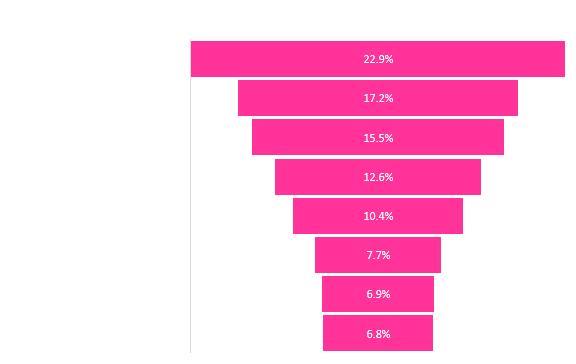
The other target client segments of these companies are banked individuals (21%), banked SMEs (18%) and unbanked SMEs (6%).
Se mento de clientes o eti o de las Fintec colom ianas
Particularly for the Fintech sector, 2022 is expected to be a year of cross-sector growth for all Fintech sectors.
According to Velmie’s Fintech Market Forecast report, the average growth of Fintech sectors in 2022 will be 12.5%.
Las Fintec entre istadas Fintec se mento de clientes o eti o son randes empresas % las personas no ancari adas % e idencia el compromiso del ecosistema Fintec por aportar a la inclusi n inanciera del pa s.
The fnance and lending sector is expected to have a growth in turnover of 22.9%. Meanwhile, the cross-border payments and digital wallets sectors are forecast to grow by 17.2% and 15.5%, respectively. The Cryptocurrencies segment will grow 12.6%; mobile banking 10.4%; e-commerce payments 7.7%; fraud prevention 6.9% and P2P 6.8%
Los otros se mentos de clientes o eti o de estas empresas son personas ancari adas 1% las mes ancari adas 1 % las mes no ancari adas 6% .

SEGMENTO DE CLIENTES OBJETIVO DE LAS FINTECH COLOMBIANAS
In 2019, the pre-pandemic year, and 2021, the second pandemic year, it is found that employment generated by companies in this sector had an aggregate growth of 10%. In particular, six of the nine segments saw an increase in the number of employees.
INFORME ECONÓMICO COLOMBIA FINTECH E pectati as de crecimiento de los sectores Fintec en
EXPECTATIVAS DE CRECIMIENTO DE LOS SECTORES FINTECH EN 2022
En particular para el espera ue el crecimiento sectores Fintec .
Se ún el reporte Fintec Forecast de Velmie el crecimiento de los sectores ser de 1 %.
Se espera ue el sector prestamos ten a un crecimiento olumen de ne ocio de ue los sectores de pa trans ronteri os illeteras pronostica un 1 % respecti amente.
Criptomonedas m il 1 % pa os de electr nico % pre
% 6 %.
62 | FINTECH COMPANIES IN COLOMBIA ΙΙΙ
Gráfca 6, slide 13
Gráfca 7, slide 14
Crédito Digital Pagos Digitales Finanzas Empresariales Regtech PFM & Wealthtech Insurtech Neobancos Crowdfunding Crypto & Blockchain 0 500 1000 1500 2000 2500 3000 3500 2019 2021 296 70 109 151 14 204 238 207 586 286 535 1142 2304 2420 3239 3140 2089 559
Gráfca 4, slide 11
67 13 13 27 50 90 210 941 2 292 0 500 1000 1500 2000 2500 Neobancos r pto lockchain ro dfunding nsurtech F ealthtech egtech Finanzas Empresariales rédito igital agos igitales 2021 2019 Valores en miles de millones de pesos de 1
FINTECH
6
28% 21,9% 15,5% 10,4% 6,9% 17,2% 12,6% 7,7% 6,8% 28% 21% 18% 6%
FROM THE TECHNOLOGICAL REVOLUTION TO THE DIGITAL REVOLUTION
DANIEL MATERÓN CEO RAPICREDIT

The history of man is full of advances and setbacks. Even in some aspects of evolution, when discoveries or innovation appear, it is not possible to determine whether their infuence will be positive or negative on society; especially when their maturation can be long, having phases that could be understood as intermediate in the innovation process and that sometimes generate new ways as a collateral result of the main transformation phenomenon. Taking a look at the history of mankind as a quick review of evolution and of discoveries and innovation, we can imagine the impact on the societies of the
time of the discovery of hunting tools, fre and the ability to produce it, the wheel, gunpowder in China, and then the agricultural revolution, the industrial revolution and quickly the appearance of electricity, the telephone, television, computing, the human genome, the trip to Mars as the frst step to fnd new destinations for the settlement of our population; the building of the space station, biotechnology, etc. And it is surprising how innovation in all areas of society, I repeat, is produced with increasing speed and converging many times in the same instant of time, which sometimes surpasses our capacity
DANIEL MATERÓN | 63
for assimilation or the life of innovations is very short, because they give way to new versions or are replaced by new ones.
On the other hand, and for no other purpose than to mention it, it is worth highlighting the asymmetry between societies that generate innovation and those that do not. The former turn each innovation into a new starting point to continue innovating, while the latter only become users or not even users at all, remaining mere spectators of the societies that create, take advantage of and use them.
Just a few years ago we spoke of the technological revolution and today we speak of the digital revolution.1 And with the permanent
1 The technology that is coming into our lives at every moment implies a change in society. This is why we speak of revolution, as a presentation of a change that involves development and innovation. Nowadays, the technological revolution is marked by the development of digital tools, and that is why we can speak about a parallel revolution or new aspect that we call “digital revolution”, also defned as the “digital revolution”. also defned as the third industrial revolution.
technological revolution, the digital revolution appears in parallel with its contributions such as the Internet, the communication tools that erased with one stroke the physical mail or fax in almost the entire planet; and currently the social networks, which promise to advance to the next stage with virtual reality, extended or augmented reality, mixed reality, artificial intelligence and neural models, just to mention the capillarity of technological and digital innovation.
The aforementioned expresses innovation phenomena that have changed and will continue to change our lives, but that at the time of writing this introduction some may already be a thing of the past. We are in front of a new constellation that translates into a new revolution. In the next 10 to 20 years our lives will again change in a broader and deeper way compared to the last 3 or 4 decades.
If we refer to the aspects related to the Fintech revolution, we will be experiencing instabilities,

64 | FINTECH COMPANIES IN COLOMBIA ΙΙΙ
problems in understanding the changes, efects on macro and microeconomic aspects, regulations that do not interpret these new realities and urgencies to defne frameworks for action on systems or phenomena that have not yet taken their fnal shape. As has been the case in recent years, new ventures will continue to be born that will take even greater advantage of technological and digital developments. At the end of last year, there was a 39% increase in companies linked to Colombia Fintech, going from 200 companies in this industry to 279, with potential in the sectors specializing in credit, payments, remittances and insurance. All these technologies will be in our environments with or without our permission, with or without our participation, with or without our knowledge, with or without our attention or interest or indiference.
Then we will have to answer the questions that society will sooner or later demand: Are we aware of the change? Do we want to be part of it? Do we want to encourage our participation? How prepared are we? Do we understand the demand for resources required for our adaptation as well as the strategies to keep our companies or business models or model of society in force? Are we turning our backs on the new revolutions and thus widening the gaps between societies that innovate and our own? Time will tell and our responsibility as players in the Fintech ecosystem will be key to take our country on the right path.



DANIEL MATERÓN | 65
We born 100% digital, 100% secure


66 | FINTECH COMPANIES IN COLOMBIA ΙΙΙ
THE FINANCIAL ALLY,
100% DIGITAL, FOR COLOMBIAN COMPANIES
A STORY WITH SOLID FOUNDATIONS
IRIS was born from a meeting of three groups that had been thinking for a long time about how to improve the experience of companies in the fnancial sector. In the market there are many agile and secure digital ofers for natural person, but the same is not true for legal entities.

The frst of these, Financiera Dann Regional, was born 25 years ago as a result of the need of a group of Colombian entrepreneurs who were
looking for an entity to support their growth. Since then, Dann Regional has contributed to strengthening small and medium-sized companies in the country, especially by ofering credit to companies that could not get it from traditional banks.
On the other hand, the Aqua Investment Fund, managed by a group of entrepreneurs with a long tradition in the insurance sector, has faced the problem of fnancing growing companies. A few years ago, they decided to venture into the world of the bookrunning business. This order of payment company, which has always been
IRIS | 67
managed with the best criteria of transparency and proftability, had great difculty in obtaining fnancing because traditional fnancial institutions are wary of young, growing companies. Today, the company no longer has this problem because it has been showing solid and consistent results for years.
Finally, Lorenzo Garavito, who came from investment banking in New York and Bogota and had seen frst-hand how very interesting projects and companies failed to attract Colombian financial institutions, joined this triad. In the United States he worked a lot with debt and equity funds that bet on growing companies, generating a virtuous circle where companies grow because there is fnancing and investors are more likely to obtain a significant return because there is capital for companies to grow.
The three came together in 2019 and made the decision to create a state-of-the-art financial institution to support companies and businesses in Colombia and eventually in Latin America.
ACQUISITION OF DANN FINANCE
During 2019, the decision was made to capitalize Dann Regional to be the vehicle to create this new fnancial institution: IRIS the frst supervised financial institution, 100% digital and 100% focused on companies.
The decision to create this new platform through an existing entity was made for 5 reasons:
1 In Colombia, obtaining a license to raise funds from the public is a process that can take two years or more.
2 Dann Regional’s team is of the highest quality, which simplifes the start-up of any operation.
3 Dann Regional has a great name among Colombian savers.
4 Dann Regional has been working with Colombian entrepreneurs for 25 years and knows their fnancial needs very well.
5 Dann Regional has a very good reputation in the market; it was a clean company that had

68 | FINTECH COMPANIES IN COLOMBIA ΙΙΙ
no alerts with regulators or contingencies with third parties. Thus, that same year, the Aqua Fund committed to capitalize Dann Regional with $60 billion pesos over the next two years, taking control of the company and fnancing its growth.
TAILOR-MADE BUSINESS CREDIT

The first task in 2019 was the creation of a customized business loan for its clients. Today IRIS specializes in credits between $500 million and $4 billion with payment sources and guarantees. This is an important change in the Colombian market because medium-sized
companies that do not have access to traditional financial sector loans have nowhere to turn and have to finance themselves with equity capital. IRIS has a specialized commercial team, supported by a structuring and credit team, who seek tailor-made solutions for their clients.

IRIS | 69
“Since 2019 we have been the fastest growing supervised credit company in the Colombian market, with growth rates of more than 40% per year”
THE CREATION OF IRIS BEGAN IN 2019
At the same time of the capitalization, important decisions were made, such as adopting the new IRIS brand to offer 100% digital financial services for businesses, and at the same time strengthening the Dann Regional brand and operation to improve the experience of current customers.
This strategy was reflected in 3 major decisions made in 2019:
1 The same team will operate IRIS and Dann Regional. This is important so that the two operations can be strengthened with the investments that are being made in technology.
2 IRIS is starting with a savings account because companies and businesses need better tools to manage their cash, payment and collection information.
3 Invest in a new operational core, where, after analyzing diferent options, it is decided to use MAMBU for the operation of the neobank.
IRIS HITS THE MARKET IN JUNE 2021
IRIS was born after interviewing hundreds of Colombian entrepreneurs about the main problems they suffer with their traditional financial institutions. The results of these conversations led IRIS to rely on state-of-the-art technology to design products that respond to the needs of its clients.
Efficient use of technology enables savings to be passed on to customers

$0 handling fee
$0 in “digital portal” fee
$0 cost of statements
ACH and PSE interbank transactions at very competitive costs for our customers. Return above market average and calculated on a daily basis
100% digital platform saves time for customers
Easy account opening.
Intuitive handling of the digital platform. Identity validation system based on passphrase rather than tokens.
70 | FINTECH COMPANIES IN COLOMBIA ΙΙΙ
Secure service that is continuously improving
100% new technology, designed with the best security systems available.
Constantly evolving platform, improving customer experience.
Human team focused on customer needs. Technology tutors to support customers in managing their accounts.
Personalized and trained customer service area to solve problems on the frst call.
Customer-controlled platform
A platform where each customer builds a banking system tailored to their business. Ease and fexibility in user management. Ability to tag transactions to facilitate tracking and accounting of transactions. Innovation for easy batch transactions and payroll payments.
Possibility to download reports at any time and customized reports.

IRIS | 71
IRIS FUTURE
IRIS is constantly moving forward with growth alternatives.
Iris is always evolving the savings account to fit their customers needs based on what they deem important in their business. Today IRIS is connected to all fnancial institutions in Colombia and offers customers incoming and outgoing wire transfers through ACH and PSE. IRIS is working to complete the value ofer for collections and payments; and thus, become the best collection account in the country.
In addition, it is already licensed to issue and process credit cards and by 2022 will be able
to ofer companies and businesses in Colombia a real alternative tailored to the needs of its customers.
Another focus of the work is to improve the information that clients receive from their savings accounts. IRIS is continually advancing by providing detailed information to clients and facilitating integration with their administrative and accounting systems.
Regarding credit, Iris is improving the product experience by creating a new tailor-made credit for companies requiring fnancing of less than $500 million pesos.

72 | FINTECH COMPANIES IN COLOMBIA ΙΙΙ
The transformation of corporate banking is just beginning. IRIS has positioned itself as a real alternative for companies in Colombia by ofering a personalized service that covers all the customers needs.

IRIS | 73
25 years granting loans, with allies that support our management


74 | FINTECH COMPANIES IN COLOMBIA ΙΙΙ
SISTECRÉDITO,
THE FINTECH THAT HAS BEEN BEHIND THE COUNTER FOR 25 YEARS, WANTS TO GO DOWN IN HISTORY AS AN INNOVATIVE, HUMAN AND INCLUSIVE COMPANY.

OUR STORY:
Álvaro Villegas Londoño founded Sistecrédito in 1996 with the objective of systematizing credit, which at that time was done manually. In this way, he lightened the administrative burden of the merchant having to take charge of the portfolio and the operational part that this implied.
Always directing all its eforts towards the base of the pyramid, so neglected by traditional banking, Sistecrédito has reached up to 80% of credit approvals, contributing to financial inclusion from its corporate values. Respect and dignified treatment for customers who have no credit history, and trust, one of the pillars of the company’s operations: businesses and customers trust Sistecrédito.
The company that started in Medellin and surrounding areas was soon expanding thanks to national brands that demanded its services in other cities. This is how it reached the Eje Cafetero, then impacted the Valley and currently ofers its services throughout Colombia.
Since its inception, Sistecrédito has developed its own software that has allowed it to adjust to the needs of the market in a personalized and efficient way, achieving credit approvals in seconds: all this technological evolution is the result of constant support to its partners. Sistecrédito has enhanced its products as challenges have arisen along the way.
Developed an application for managing personal credit; a product of bonds and vouchers as a
FLOID | 75
Álavaro Villegas Londoño, Gerente y Fundador de Sisterédito

76 | FINTECH COMPANIES IN COLOMBIA ΙΙΙ
virtual means of payment; a collection network; a virtual payment gateway; a tool to systematize the loan in neighborhood stores and supermarkets; and its virtual store as the frst e-commerce in Colombia with the “buy now pay later” model.
The manager’s leadership is based on human sensitivity, simplicity and closeness. His altruism has allowed him to generate a healthy work environment, where his collaborators take precedence. It is interested in the development of the capabilities of its team and of each family, providing employment opportunities to people without work experience, allowing them to grow within the company with student allowances. One example, among many, is the current assistant manager of operations, who joined the company as a collections assistant.
Among the immediate and near future plans of Sistecrédito, the fntech that today reaches more than 450 municipalities in Colombia, is to continue with the economic growth supported by customers and allies, consolidate the brand nationally as the preferred brand for consumer loans, as well as making a commitment to expand to other markets such as Mexico, Ecuador and Panama.

The company now has 540 employees and expects to grow its human talent by 25% in the frst half of this year.
The Fintech ecosystem is becoming more and more consolidated in the country, as technology becomes an enabler to add value to customers as all players fnd newer and more practical ways to provide traditional services such as credit, payments, investments, savings, etc. The entire market will continue to grow and is projected to see an increasingly dynamic industry with new competitors, new technologies, and a whole new range of products and services in the digital ecosystem.
This has allowed the company’s share of online sales to grow, before the pandemic it was less
Sistecrédito’s higher purpose is to connect people with their dreams, which will guarantee the success of the company and the happiness of its clients and allies.
SISTECREDITO | 77
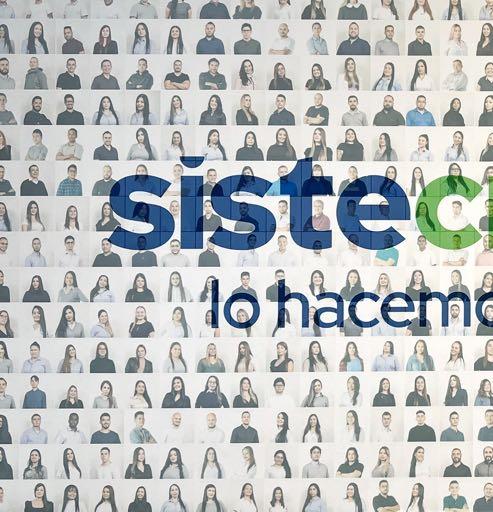
78 | FINTECH COMPANIES IN COLOMBIA ΙΙΙ
We are credit for all, we have made it possible for more than 4 million people.
than 1% and currently represents around 4% of sales; it is the segment that is growing more and more, even above the physical channel and Sistecrédito expects that in the near future it will represent 30% of the company’s sales.
Their services cover a whole universe of possibilities, because they are interested in providing people with opportunities to acquire consumer goods: at Sistecrédito they are there to help. They contribute to cover needs -often urgent- and they know that consumers require resources with fnancing.
With respect to the type of profles, these range from mothers who are heads of households to students who have reached the age of majority. It is very gratifying to see that 85% of its clients are part of the socioeconomic levels 1, 2 and 3. In traditional banking it is very complex to do so, since more than half of them are not linked to any company, that is, they do not have a formal job and are independent. This is a very important step in their lives, and we also know that 60% of them are women and the remaining 40% are men.

SISTECREDITO | 79
RESILIENCE
Sistecrédito had been preparing to expand its collection channels since before the pandemic, devising a 360º solution for the user to have other channels available, a kind of omnichannel strategy. What the pandemic did was to accelerate
those investments and the technological developments involved in going digital for the user. The pandemic caught by surprise many stores that had no online sales, not even through social networks, so they quickly.

80 | FINTECH COMPANIES IN COLOMBIA ΙΙΙ
THE FIGURES
COVID-19 tested - among many other things - the global economy. We entered 2020 with optimism, taking up the challenge left by the pandemic. One year later and as we close 2021, we can say with certainty that this was the year of resilience: the fgures with which Sistecrédito closed the year are a clear demonstration of the valuable work we do day after day and the positive impact of the work of each team. developed a solution: an online store, which allows us to generate payment links for customers who want to buy on credit. In this way they helped merchants who had difculties when they had to close their businesses physically. Sistecrédito’s virtual store is diferent from the payment button because it is not designed for large stores that already have

e-commerce but for entrepreneurs who have small brands, who do not have a website but sell through Instagram or other social networks.
2021 was the year with the highest sales: Ps. 995 billion, December being the most relevant month with 190 billion pesos in sales. In addition, we reached 4 million customers and 17 thousand allied establishments.
Emilio Villegas, Subgerente de Estrategia
SISTECREDITO | 81
We facilitate access to fnancing for Colombian economic units.

82 | FINTECH COMPANIES IN COLOMBIA ΙΙΙ
THE ADVANCE OF GUARANTEES WITH FINTECHS
Fintechs have entered the financial market not only by opening up competition but also by providing quick and simple solutions to underserved segments of the market. In this context, the use of new relationship technologies is leading the fnancial ecosystem to accelerated transformations for the beneft of citizens, facilitating access and enabling fnancial inclusion.

These institutions bring efciency and fexibility to the market through the use of technology. In this aspect, if the user experience is important, so are the conditions of the products.
This is how since 2018, the National Guarantee Fund has been growing in the number of links it has with Fintechs. In that year, the frst four entered. Then in 2019 there were three and during 2020 seven more were linked to the Fund. Currently, 13 Fintechs have an agreement in force to ofer guarantees in their products.
These 13 Fintechs have a guarantee value quota that varies according to the fnancial indicators of each of these institutions, ranging from $600 million to $77 billion. In order to assign the Maximum Discretionary Value (MDV) to Fintech intermediaries, the National Guarantee
FNG | 83
Raúl Buitrago Arias, Presidente del Fondo Nacional de Garantías
Fund with the collaboration of Colombia Fintech, established a new methodology for its allocation...
This work sought not only to strengthen the use of guarantees but also to incorporate new variables for evaluating this type of institutions, such as their rapid expansion and the quality of their credit risk management. The new methodology implemented takes into account the cycle in which the Fintech is in fnancial terms, the due diligence in qualitative and prospective aspects of the intermediary, the quality of its portfolio and risk management.
Through Fintechs, 10,864 beneficiaries have had access to a credit value of $498,625 million guaranteed by the FNG, with the most widely used guarantee lines being those for working capital and self-employed workers. Precisely, in these four years of relationship between the Fund and Fintechs, they are already beginning to occupy second place in the amount of guarantee mobilizations. By departments, Bogotá stands


out with $303,328 million in loans (1,582 benefciaries), followed by Antioquia with $83,480 million (653 benefciaries), Atlántico with $39,393 million (5,113 benefciaries), Cundinamarca with $21,064 million (276 benefciaries) and Valle del Cauca with $13,087 million (168 benefciaries).
With Fintechs we not only have a relationship that allows them to offer our guarantees, but they have also accessed our product portfolio, as has been the case of Avista and Finsocial, which accessed our bond line of the Unidos por Colombia program, with a backing of 70% of the total amount by the National Government through the National Guarantee Fund (Fondo Nacional de Garantías).
Avista is the frst Fintech startup to issue debt bonds on the Colombian Stock Exchange, in two issues, one in 2021 for $11.6 billion and the other a few weeks ago for $22.8 billion. So far it is the only one to issue bonds to finance the silver economy segment. Finsocial will soon issue ordinary social bonds for up to $100,000 million.
84 | FINTECH COMPANIES IN COLOMBIA ΙΙΙ
 Sede FNG en Bogotá
Sede FNG en Bogotá
In this regard, FNG has undertaken a digital transformation process that places the needs and interests of its audiences at the center of its development. The frst step included the redesign of the transactional portal, which for more than 15 years had not had any type of intervention and which seeks to improve the experience of fnancial intermediaries in accessing our services in an intuitive, easy and organized manner.
The new FNG transactional portal built with a user-centered vision will be the basis for the digitization of guarantees and, thus, the FNG will join the digital credit in commercial portfolios to which the actors of the fnancial ecosystem are beginning to migrate.

Fintechs are playing a very important role in the fnancial inclusion of our country, which improves the competitiveness of the system in areas such as access to credit under attractive conditions. All based on the transformation or evolution of digital assets.
86 | FINTECH COMPANIES IN COLOMBIA ΙΙΙ
FNG | 87
In parallel, it seeks to promote the 2.0 version of the APP of the National Guarantee Fund, where banks, Fintech companies, commercial finance companies, cooperatives and family compensation funds, among others, will be able to make their consultations and transactions in a more timely manner.
Changes in the financial ecosystem have led to permanent improvements in the service experience. Thus, in the 40 years of the FNG, we have a stronger entity, with a new risk scheme, which implied reformulating processes,

technological reengineering according to market demands, and specialization in its team of professionals to respond to the challenge.
At the FNG we work to make things happen and happen well, for the greater beneft of the Colombian business fabric, preserving the freedom of enterprise and contributing to the generation of formal employment as the main instrument for the structural overcoming of poverty, an overcoming sustainable over time because it will depend on individual and collective efort to make the best possible version of our country.
88 | FINTECH COMPANIES IN COLOMBIA ΙΙΙ

An app to invest in stocks, easy, fast, safe and from your cell phone.


90 | FINTECH COMPANIES IN COLOMBIA ΙΙΙ
trii DEMOCRATIZING THE STOCK MARKET
Trii is the app that is revolutionizing investments in Latin America, starting with Colombia, democratizing the stock market for everyone thanks to its easy access and low commission costs.
For many years, access to the stock market was limited for Colombians due to bureaucratic processes, high minimum investment amounts and high costs of commissions or administration fees that blocked the possibility for minority investors to access this market and in turn slowed down the development of companies
through stock market fnancing, a situation that is fundamental for the economic progress of a country.
Faced with this need, Esteban Peñaloza, Carlos Guayara and Luis Patt, co-founders of trii, developed an app that would lead this sector and millions of new investors to reach historic milestones in Colombia. This is how the idea of trii was born, an application that was managed for more than two years, before its launch in March 2021, which allows all Colombians to register in a 100% digital, fast and secure way,

TRII | 91
Luis Patt, Esteban Peñaloza y Carlos Guayara, Fundadores
being backed by Acciones y Valores S.A., a stock broker with more than 60 years in the market, who provides its strength and regulatory support, so that users can have access to shares of the largest companies in the country listed on the Colombian Stock Exchange (bvc), and several of the largest companies worldwide.
Among its features and advantages, this application allows people to buy and sell shares from Monday to Friday during trading hours, with just one click; in addition, it does not require a minimum deposit amount and manages the lowest commission costs in the market, at only $11,900 per operation in its normal service, and even up to $5,950 in its premium service “trii pro”. Likewise, trii is committed to fnancial education available to all, through talks at universities,
lives through social networks, videos and free courses on platforms such as Instagram and Youtube, among others.
However, on April 29, 2021, a little more than a month after the launch, trii achieved its frst historical record in the bvc, after a day of commission-free operations, in which 8,457 operations were carried out; at that time it began to appear in newspapers such as La República and Semana. Subsequently, after the great reception of the app, a new commission-free day was launched, in which a new maximum of operations was achieved in a single day, reaching 14,789 transactions on August 26, 2021, almost double the amount registered on the frst day, obtaining recognition directly from the bvc and press with important coverage in the country.

92 | FINTECH COMPANIES IN COLOMBIA ΙΙΙ
On the other hand, in September 2021, a new initiative called “Issuer’s Week” was launched with the objective of generating strategic alliances with issuing companies in which conversations with presidents, market analysis, contests, virtual events, commission-free day for the shares of the selected company, and more are held; The frst issuer was Grupo Argos, with participating shares of Grupo Argos, Cementos Argos and Celsia, and motivated by this strategy other companies followed, such as Grupo Sura,

Hcolsel, Grupo Energía Bogotá and recently Chilean shares such as Falabella, Banco de Chile, Enel, Cencosud and Sociedad Química y Minera.
Simultaneously, trii’s access to U.S. and Chilean stocks, registered in the Colombian Global Market, was closely related to the round of investors in which trii participated in Y-Combinator, where it raised US$5.5 million and in turn, national and international recognition, appearing in articles of prestigious media such as Bloomberg,

trii | 93
Forbes, La República, Semana, Caracol, and others. However, as part of trii’s growth, a pro version was launched at the end of November 2021, with additional benefts to those already ofered by the application, including access to real-time prices, in-depth lines, 50% discount on commissions, weekly premium reports and preferential service lines for these users. To purchase this version, a monthly payment of $23,900 or an annual payment of $239,000 is all that is required, receiving two months free membership as a gift.
It should be noted that trii currently has a total of USD$18.2 million in assets under custody
and that the number of users has expanded to a potential level, with a total of approximately 150 thousand registered users and more than a thousand with access to trii pro.
Finally, among trii’s expansion strategies in Latam, on March 3, we opened the product in Peru, starting with a beta version of the app (without commission), which is currently being used by more than 1,000 Peruvians, and soon we will also enter the stock market in Chile, strategic countries for the democratization of the stock market in the region.

94 | FINTECH COMPANIES IN COLOMBIA ΙΙΙ
Trii is the only application in Colombia that allows you to sponsor a tree. Plus, for every 20 transactions you make on trii, we will plant for you!

trii | 95




















96 | EMPRESAS FINTECH EN COLOMBIA ΙΙΙ
Our team
We are Trii, a Colombian Fintech determined to democratize the access of all people to the stock market, in a friendly, easy to understand, accessible and cheap way.















TRII | 97
All information sources in one API.


98 | FINTECH COMPANIES IN COLOMBIA ΙΙΙ
Grupo empresarial
FLOID
PIONEER OF OPEN BANKING / FINANCE /
DATA IN LATIN AMERICA
WHO ARE THEY AND WHAT DO THEY DO?
Floid is the information provider of the future, which through Open Banking/Finance/Data technology, allows consumers to share their personal information in seconds, to get better products and services from third parties. They also allow institutions to evaluate more people who are not being considered by the fnancial system today, promoting inclusion.

It was founded as an Open Banking company, a concept born in Europe with the PSD2 regulation, which aims to enable consumers to manage their fnancial information and share it with whomever they wish, giving them autonomy over this data and probably the possibility of acquiring superior and more personalized fnancial services. It also offers the possibility of automating financial processes such as bank reconciliations, saving
companies time and money in these processes. In the future all banks, savings cooperatives, compensation funds and other financial companies will use this method, which is much more secure, inclusive and faster to be evaluated (for any fnancial product) and will also be used to validate identity, make anti bank fraud checks, even to vote (as they do in Sweden, the so-called Bank ID).
They claim that they can change the information market to a more inclusive one. They are sure that people and companies are the owners of their information (and this is also indicated by the legislation of the countries in which they operate).
They always act in accordance with consumer and data protection laws, so that their customers and users can feel confdent about sharing their information.
FLOID | 99
PRODUCTS AND SOLUTIONS
At Floid, there are several specific products depending on the use case presented by their customers. They use diferent API’s so that their users have the most information and can obtain the desired result. In addition, the technology they use makes the process not only very fast, but also very secure. They have several tailormade solutions within which you can fnd:
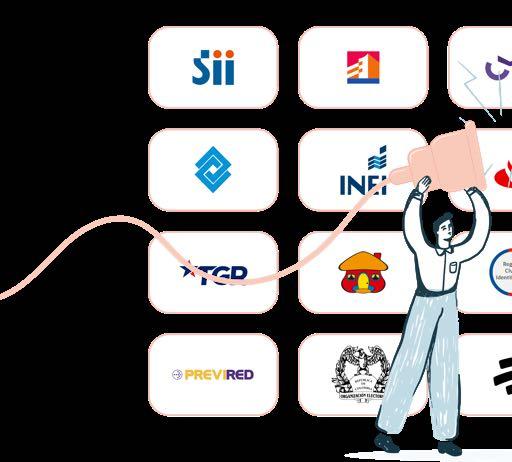
1. Onboarding and KYC:
Rocket onboarding: helps increase user conversion in onboarding fows and allows you to meet the user with as little friction as possible, whether they are individuals or companies.
Identity Validation: Helps provide users with the possibility of validating their personal credentials, so that they can be approved by comparing their data with ofcial sources.

Know Your Customer (KYC): Profiles and knows companies and consumers with demographic and contactability information to avoid fraud and optimize processes.
2. Risk Assessment:
Income Calculation: Allows the connection with different sources of information to calculate the income of dependent and independent workers. Also for companies and SMEs.
Expenses: Helps to know consumers’ expenses. Monthly payments, debts, utility bills and their recurrence, to know their risk patterns.
100 | FINTECH COMPANIES IN COLOMBIA ΙΙΙ
Liquidity: Financial load and account health, to help companies and individuals with the fnancial products they need at the right time.
Debts and Court Cases: A “trafc light” for creating cost-efficient decision trees and making automated decisions.
Assets, Liabilities and Investments: To understand users’ main financial products at their major banks and other financial institutions.
Transactional Information: 12 to 24 months of “up to date” banking information, to create innovative products within your internal processes, savings applications or SAS.
3. Digital Transformation

Financial Portability: Allows users to move their loans, financial products, contacts, investments and accounts from one institution to another.
Digital Certifcates: Automates the collection of documents in a secure way, directly to the user’s information sources, in a single click. To create reports and certifcates efciently.
Fiscal and Regulatory Declarations: Digitizes the processes of reporting to
governmental or fiscal regulators that correspond to the activity of the company that uses them.
4. Personal Finance
Transaction Categorization: Allows you to observe consumption patterns to understand user habits. Creates powerful savings applications.
5. Accounting & ERP
Bank Reconciliation: Makes bank statements available to users, or automates the confguration of accounting documents directly from the company’s bank.
Automatic invoicing and tax folder: Generate invoices (or accounts receivable) to third parties from the application or available for download in the tool.
Transactional Information: 12 to 24 months of “up to date” banking information, to create innovative products within your internal processes, savings applications or SAS.
FLOID | 101
After raising capital from Ángeles investors, where the renowned Martin Birkeldh (Founder of Spotify) is located, Floid begins its operation in Chile where it begins to revolutionize the Fintech market, making the fnancial system more inclusive and giving consumers the possibility to access better products , faster and completely online.

A BIT OF HISTORY...
Floid is a Fintech of Swedish-Chilean origin founded in 2019 by Alfonso Maira and John Grundstorm after living, each in turn, the complex challenge of delivering financing in the local market. Identity validation and credit assessment tools were insufficient, both for the companies trying to do so and for the end customers. John, of Swedish origin, had arrived in Chile after selling his Open Banking company to Tink, the European giant, with the idea of founding a Buy Now Pay Later company (the frst) in Chile.
He soon found that the credit bureaus did not provide enough information on individuals and the processes for doing so were too slow. Alfonso Maira, on the other hand, was working in a mortgage credit company where, like John, he knew very well the gaps that information providers in Chile had. That is why they decided to get together in 2019 and found Floid, an Open Banking company that will revolutionize the Latin American market.
102 | FINTECH COMPANIES IN COLOMBIA ΙΙΙ
After raising capital from angel investors, including the renowned Martin Birkeldh (Founder of Spotify) Floid starts its operation in Chile where it begins to revolutionize the Fintech market, making the financial system more inclusive and giving consumers the possibility to access better products, faster and completely online. After a year and a half of learning in Chile, Floid opens its doors in Colombia and Peru, following the dream of being the largest Open Banking company in Latin America. That is where the biggest challenge begins, that of building a company remotely, attracting the best talent and building a remote team.
On the other hand, in 2021 Delfna Peña (today Co founder and CRO) joins the company, who with her previous experience working in Fintech, brings to Floid a new horizon, better organization of expectations and brings with her some goals that quickly make her a key element in the growth of the company. Likewise, Floid joins the Chilean company LemonPot and with it receives

the technological crack Tomas Contreras (today Co founder and CTO), who revolutionizes Floid’s technology and ends up capitalizing on the idea of not only being a pioneer company of Open Banking in Latin America, but of being a company of Open Finance and Open Data.




With the above, Floid begins to set a more challenging goal: to become the information provider par excellence in Latin America.
Now, it not only wants to provide its customers with banking information, but also information that resides in other sources. This challenge represents a giant step for the company as it must adjust its technology to make this possible in the fastest and easiest way possible while avoiding friction, so that the end consumer can go through the process and have an amazing experience.
Finally, at the end of the year, Floid raised a $2.25 million seed round, with the participation of
John Grundström
Alfonso Maira
Tomás Contreras
Delfna Peña
FLOID | 103
important investment funds such as Amarena, Carao Ventures and a fund linked to the Santander group. The purpose of this boost is to continue the platform’s expansion in the region, especially with a view to the Mexican market.
According to Alfonso Maira, CEO and Co Founder of Floid “as precursors in Latin America of Open Banking/Finance/Data is very important to grow with the support of recognized institutions at a regional level, in Floid we are committed to promote Open Finance in a responsible, safe and inclusive way, with all the actors of the ecosystem”. He also assures that “We are taking
the step from being an Open Banking company to an Open Data company.
Our products are not only about helping people and companies to share their banking data. But also any data that you will need to prove to any institution, such as tax information (SII, DIAN, SUNAT), fnancial, personal or debt information. Our mission is to reach every corner of Latin America, so that companies and individuals can have their information available to share it with whomever they wish in a secure way. Open Data is a key driver for fnancial inclusion in Latin America”.
104 | FINTECH COMPANIES IN COLOMBIA ΙΙΙ
WHAT’S NEXT FOR THEM?
Increased market penetration. With the seed round just raised, they expect to grow and expand throughout Latin America. The company has also embarked on a mission to provide tools for consumers and companies to share their information with the world: to improve their quality of life, to be included in the fnancial system, to change the culture of negative evaluation (credit bureaus) for a positive one (Open Finance).
FLOID | 105

106 | FINTECH COMPANIES IN COLOMBIA ΙΙΙ
A unique model in Latin America and a commitment to make this industry more accessible to all types of consumers.
LUEGOPAGO
THE FIRST ‘BUY NOW PAY LATER’ MARKETPLACE IN LATIN AMERICA
A single place to buy everything you want and pay for it later. That is the promise with which Luegopago.com was launched in the Colombian market to democratize the consumer credit scenario, as the frst marketplace under the “Buy Now Pay Late” format. Its great diferential value is that it is an online commerce that allows you to pay in four fxed installments without interest or hidden costs, a fexible and easy to use method, aligned with the lifestyle of today’s consumers.
Luegopago’s rapid growth is largely due to the diversity of its portfolio. Its opening in 2021 allowed consumers to find a wide range of
thousands of products in categories ranging from fashion and sports accessories to pet supplies, makeup and technology. Even insurance and services such as SOAT can be paid for through Luegopago, making it easier for users to manage their money more intelligently in relation to these obligations by deferring them to installments without the need for credit cards.
In the words of Martín Peláez, manager and co-founder of Luegopago: “Digital commerce has wide-ranging benefts that are not yet fully reaching the frst three strata in Colombia, partly due to lack of knowledge, distrust or lack of

LUEGOPAGO | 107
accessibility. Even so, payment in installments has been part of the Latin culture since the last century. We want to empower digitally consumers who want greater fnancial control, those who are starting their credit life, who depend on the fortnight to have cash fow and who see in installment payments the opportunity to responsibly obtain the things they work for.”
For this reason, Luegopago aims to continue diversifying its product and service categories. In 2022, they launched their new vertical focused on the travel and tourism segment,
a unique model in Latin America and a bet to make this industry more accessible to all types of consumers, especially those with lower purchasing power. On this website they will fnd domestic and international travel at the prices they are looking for, with the airlines they trust and with a payment method that makes it easier for them to control their budget by paying for any ticket in four monthly installments without interest. Understanding the specific needs of this segment, the platform expects to soon expand its ofer with bus tickets, vacation plans, hotels and car rentals.

108 | FINTECH COMPANIES IN COLOMBIA ΙΙΙ
GROWING ON THE BASIS OF MUTUAL TRUST
The platform’s growth in 2021 was 270%. For Martín Peláez, this success can be attributed to the mutual trust between the platform and its consumers: “More and more people want to buy online and access products and services that they may not be able to pay for in cash but that, through credit, would be within their reach. Creating a unique space where you can buy everything and pay in interest-free installments, without having to be banked, let alone have a
credit card, is giving many lower-income users the opportunity to make the most of their monthly budget”.
One of the insights that Luegopago has found during its frst year on the air has been the value of trust in the relationship with the consumer. “Trust in a region like Latin America is a cultural barrier,” explains Martín Peláez. “Part of the reason why many consumers do not seek credit cards or are not banked has to do with confdence from their level of knowledge about fnancial issues, so something like paperwork,

LUEGOPAGO | 109

110 | FINTECH COMPANIES IN COLOMBIA ΙΙΙ
interest rate or handling fee become fears that hinder the approach to these alternatives to manage the personal budget.”
Luegopago understood that it could even be a gateway to the frst virtual purchases of many consumers and focused on accessibility by simplifying the experience from start to fnish. The Marketplace is a CMS (Content Management System) developed in house that allows them greater flexibility in design and UX to make shopping easier. Thus, the credit application can be made from the user’s phone without any cumbersome procedures, to obtain confrmation in less than a minute, with 85% approval. Then, at the time of purchase, the user is given clarity on fxed installments and payment times so that he/she can make an informed decision. Through reminders, customers are informed of the date of their next payment and all the methods they can use, including cash at collection points throughout the country such as Efecty, Gana and Supergiros. Timely information on the status of the order and the shipment generates peace of mind for the customer, and after the purchase, the customer is always asked about their experience.
Consumer response has been very positive and, for Peláez, reflects that sense of mutual trust: “Consumer feedback is a very exciting part of the process, because the messages are full of gratitude for giving them a place where they can fnd everything they are looking for on credit, and for trusting in their responsibility to respond with the payment of installments. Some customers mention the possibility of better allocating their money, and that feedback allows us to understand that, in addition to providing a great portfolio of products and services, we are empowering these people by giving them more control over their fnances.” With an NPS of 87, the platform has exceeded its loyalty goals: as consumers discover the ease of Luegopago, they incorporate it as a regular purchasing method, allowing the Marketplace to connect them with all types of brands.
Growing with vendors
Beyond the credit system, the value of the Marketplace lies in the breadth and quality of its portfolio. Many of the participating brands, or sellers, as Luegopago calls them, fnd in the platform the best space for online sales. About the strategy, Luegopago’s manager explains: “We want sellers to see us as allies for the growth of their businesses. We seek to give them efcient tools to captivate new customers and improve their conversion by providing the best experience. We will do it with a solid platform and marketing strategies, and they will do it with an efcient inventory and a logistics process that prioritizes the consumer.
One of the great benefits for sellers is the Seller Center, created to give them autonomy in their stores and allow them to integrate with other CMS to connect their billing and logistics systems. “The Seller Center is an experience that is diferent from what they fnd in other popular marketplaces in Colombia, because it gives them total autonomy to easily update their inventories, defne their banners, ofers and prices, giving them greater control over their operations,” adds Pelaez.

LUEGOPAGO | 111
Martín Peláez, gerente y cofundador de Luegopago
Buy Now Pay Later from a Latin perspective
Since 2019, the Buy Now Pay Later (BNPL) consumer credit format, which allows paying at afliated merchants with interest-free fxed installments, has boomed in England, the United States and Australia. It is a scheme designed to attract the Millennial and Generation Z segments, who see it as a practical option to get more out of their monthly income by buying in categories such as fashion, makeup, accessories and technology. For many users, it is their frst approach to the world of credit, with more fexible standards than they fnd in the banking system and an experience tailored to their needs: fast approval, no paperwork, no lines and no friction, all from their phones
Beyond the generational approach, this Colombian frm decided to take advantage of this model to democratize online shopping and cater especially to a segment with a limited budget. With a robust offer in multiple categories, transparent information about the payment system, easy access to credit and interest-free installments, the online consumer segment

Luegopago saw in this format a great potential for the sale of products and services with easy credit in Latin America.
112 | FINTECH COMPANIES IN COLOMBIA ΙΙΙ
would be signifcantly expanded and allow all types of businesses to access new customers.
It was in 2020 that Martín Peláez decided to undertake this project, aimed at democratizing online shopping through the BNPL model, with the mission of being the frst in the region. His previous experience with his sports products Marketplace led him to think that the diference with the BNPL that was successful in the frst world - where affiliated businesses offer the payment method in their channels - would be to have a single site where the consumer could find all the brands and products, and access interest-free credit there. In this way, you could establish greater trust in the system and have more control over how you communicate it.

This is how Luegopago was born, a fresh brand that speaks to the consumer as a friend and in a clear language: “Buy now and pay later” The web interface, the main product categories and the brand communication are oriented to generate confdence in the payment method, so that the consumer discovers that any purchase from this marketplace will allow him to better control his cash fow.
Due to the isolations, the pandemic accelerated Luegopago’s plans: the demand for products and services through the web became an urgency
for businesses that had not yet incorporated this sales channel. The company saw unexpected growth and the challenge of expanding its work teams by fnding high-level technology profles to meet its goals, those of the sellers and those of the new consumers.
The team has learned a lot from this acceleration, and continues to grow and hire new talent in order to react quickly to market opportunities. They work under agile methodologies that allow them to achieve time to market in increasingly shorter times. That is why they are now focused on new business verticals with which they hope to penetrate other highly desirable markets, where the frst layers have not been in focus. Its most recent bet on the travel and tourism sector could become one of its main strengths and open doors to other countries in the region.
This year, Luegopago seeks to reach Mexico and Brazil. To make this possible, they are considering investors, who not only contribute fnancially but can enrich the operation with their own knowhow. Martín Peláez confesses: “We are a very talented team that works hard to be #1 in Buy Now Pay Later in the region and not only boost the companies that trust us, but also allow consumers to grow from their fnancial intelligence”.
LUEGOPAGO | 113
End-to-end consulting focused on action and results
114 | FINTECH COMPANIES IN COLOMBIA ΙΙΙ
NIMMÖK,
AN INTERNATIONAL CONSULTING
FIRM
SPECIALIZING IN THE DEVELOPMENT AND CO-CREATION OF DIGITAL FINANCIAL SERVICES BUSINESSES
Nimmök is an international consulting frm with expertise in planning, implementing and developing results-driven strategies for the efective digitization of business services and ecosystems.
Nimmök has 25 years of experience leading important fnancial services transformation projects, accompanying clients in the strategic design, development of new products, creation of digital business units and assisting in the implementation and execution of goals.
It has extensive experience in structuring strategic alliances with key players in the economic ecosystem in order to strengthen its service oferings and accelerate its clients’ time to market.

In recent years, he has actively participated in the co-creation of 100% digital banks, FinTech, mobile wallets, DeFi, distribution channels (agents and acquirers), among others.
It has extensive experience in managing licenses and authorizations with fnancial regulators, as well as sharing with government authorities international best practices in the application of new technologies to deepen access to fnancial services and the formalization of the economy.
NIMM Ö K | 115
More than 100 projects successfully implemented globally.
OUR CLIENTS HAVE ENTRUSTED US WITH THE DEVELOPMENT OF THEIR BUSINESSES AND PROJECTS RELATED TO:
Digital banks
Management of multi-partner projects
Crowdfunding
Digital omnichannel
Interoperability hub

Digital microfnance
International expansion
DeFi & Crypo assets channels digitization

Insurtech, Proptech, mHealth
Wallets and mobile payments
116 | FINTECH COMPANIES IN COLOMBIA ΙΙΙ
SUPPORT FOR SUCCESS
Thanks to his experience advising diferent industries at an international level, he has developed a proprietary methodology that combines the best of agile and traditional project management. From the defnition of the initial business plan to the implementation of the projects, he develops techniques that allow him to adapt to the diferent ways of working of the internal teams of clients and their service providers.
It accompanies its clients in all stages of the business: conceptualization, implementation, strategy development, structuring of alliances and commercial agreements, as well as in the execution of the same and the attainment of investments.



Its contribution to the incremental value generation of projects considers the stages of research, defnition, idea generation, decision making, prototyping cycle, implementation, execution and business development.

End-to-end consulting focused on action and results








































Risk

STEP 01 STEP 01 STEP STEP Market research and insights
strategy and modeling
design and prototyping
and providers selection
and fundraising
Financial
Product
Architecture
Implementation
and
compliance
Business execution and development
NIMM Ö K | 117
International expansion *Duration may vary with additional requirements to the proposed deliverable base or modifcations to the scope once the project has started.
360° COVERAGE OF CONSULTING NEEDS

MARKET RESEARCH AND INSIGHTS

Analysis of the internal assets that can be used for the shielding of the project, study of the regulatory environment, the competitive scenario, the existing business opportunities in light of international trends and success stories. Analysis of the captive and potential clientele. Based on behavioral sciences, a behavioral map is designed, which will later give light to the proposal of interventions to be carried out in the early implementation.
FINANCIAL STRATEGY AND MODELING


Proposal of a model to take advantage of market opportunities based on the current assets and strengths of the organization, as well as the defnition of the best way to carry out the shielding of the business towards a local/ regional/international expansion.
Materialization of the fndings in an economicfnancial model that contemplates all aspects of the proposed business and provides confdence to managers, shareholders and investors.
PRODUCT DESIGN AND PROTOTYPING
Design with a strategic view of products that meet the expectations and needs of individual and corporate customers. The design results in interactive prototypes of the products, their fow and experience for the diferent interfaces defned in the business.
Product modeling and hybrid (physical and digital) approach to customer experiences in order to understand each touch point with which they interact and experience your services throughout their use and life cycle.
ARCHITECTURE AND SUPPLIER SELECTION
Support in the defnitions of the product architecture and selection of technological suppliers that correctly materialize the ideas of the business and its roadmap; ensuring implementation times and correct confguration of the technological solutions.
The client is accompanied in the defnitions of functional, technical and commercial requirements (RFx), negotiations with suppliers, design of the functional specifcations document (FSD), preparation of legal documentation, implementation of integrations, confguration of business rules and design of processes.
118 | FINTECH COMPANIES IN COLOMBIA ΙΙΙ
IMPLEMENTATION AND FUNDRAISING
Structuring of all the components of the organization that will carry out the business, as well as the coordination of concept tests and pilots.
Training and coaching sessions are conducted for collaborators, seeking to ensure that all areas of the business are aligned and empowered with the current business path. Design of the investment strategy and support in the procurement of resources, if necessary.
RISK AND COMPLIANCE
Regulatory analysis, compliance requirements, risks associated with the business and their possible impact, recommendation of countermeasures to ensure the operation.
Design of the regulatory shielding strategy and support in the preparation of the necessary documentation and processing of licenses before the regulatory entities, as required by the proposed business model.
BUSINESS EXECUTION AND DEVELOPMENT

Support in the shielding of the business from the perspective of product oferings, channels, corporate clients and users.

Assistance in the identifcation and achievement of Strategic Alliances.
Support in the implementation of the go-tomarket plan, in order to ensure the roadmap and the achievement of goals.
Support in the operation and early business development.

INTERNATIONAL EXPANSION
Assistance in plans to conquer new markets and international expansion, through the understanding of the dynamics and ecosystem of the target countries, analysis of their competitive and regulatory scenario.


Support in the design of the expansion roadmap accompanied by a detailed fnancial analysis, as well as assistance in the licensing and regulatory shielding processes of the defned business.
Identifcation of potential partners and suppliers and assistance in their selection and in the development of commercial agreements.
NIMM Ö K | 119
CEO & Founder +30 years of experience in the fnancial industry +100 projects advised.





Head for South America
Expert in project management, gender equity, marketing and user experience. + 30 projects advised.



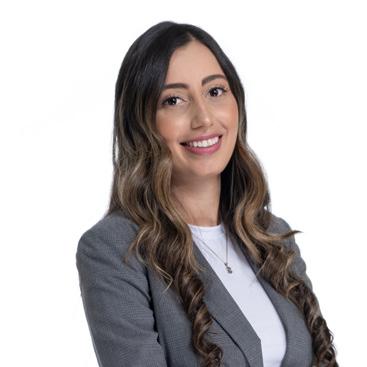

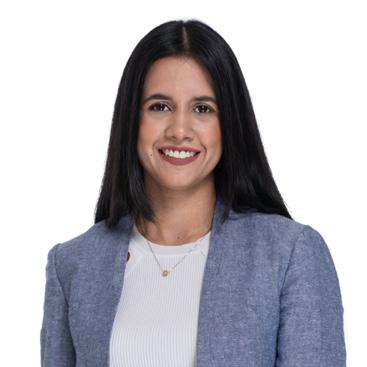




Master in Internet Business. Expert in fnance, business modeling and project management. + 40 projects advised.

The success of your project does not depend solely on having the investments and technical capabilities to carry it forward, it requires a team of experts, knowledgeable of international best practices and capable of achieving impeccable execution.
 Daniel Navarro
Flor Suárez
Iván Aguado
Daniel Navarro
Flor Suárez
Iván Aguado
120 | FINTECH COMPANIES IN COLOMBIA ΙΙΙ
The broad international, multicultural and interdisciplinary experience of the Nimmök team has allowed us to solve the industry’s most challenging problems and co-create businesses with unique competitive advantages.
Driving business ideas into real projects
International consultant with 25 years of experience, forged in action and results, specialized in the co-creation, implementation and support of digital fnancial services projects. Since its inception, it has cultivated knowledge and relationships with key players in the fnancial services ecosystem.
Boosting the Fintech ecosystem
Thanks to the trajectory, experience and knowledge of the fntech market in the region, Nimmök gives life to Nimmök Ventures, an investment fund that supports fntech business models that seek to close the economic inequality gap in the world through innovation.
Boosting the digital mindset and blockchain ecosystem
Sharing learnings on the key characteristics, trends and patterns in the digital transformation of industries.
Providing key insights to design successful strategies, business models and products by sharing stories and lessons from those who have experienced their digital transformation.
Developing a digital mindset forged in action.
Driving community transformation
Power Pal’ Pueblo was born as an initiative of Nimmök to empower rural populations with tools that allow them to improve their living conditions.
Nimmök allocates 10% of the profts of each project to Power Pal’ Pueblo, which means that from your company you also support these communities.
NIMMÖK
Nimmök Academy Nimmök Academy Nimmök Academy
Nimmök Academy Nimmök Academy NIMM Ö K | 121
GROUP
Nimmök Academy


122 | FINTECH COMPANIES IN COLOMBIA ΙΙΙ
A non-bank to move your money with total freedom
MOVII, HUMANIZING THE COLOMBIAN FINANCIAL SYSTEM

Colombia is a country that has grown in many sectors in recent years, to the extent of becoming an international benchmark in Latin America for economic afairs. In fact, in 2020, it successfully completed its process of accession to the Organization for Economic Cooperation and Development - OECD, as a result, it became an investment focus. However, although important steps have been taken thus far, there are issues that still bafe us, an example being, the fnancial inclusion of all Colombians.
The fact that nowadays not all people from all walks of life, have access to a fnancial service,
is consequential because it hinders the growth of SMEs, which run in the cities and in the countryside across the nation. Therefore, providing an immediate solution to the vast majority of this population is a social liability.
And so, MOVii was born to help with the mission of fnancially including millions of Colombians who have historically been pronounced the “outcasts” of the fnancial system. Yet, to understand the history of the country’s frst Sedpe (Sociedad Especializada en Pagos Electrónicos) we have to go further back in time, to when the company’s groundwork began to grow.
MOVii | 123
Hernando Rubio, MOVii CEO
In the middle of the frst decade of the 2000s, Hernando Rubio (current CEO at MOVii) and his partner Julian Montejo decided to found MOViiRed, a transactional cash collection network that was born with the objective of making life easier for many Colombians, who every day have to collect or pay, through a commerce network with a wide portfolio of services. Now, after more than 15 years of operation, MOViiRed moves millions of monthly transactions such as cell phone recharges, money transfers, and bill payments in more than 65,000 points of sale, a true revolution.
Notwithstanding this progress, there is still an overwhelming crude reality in the country. 9 out of 10 payments in Colombia are paid in cash. What can we do to add more people to the fourth industrial revolution, whose means of payment are purely electronic?
As a result, in 2019, Hernando Rubio and Julian Montejo saw the perfect opportunity with the entry into force of the Financial Inclusion Law and decided to co-found what we know today as MOVii. They detected that there was a need for a product that could provide an efective solution to a problem - which also has to do with coverage - and that is to completely turn around a system that does not think in terms of people but in terms of numbers. Only numbers, not people.
MOVii, showed up with the purpose of becoming that transparent, easy, and safe alternative for everyone, against the complexity to which the system has accustomed us: the obstacles, the small print, the contracts with clauses, and handling fees, among other conditions. A Sedpe supervised by the Financial Superintendence of Colombia, with deposit insurance from Fogafín and allied with Mastercard.
With so much experience from MOViiRed, the company understood the pain of many people along with businesses that did not have access to the traditional fnancial system, plus, that they had the right to do with their money and their fnancial life whatever they wanted, and made it their main mantra. Savings accounts, reloadable debit cards, transfers, online content purchases, bill payments and cell phone recharges are some of the services with which MOVii entered the Colombian market.
Of course, this revolution has been a challenge and has triggered events that set MOVii to measure the efectiveness of its model, coming out on top with small battles won. Battles such as the lack of access to fnancial services, especially at the bottom of the pyramid; the high predominance of cash for payments, and the low level of access to online shopping.
The country is currently making significant progress in fnancial inclusion, with more than 23 million Colombians having at least one active fnancial product. And this spirit of revolution is contagious. And to win you have to play as a team…
With the support of MOViiRed, MasterCard, the IFC, and other institutional investors, MOVii entered the Financial Services market for the unbanked with a product developed in Colombia, which has the backup and support of several technology companies around the world. It has attracted the attention of one of the world’s biggest players in the digital fnancial revolution.
In 2021, the Colombian fintech closed a new US$17 million investment round led by Square,
From day one, MOVii believes in the power of frsts and in setting up a free account like yours, which allows you to have a Mastercard and several other options to move your money digitally, a frst time that signifcantly dignifes you, gives you access to the fnancial world and on many levels, is life-changing.
124 | FINTECH COMPANIES IN COLOMBIA ΙΙΙ
the second largest fntech in the world, founded by Jack Dorsey, former CEO and co-founder of Twitter. These resources were earmarked for attracting customers through the launch of products such as acquiring services, remittances, and crypto assets.
The investment by Square (now called Block) is a very relevant event, not only because it’s a major company, but also because it is the first investment made in Latin America and it was made in Colombia, in MOVii. It is an unprecedented milestone.
Part of these funds raised are destined for MOVii’s next move: making crypto accessible
through MOVii and offering services related to cryptocurrency activities by introducing Blockchain features and good practices(Def).
MOVii is currently participating in the regulatory sandbox pilot, led by the Financial Superintendency of Colombia (SFC). Within this framework, a fnancial entity supervised by the control entity and a crypto asset exchange platform join forces to make transactions with the four cryptocurrencies approved by the regulator. In addition to working hand in hand with Bitpoint Latam, within this space controlled by the Superintendency. A Sedpe alliance where they’ve already started cash-in and cash-out operations of crypto assets.

MOVii | 125
Reload your account using your own cash
Recharge your prepaid phone plan
Send peer-to-peer money transfers with your MOVii account
Additionally, one of the biggest challenges where MOVii proved without a doubt, what it was born to do was during the Covid-19 pandemic, when thousands of people across the country got their government benefts completely free and untethered: No fees, a free debit card and with access to all the options MOVii has to ofer within the App, so people could send, pay and buy digitally without any hassle.
These actions made it possible to surpass the 600,000 thousand users barrier by 2021 between the Solidarity Income program (National Government), diferent programs of the Mayor’s Ofce of Bogota such as Guaranteed Minimum Income, Youth to the U, Challenge U; the Secretariat of Habitat with its Solidarity Renting program and the Governor’s Ofce of Tolima, among others.
But they had to fght against a cultural barrier, which they encountered, due to the grant project starting in March 2020 because of the COVID-19 pandemic. There was a false belief back then that grant recipients did not want to be digitally included since they were usually paid via money orders, they thought cash was in the end a better use of their money.
Pay public services bills
Buy redeemable Netfix codes
Send and receive international money transfers
However, as MOVii made its way in the payment of these programs and in the number of beneficiaries, there was a high acceptance of other products such as debit card in-store purchases and debit card e-payments, cell phone recharges, national and international money transfers, as well as money transfers to other accounts and wallets in the country.
Due to the great work done with the subsidies, in 2022 MOVii will be in charge of making payments for the Families in Action program, reaching millions of benefciaries, after which the digital wallet will be selected in the Colombia Compra Efciente contracts.
The company operates in all the municipalities of the country and transfers resources through its ‘App’, where users can also access more than 20 services to make use of their incentives, such as paying for public services, recharging cell phone minutes, transferring money, sending and receiving remittances, as well as having a Mastercard. These services have managed to drastically reduce the percentage of people withdrawing money and instead, have encouraged them to use it on services ofered by MOVii, better yet, a high percentage of these

126 | FINTECH COMPANIES IN COLOMBIA ΙΙΙ
users have decided to reload the App with their own money as they consider it an important tool that empowers them fnancially and makes their lives easier.
Its purpose has always been how to be useful to users and provide services that make life trouble-free for millions who have it difficult together with empowering them in this digital economy. That said, some brief steps have been defined on how to follow an easy route that will allow more people to enter the Colombian fnancial system. Everything has been thought out to make the process more organic, intuitive, and simple. Starting with the fact that it is a free application for all cell phones; Android and iOS in Colombia.
has to visit a bank or an ofce to register, in this App you can do everything in 5 minutes from anywhere, and even better, from any operating system: AppGallery, App Store, Google Play. Additionally, it allows anyone to register, including foreigners, Venezuelans, Colombians, and minors starting at 12 years young.


It is a 100% digital fnancial solution, which was born with the purpose of serving its users to avoid lines, shifts and even having to leave home.
1 A cell phone with data (if you don’t have data MOVii pays the data consumption for the application) and/or Wi-f.
2 The Colombian ID (Cédula de Ciudananía), Identity Card starting at age 12, Foreigner’s identifcation card (Cédula de Extranjería) and PEP (Venezuelan ID).
3 An Email. This is a cornerstone of the customer experience because no MOVii user
MOVii thinks of an empowered society in a digital world, where regardless of social status everyone can pay or be paid digitally, truth be told, they’re not far from achieving this, since they already celebrated reaching more than 3.5 million users in the frst quarter of 2022 which changed the course of the digital payments ecosystem in Colombia. Inspired by other countries such as emerging markets like Asia and Africa that in situations similar to ours have managed to increase access to digital payments dramatically which drives the growth of the economy and grants access to all kinds of services inside and outside the country.
MOVii’s social mission continues to grow and shock not only its users but also the economic sectors of Colombia, Latin America, and the world, who see in a good light, the company’s fghting spirit of fnancial inclusion, which from its humble beginnings competes with the rest of its peers in this category.
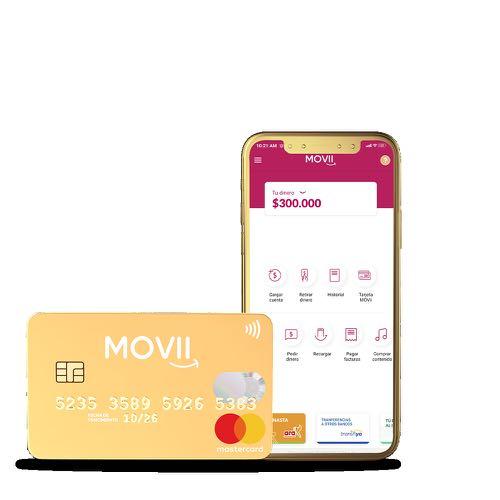
TO BE PART OF MOVII YOU ONLY NEED THE FOLLOWING:
MOVii | 127
Be part of the club that chooses to be in control, be part of the movement.

128 | FINTECH COMPANIES IN COLOMBIA ΙΙΙ
They are always working to carry their message of being the frst digital non-bank in the country, where day by day they build Colombia and allow their users to understand what they are:
A “non-bank”.
Their usability is designed for the user because all the products they launch have the objective of giving you one more alternative to make use of your money diferently each time.
They are a “non-bank” because their experience is free of charge so anyone can move and use their money as they please, without restrictions.
Difering from a traditional bank, they open the doors to foreigners, minors, those reported in credit bureaus, those who have no credit history, those who do not know how to use a card, and fnally, those who do not know how to buy on the Internet but want to do it for the frst time.
Additionally, they think, live, and feel diferently about what it means to achieve true fnancial inclusion in Colombia.
The App’s features promised to be, simple and easy to understand for all users, manageable, user-friendly, with a clear user experience, and as an additional perk, it allows users to use their money as their heart desires:
Send and receive money from and to the MOVii-App for free.
Transfer money to any other bank in real-time and at no cost through Transfya.
Recharge mobiles linked to any operator in the country.
Pay more than 7,000 active bill services agreements from your app.
MOVii Card: A reloadable MasterCard debit card with no handling fee or additional charges to pay in-store and on digital platforms or anywhere in the world.
Send domestic money orders to anyone in the country even if they do not have a digital account, this feature, allows you to send money to your grandmother, aunt, or even your friend, who only has to go to one of the affiliated commerces offered to claim the money.
To buy or donate an Ara “Market Basket” to someone, the person must claim their groceries directly at the Ara stores.
Purchase digital content such as Spotify, Xbox, PlayStation, and Netflix redeemable codes in-app.
Allows you to reload sportsbooks to always be on the scoreboard.
Pay merchants through “PSE”: Make secure online payments or purchases to bet onlinethe money is debited from your MOVii account without additional charges.
Transfers to any bank savings account, checking account, or electronic deposit account.
MOVii users can load their accounts from their cell phones to buy crypto assets. After selling their digital currency, they receive the money in their account and can use it easily in-app or from their debit card in any physical or digital commerce in the world. Send and receive international remittances to more than 100 countries where users see their money refected in a few hours.
MOVii is changing the landscape for thousands of users, because of its impact. Positively changing someone’s life through technological services, a free ofer model, and an easy-to-use app.
By 2022 they will continue their growth curve and their passion to know the needs of users. Based on these, they will continue to develop products that allow them to be more and more useful in their day-to-day life; thus allowing them to move their money digitally and empower them fnancially.
MOVii is working hard to enable merchants not only to pay but also to charge digitally and thus perfecting the payment ecosystem in the country.
To date, they have been in the country for 3 years, with 3.5 million users in the frst quarter of 2022 and thousands of reasons to keep working for all those people and businesses that are looking for an alternative to traditional banking.
To all of you: Welcome to MOVii, Your first non-bank.
MOVii | 129
Ejempolo de seguros integrados en un e-comerce
Financial products, so that any company can ofer them on its platform, without bureaucracy or complex confgurations.

empresarial 130 | FINTECH COMPANIES IN COLOMBIA ΙΙΙ
Grupo
COMPANIES CAN FIVE TIMES THEIR REVENUE PER CUSTOMER WITH EMBEDDED FINANCE


That’s right, you read that right. We’re talking about unlocking a market opportunity of $230 billion in revenue, in less than three years, according to estimates from investment fund Light-Year Capital.
Embedded fnance are fnancial services - such as credit and insurance - ofered by non-fnancial companies to facilitate or complement a purchase within the customer experience.
Imagine the insurance that an airline gives you when you buy a ticket, the purchase of a product that you can divide into installments within the same website or the home delivery app with which you pay without typing your card details - all this is embedded fnance!
A model with which financial institutions and companies collaborate to bring fnancial services to key moments and the most convenient places
NUBLOQ | 131
to be consumed, and in which customers live personalized experiences. In an increasingly connected and contextualized world, fnancial services are also taking a step away from the old ways:
Andreessen Horowitz, a U.S. venture capital frm, said embedded fnance could increase average profts per consumer fvefold.
And Nubloq, the Colombian fntech that makes it possible for any company to incorporate fnancial products, understood this and became the enabler that offers the simplest way for companies to integrate this value proposition to their end customer.

This initiative believes “in the power of fnancial products as a multiplier of possibilities and wellbeing for individuals and companies”, as stated by its CEO Federico Benítez.
This is why he is currently working with organizations such as SURA and A RUS, and the startups Enbanca and Juancho Te Presta, which have accelerated growth in Colombia.
Nubloq’s purpose is to generate greater access to fnancial products for companies and individuals,
and to achieve this it is changing the rules of the game in three ways:
Another look at costs: in the past, a company’s investment to acquire the necessary technological and financial capabilities was high.
Now, with initiatives such as Nubloq, integration is free and has a win-win model, since every time a company sells a fnancial product, both receive a commission.
Faster negotiations: in the past, agreements to integrate fnancial products were long and complex, because each company had to negotiate with the fnancial institution.
Now, standard agreements are available to organizations that save months of dealmaking. dealings.
No technical complexities: months of technological development are no longer required. Integrations are now so simple (via APIs or SCRIPTS) that a company can offer fnancial services in days.
132 | FINTECH COMPANIES IN COLOMBIA ΙΙΙ
Nubloq develops embedded fnance and open fnance in Latin America. Nubloq believes in the power of fnancial services as a multiplier of possibilities and welfare for individuals and companies.

NUBLOQ | 133
EMBEDDED FINANCE MAKES LIFE EASIER

Financial products provide specific solutions for people’s specifc needs and moments. For example, receiving the acceptance of a loan or taking out a policy to insure an important purchase are memorable situations for a user. The same happens with a savings alternative for the trip that is in mind or with the investment in the project of dreams.


The truth is that financial services make it possible to connect with people’s goals and enable both companies and fnancial institutions to integrate into the lives of customers.
These are some of the fnancial products that a company can integrate:
Let’s talk about integrated insurance, an option that allows customers to include a policy at the time of purchase. Some event companies, for example, already ofer the possibility of insuring concerts during the transaction.
Unlike other financial products, insurance is presented as a simple alternative, which does not require an exhaustive assessment of payment capacity and with which any user can get started in the fnancial world.
134 | FINTECH COMPANIES IN COLOMBIA ΙΙΙ

The incorporation of policies into a company’s value proposition can be done in two ways: as a complement to the purchase or as a feature of the product or service itself.
Some examples that people can take out on a day-to-day basis are the pet insurance ofered by pet store Laika, the SOAT sold by Rappi through its app, and the policy that automatically triggers Airbnb during a stay.
Thanks to the simplification provided by embedded finance, embedded insurance is integrated at the right time and as an efective response to a need, without friction and with
the greatest transparency and protection for the user.
Among the alternatives that any company can incorporate are protected card purchases, extended warranty, different health and life coverages, technology insurance, and customized solutions according to the consumer’s moment in life.
According to a report by InsTech London, the integrated insurance market is expected to grow to $722 billion by 2030, or more than six times its current size.

136 | FINTECH COMPANIES IN COLOMBIA ΙΙΙ
WHERE THE FUTURE LIES
Nubloq envisions a near future where thousands of companies will ofer fnancial products to their customers.
Technology, regulation and digital adoption are already here, and taking advantage of this context is a priority that companies will have to take on sooner rather than later in order not to lose competitiveness or lose customers.
And that is precisely Nubloq’s mission: to materialize the reality of embedded fnance and take advantage of the growth forecast for its market in Latin America, which will grow from US $7,495.9 million in 2022 to US $28,735.7 million in 2029.
Integrated finance is already among us and is here to stay. For this reason, Rafael Odreman, Head of Strategy and Alliances of the company, talks about the 5 questions he is asked the most about this revolution in the fnancial sector:



NUBLOQ | 137
SumUp supports entrepreneurs and small businesses around the world through simple and transparent fnancial products and services.


138 | FINTECH COMPANIES IN COLOMBIA ΙΙΙ
SUMUP:
BUILDING THE FIRST GLOBAL FINTECH ECOSYSTEM FOR LOCAL ENTREPRENEURS
Under the premise of innovation and inclusion, this Fintech company of German origin founded in 2012, arrived in Colombia seeking to transform the relationship between merchants and payment methods, to break down the barriers that stand in the way of their dreams. This is their story

ONCE UPON A TIME IN LONDON
Founded in 2012 by Daniel Klein and MarcAlexander Christ, SumUp started its operations
in the European payments market in response to a difficulty faced by small merchants and entrepreneurs, the high costs associated with accepting alternative payments to cash resulting from uncompetitive fees, as well as bureaucratic complications of acquiring these services.
With this objective in mind, SumUp set out to develop from scratch a proprietary payment ecosystem that could meet the needs of small business owners in terms of ease of use, agility in transactions and payments.
SUMUP | 139
“From the beginning of operations it was clear to us that our potential customers were facing a scenario in which the integration of their business with card or digital payment acceptance solutions represented more obstacles than benefts. Our goal since then and until now in all the markets where we have presence is to remove those obstacles and empower merchants to make their business more competitive” explained Toni Riera, General Manager of SumUp in Colombia.
With this mission on the horizon, SumUp’s growth in the European market, estimated at 120% year on year, allowed it to be recognized by the Inc. 5000 Annual Guide as the fastest growing company in the old continent.
This motivated the company’s entry into the Latin American Market in 2016, just 4 years after its foundation.
SumUp’s arrival in the Latin market began in Brazil, where it has positioned itself as one of the leading players in the market after the merger with Payleven, and advanced a year later in Chile, where it began operating with Banco Estado, with whom it built an alliance that would last until the second half of 2020, at which time
SumUp acquired the direct operation of the Chilean entity.
After a few years of operation in the two Latin American countries, SumUp understood that the problems of access to digital means of payment and financial inclusion in Latin America were even more marked than in the European market and therefore the market opportunity in the region became one of the most attractive at a global level.
COLOMBIA, FIRST LATIN AMERICAN COUNTRY TO BE LAUNCHED DIRECTLY
In 2020, SumUp begins its path towards the launch of its SumUp Air card reader in Colombia, a product with which the company has conquered multiple markets thanks to its security, practicality and competitive and transparent pricing scheme.

The company’s arrival on the South American continent was based on a simple but powerful premise: the European and Latin American markets are very different, but share similar structural problems that the company had already proven to be able to solve in the past, with the added bonus of being a market with much less consolidated players, which gave more room for growth. Colombia was no exception.
In the words of Toni Riera “the Colombian market in particular has enormous potential, not only in the delivery of solutions and services that address real problems of the people, but also in the possibility of addressing and closing the structural gaps in terms of access and use of alternative means of payment to cash in the region and the country, which limit economic growth and whose resolution implies enormous growth potential for disruptors who are willing to fght that battle. It is all about fnancial inclusion.
Behind this optimism is the idea that with access to the right tools, capabilities and solutions, Colombian merchants and entrepreneurs can be as competitive as their peers in other countries in the region and the world. A task to which
140 | FINTECH COMPANIES IN COLOMBIA ΙΙΙ
Toni Riera, Gerente General de SumUp en Colombia.
SumUp is fully committed globally and locally through the development of secure, accessible and convenient technological solutions.
With this in mind, SumUp managed to certify its product locally at the end of 2020, in the midst of a pandemic and with a team of 5 people working remotely around the same goal, to launch the frst product on the market in January 2021.

Today, a little more than a year after its arrival in the country, with a team that has grown rapidly after its frst year of operation, the results could
not be more positive. In line with its purpose, in the midst of an unprecedented health and economic crisis, and after a global boost following the closing of an investment round of €590 million in the frst half of 2021, the company has managed to put in the Colombian market more than 15 thousand card reader, building strategic alliances with relevant players in the ecosystem such as VISA, milestones that have allowed it to pave the way to become a fnancing company, which will allow it to ofer an even wider range of products and services designed for the everyday entrepreneur.
SUMUP | 141
“Our frst year in Colombia has been a success. In this short time we have not only boosted payment acceptance in more than 300 municipalities throughout the country, but we have also proven the potential of the Colombian market. We are excited to be working to soon be able to ofer our clients and all Colombian merchants a multi-product ecosystem that includes not only payment services but also deposits, savings and loans in order to continue contributing to fnancial inclusion in the country,” added Simón Pinilla, SumUp’s Growth Manager in Colombia, for whom “the future of SumUp in the country is optimistic”.
RIDING A UNICORN
Given the strength of its success and the speed of its growth around the world, it is easy to overlook the fact that SumUp has managed to create a global-scale technological, human and logistical operation in just under 10 years. This fact is not only evidence of its ability as a disruptive and market-dynamic company, but also of the innovative nature of its teams.
The key point, says Toni Riera, General Manager of the company, is an organizational culture based on three fundamental pillars: an agile approach to project development and problem solving, freedom for experimentation, innovation and risk taking, and a clear emphasis on people. “Ours is a culture of trust and empowerment, we seek that everyone in our team, regardless of position, area or level, can express their ideas, learn and ask questions so that we can materialize our projects from a pragmatic and fexible perspective. We promote human and genuine exchanges in which mistakes are opportunities for growth and points of support for innovation,” he explained.
Under this premise, today SumUp has managed to build a multidisciplinary team with presence in 34 countries and more than 3,000 employees globally. In Colombia, the company currently has 40 employees hired locally, a fgure that they expect to double in the next year as the company consolidates its presence in the national market as one of the best places to work in the country.
“At SumUp we develop fnancial and technological products that lead in the markets in which we operate. We hope that our company and our corporate culture can be the entry point for many young Colombians to enter the Fintech job market and set a standard for other players in the industry. With SumUp, our employees will be able to have the possibility to have a global impact, launch products using the latest development methodologies and be part of a diverse and multicultural team.” Commented Alejandro Pinzon, Operations Manager for SumUp in Colombia.

142 | FINTECH COMPANIES IN COLOMBIA ΙΙΙ
Simón Pinilla, Gerente de Crecimiento.
SUMUP’S COMMITMENT IS ALSO WITH THE PLANET
Innovation and disruption in the contemporary world, however, is not restricted only to an innovative business strategy and a talented and diverse team. A key aspect of this innovative culture also lies in the mechanisms that companies develop to harmonize their business practices with care for the environment and the paradigm of sustainable development.
SumUp is part of an exclusive club of companies that, to address this challenge, have decided to join the 1% for the planet initiative, through which it has committed to donate 1% of the annual net revenues generated in the European market by SumUp Solo devices to non-profit organizations and companies that offer important long-term environmental solutions. non-profit organizations and companies that offer important long-term environmental solutions.
“It is an initiative that allows us to creatively and efciently articulate the promoters of high-impact initiatives of priority interest to the environment with the resources they need to make their projects a reality. This approach to the problem allows us to connect with the problems of the communities in our markets and at the same time allow those who know the most about the subject to develop their projects freely,” explained Toni Riera.
According to the company, the resources collected through the initiative are earmarked for projects to prevent deforestation, combat climate change, renewable energy infrastructure, regenerative agriculture, among other projects that are often neglected by philanthropy around the world, especially those carried out by companies as part of their sustainability programs.
SumUp hopes, in the words of its General Manager in Colombia, that “the company’s decision to join will be an incentive for our peers in the industry and that we can work together for this cause”.

SUMUP | 143
“We are committed to providing you with transparency. Simulate how much you will receive per sale based on your business type and location in our rate calculator.”

144 | FINTECH COMPANIES IN COLOMBIA ΙΙΙ
In Colombia, SumUp currently has its AIR card reader, a compact and secure mobile card reader that connects directly to the cell phone to receive and monitor payments through the SumUp app.


SumUp expects to ofer in the medium term in the Colombian market:
Solo dataphone (no cell phone required), payment links, digital wallet, savings and credit products, inventory management, virtual store, among others.
Our ofer is based on 5 principles:
Accessibility: We deliver afordable products and services for any business or individual, with a competitive selling price, no leasing costs, transparent transaction fees and a free mobile application for transaction tracking.
Flexibility in choosing the deposit schedule, either daily (accelerated payments) or weekly (standard payments).
Quality: internationally and nationally certifed products of high quality, safety and reliability.
Experience: We deliver an intuitive and 100% online purchase process with fast shipping, immediate activation and account validation digitally and without the need for physical documents.
Reliability: We support Colombian businesses through a global operation with a presence in 34 countries around the world and more than 2,800 employees on three continents.
SUMUP | 145 PAGOS Datáfono Air Datáfono Solo Códigos QR Links de pago GESTIÓN DEL NEGOCIO Nómina Catálogo de Productos Sistema Punto de Venta (POS) E-commerce MANEJO DE DINERO Resumen de Pagos Ventas y Transacciones Depósitos y Transferencias Tarjeta Débito Avances de Pagos Microcréditos
Ecosistema SumUp
cliente:
Mediospararealizarpagos
Acuerdos depago
¡Bienvenido!
NúmerodeCédula







Autorizaaepikparaeltratamientodemisdatos personalesdeacuerdoconlapolíticadetratamiento dedatospersonales.AceptalosTérminosyCondicionesdeepik.
Solicitar





Cotizar
Datosdelacuenta

Ingresalosdatosdelacuentaquequieres inscribir
Tipodecuenta
Ahorros
Corriente Banco:Númerodecuenta:Silacuentatieneeldígito0alaizquierda, Bancolombia 0
PagosInscribcióndébitoautomáticoCuentadedesembolso Seleccionalacuentaquequieresinscribirpara débitoautomático

Otracuenta
Inscribeunacuentadiferente
Siguiente
An innovative model that makes it possible to deliver credits of up to 15 million in 5 minutes.
Somos facilitadores de los bancos, franquicias, comercios y personas para permitir que cumplan sus sueños.
Extractosy certificados
PagosInscribcióndébitoautomático Siguiente
2 5 7 9 1
Créditoycambio decondiciones
Extractosy certificados
Reutilización decrédito
PagosPorfavorseleciconalaopción
146 | FINTECH COMPANIES IN COLOMBIA ΙΙΙ
WE INNOVATE IN DIGITAL CREDIT MODELS AND COBRAND CARDS IN COLOMBIA AND CENTRAL AMERICA.
Créditos de consumo para personas naturales a través de alianzas con retailers administrando integralmente el modelo de negocio.
$172 MM USD
EPIK was founded in 2016 and currently has a presence in three Latin American countries.
It was born from the previous experience of its founding partners, who in their careers (Falabella, Codensa, Credivalores, among others) supported the origination of 1.5 million credit cards and administration of USD $750 million.
Currently they have two lines of business: Retail financing: They offer consumer loans to individuals through alliances with retailers, integrally managing the business model. In Central America, they ofer retail consumer loans
Administración de modelos de negocio en conjunto con bancos, retailers y franquicias, incluyendo la fuerza de ventas.
+280.000
using funding provided by commercial allies. In Colombia they operate under the “Epik Crédito” brand, in alliance with their financial partner Banco Popular. To date, they have managed USD $172 million in portfolio under this business model.
Commercialization of co-branded credit cards: They manage a commercial team that supports the sales process in the diferent channels and develops commercial strategies in conjunction with banks, retailers and franchises. In this model they have marketed more than 280 thousand cards in alliance with Mastercard, Banco Popular and Scotiabank (their most recent client).
Financiación en comercios
Administrados en cartera
Tarjetas de Crédito Marca Compartida Líneas de Negocio +500 Empleados 3 Países +6 Años de trayectoria 52% T.A.C.C. EBITDA
TDC comercializadas
EPIK | 147
EPIK
Fuerza de Ventas:
Contamos con un equipo de asesores comerciales para facilitar la adquisición de nuestro producto.

Riesgo de Crédito:
Nos apalancamos en Machine Learning y DeepLearning para construir modelos que permiten determinar el per fl de riesgo del cliente en línea, mediante un proceso 100% digital.

INITIAL MARKETS: COLOMBIA AND CENTRAL AMERICA

Tenemos una cultura orientada al logro y constantemente buscamos maximizar la satisfacción del cliente final a través de la
Epik begins its operation in Central America and Colombia because it is a region with a low level of banking penetration in credit products, so there is a great opportunity to provide access to these products to people who usually could not get it in traditional fnancial institutions through an easy, fast and secure application, which does not require paperwork or co-debtors.
basada en inteligencia artificial para la fábricas de crédito. Esta herramienta nos Adicionalmente, contamos con un Core amortizaciones, cobranza, entre otros).
 Usuario
Contraseña
¡Bienvenido!
Ingresa los datos a continuación
Ingresar
Olvide mi contraseña
Usuario
Contraseña
¡Bienvenido!
Ingresa los datos a continuación
Ingresar
Olvide mi contraseña
148 | FINTECH COMPANIES IN COLOMBIA ΙΙΙ
Epik BPM:
Software propio para la originación de créditos en línea con capacidad de conectarse a la POS.
Epik Core:


Software propio nativo en la nube y 100% digital que administra productos de crédito con capacidad de personalizar diferentes tipos de producto y modelos de negocio.



Nuestro Core es multiproducto, multicliente, multimoneda y multifondeador.
EPIK’S INNOVATION AND PROPRIETARY TECHNOLOGY



Epik has an achievement-oriented culture and constantly seeks to maximize end-customer satisfaction through technological innovation:
Epik has an achievement-oriented culture and constantly seeks to maximize end-customer satisfaction through technological innovation:
Additionally, they have a fnancial Core that allows managing the client’s life cycle from end to end using RPA (client creation, invoicing, issuance of account statements, application of collections, application of financial relief, amortizations, collections, among others). In addition, EPIK Core is multi-product, multi-client, multi-currency and multi-funding.




Crédito y cambio de condiciones Extractos y certificados Estado desembolso Pagos Reutilización de crédito Pagos Inscribción débito automático Siguiente Tipo de cuenta Datos de la cuenta Ingresa los datos de la cuenta que quieres inscribir Ahorros Corriente Banco: Número de cuenta: Si la cuenta tiene el dígito 0 a la izquierda, debes ingresarlo. Bancolombia 0 2 5 7 9 1 2 4 7
Pagos Link de pago Selecciona el valor que el lciente desea pagar Pago de cuota Pago total Escribe Valor a pagar: Enviar link Información de crédito y cambio de condiciones Cambio de plazo El plazo actual es de 12 meses. Selecciona el nuevo plazo de pago para Natalia Gómez Nueva cuota: 6 meses 12 meses Cambiar plazo 18 meses 24 meses 36 meses 48 meses $ 63.200 EPIK | 149
DONDE INICIAMOS
meses
DONDE ESTAMOS:
Contamos con comercios aliados donde originamos nuestro crédito como:




+ 20 Centros Comerciales

Estamos desarrollando una App donde el cliente fnal podrá solicitar y administrar su crédito sin necesidad de estar presencialmente en un punto de venta.

Desembolsos Diciembre 2022 Proyección a 5 años +$300.000 MM Cartera $928.000
MM
Cartera total Ventas mensuales Ticket promedio Tasa de Aprobación Plazo promedio 25.000 MM +53.000 MM 4’400.000 33
A DONDE VAMOS: 25%
En nuestros primeros meses hemos logrado:
THE GREAT COMPETITIVE ADVANTAGE
Epik integrates its trading skills with the use of proprietary technology to make risk decisions to ensure customer experience, minimize losses and integrate with any type of trade.
PARTNERSHIP WITH BANCO POPULAR
Banco Popular has been EPIK’s main fnancial ally for several years. With Epik Crédito they have started a new chapter with the Bank, where together they are developing the consumer credit model in retail, making use of the Bank’s funding capabilities and Epik’s integral credit management (sales, credit origination, Core banking and collections).
NEW FINANCIAL PARTNERS
Epik’s main financial ally in serving current markets is Banco Popular. To reach other markets and continue contributing to fnancial inclusion in the region, Epik will seek to diversify funding sources. For the Central American operation, they will replicate a business model similar to the one they have developed in Colombia, seeking diferent fnancial partners.

EPIK FIGURES
This year they project to reach $300 billion in disbursements and in 5 years they expect to have a portfolio of $2 trillion. portfolio of $2 billion.
This will be achieved through current and new allied businesses. Currently, they have alliances
Felipe Basto, Vice President of Operations and Finance
EPIK | 151
with Éxito, Compensar, Supermercados Euro, Panamericana and more than 27 shopping centers. The goal is to have more stores of this type and at the end of the year they will start with a 100% digital presence in a self-management App that they are developing.
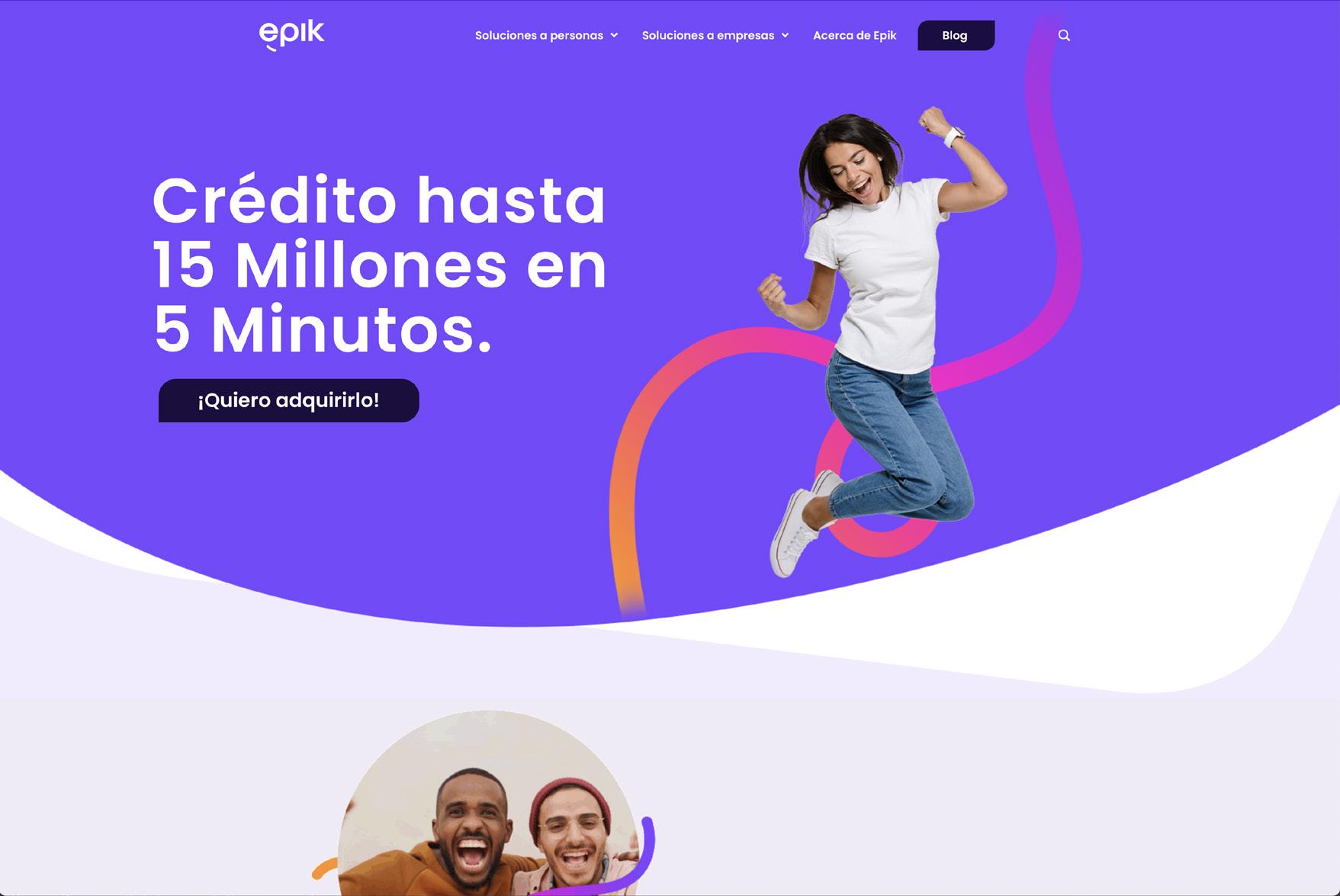

THE CUSTOMER AS A PRIORITY
At Epik, the priority is the customer and for this reason, they are dedicated to continuously improve their processes to ensure that they have the best product on the market.
They want to do away with the belief that access to credit is difcult, confusing, time-consuming or even misleading. At Epik, on the contrary, they stand for speed, simplicity, dynamism and transparency.
Therefore, the message is clear:
152 | FINTECH COMPANIES IN COLOMBIA ΙΙΙ
“Do you want an easy, fast and hassle-free credit? Smile, with Epik Credit everything is possible”.
Smile, in Epik Credit you will

We have more than 15 years of experience, making us experts in the mass marketing of fnancial products in Colombia and the region.
always find a Yes
EPIK | 153
Carlos Torres, President of Epik
We develop products and services that foster fnancial inclusion and access to credit for individuals and micro, small and medium-sized enterprises (MSMEs).

154 | FINTECH COMPANIES IN COLOMBIA ΙΙΙ
RAPICREDIT
LEADERS IN FINANCIAL INCLUSION IN THE COUNTRY
In 2014, the year in which RapiCredit was born, Colombia considered the need to further deepen financial inclusion in our country, understood as the possibility for an individual or social group to have access to formal fnancial products and make use of them, It is surprising, in a country with more than 25 fnancial entities, that more than 23 million Colombians have little or no access to credit. This situation traps them when the variables that mostly condition access
to credit are based on historical information to create the credit score, The emergence of Fintechs, as we will see below, incorporated alternative data into the financial ecosystem, for more Colombians to become potential credit consumers, allowing them to build their credit history and thus eliminate the information barrier to access other products in traditional banking or other industries that analyze their credit history.

RAPICREDIT | 155
Daniel Materón. RapiCredit CEO
Having said this, the result would then be that financial inclusion in Colombia would avoid accentuating the phenomena of exclusion and social inequality; it would avoid disconnection with the evolution of the world’s fnancial systems, in addition to preventing individuals from being subject to informal/criminal structures, which are developed with resources from illicit activities, as the only possibility to access credit. The emergence of the Lending Fintech industry in Colombia, as well as other verticals, has managed to correct socioeconomic imperfections in the market, originated by the economic regulation of the traditional financial industry, which responded very well to past conditions, but fails to respond when scenarios of increasing poverty and inequality are accentuated, or when fnancial models evolve basing their proposal on digitalization and technology. Even today, greater state dynamics are required to help guarantee access to financial services for the most vulnerable segments of the population, through regulation and the generation of incentives for the efcient provision of this type of services. The issue of inclusion is then achieved with the confuence of three variables: supply, demand and regulation. As a note of clarifcation, it is important to understand that the approaches to credit as a solution within the purpose of fnancial inclusion are not intended to limit the
multidimensionality of the phenomenon of exclusion and inequality; we simply believe that credit contributes to and has a strong impact on other aspects that make it up, mitigating or eliminating them. Access to credit for education and housing, for example, reduces two elements that have a profound impact on inequality and exclusion such as quality of life and the future, and allows individuals not to be excluded from the basics that a civilized society should ofer.
RapiCredit was born as a solution to a problem: Financial inclusion. From its birth in 2014 to the present, the organization has been developing along with the boom that represents the Fintech industry both in Colombia and the world. Its results at the end of 2021 refect an understanding of the social levels it serves (strata 2,3 and 4), the development of new business capabilities and the leveraging of the same digital evolution supported by other industry verticals, as we will see below. By the year 2021, and taking into account the impact of the pandemic in the previous year, 2022, in December we were able to reach two million credits placed on the populations served. More than $265 billion were injected into the economy, generating taxes, jobs and, most importantly, solving the needs of the population without access to credit, a large part of which did not originate from the illicit resources
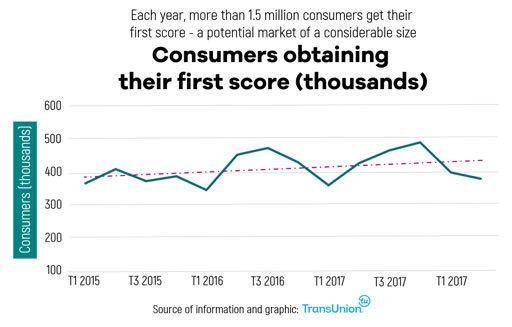
156 | FINTECH COMPANIES IN COLOMBIA ΙΙΙ
Source of information and graphic:
of crime. What took us 7 years from the start of operations in 2014, we will accomplish again in the next 14 months and by 2025 our plan is to reach more than 2.5 MM credits in diferent products for our clients.
We want to highlight the impact and solutions that RapiCredit as a team achieved in 2020 as a result of the impact of the pandemic. The onset of COVID 19 raised a number of questions and challenges. Our approach was: To preserve the operation of the company given our responsibility to society, shareholders, suppliers and allies; to preserve jobs, and to understand that this time would become an opportunity to be more solid, for which we would have to work with discipline and focus. It must be understood that being digital does not mean that technology is fundamental. Digital organizations are based on knowledge and knowledge is provided by people. In fact, knowledge, when produced in aggregate, leads to innovation and innovation leads to permanence over time. The processes of learning and awareness of culture and philosophical approach to business are achieved over time and those of us who were part of RapiCredit have the ability to solve the new unknowns that came with the pandemic. We were certain to cross the juncture and we had to
do it with the people with whom we had come to achieve the successes of 2019. The result was as expected. The decision models were adapted to originate with the new economic variables left by COVID. New products were developed and information systems were strengthened to provide payment options. Everything came together to withstand the efects of the incoming lookdowns. Debt repayment relief was structured and the objective of preserving our clients, and providing options for repayment, worked. By October 2020 we were already originating at pre-pandemic levels. The results of non-performing loans (NPLs) showed better results than before the onset of COVID. RapiCredit was the frst credit Fintech to recover its origination and to achieve positive results once again in its fnancial statements. The key was the coordinated work of the management team, shareholders, suppliers and funders. Keeping all stakeholders informed of daily events was essential. We all knew what was happening. We were all informed of the actions and results. In the midst of all the complexities of this time, the organization matured in business situations that would surely have taken years to experience, and that knowledge has pervaded our people.

RAPICREDIT | 157
Graph of the historical evolution in placement and projections to 2025
THE NEXT ISSUES TO BE SOLVED Regulation
In the creation of the Fintech sector, the basis for the rules of its initial operations was established by the trade organization. The association that brings together the new players sought to meet the following key objectives for the future of the sector: to promote the ethical behavior of players, to generate a culture of responsible entrepreneurship, to foster understanding

between state policies and new business developments, to promote practices for good corporate governance, to guide the actions of its members towards the protection of new fnancial consumers, and fnally, not being the only ones, to articulate its members with government agencies for the development of the specific regulatory framework for the industry.
The regulatory problem between the new operators in the fnancial industry (Fintech) and the traditional ones, arises from the intention to apply regulations that do not ft neither for new nor for traditional companies, situations

158 | FINTECH COMPANIES IN COLOMBIA ΙΙΙ
of regulatory asymmetry between players, and the understanding of new fnancial products/ companies that did not exist when the regulation was created. Therefore, in the immediate future, eforts should be focused on overcoming the lack of adaptation or creation of new operating rules that promote innovation, protecting the risk of new business development and, fundamentally, promoting compliance with public policies of inclusion and social development.
Transparency and regulation are highly necessary to overcome the challenges brought about by the digital transformation, but care must be taken to maintain the balance so as not to generate delays, discourage domestic and foreign investment, or worse, block the purpose of inclusion.
Laws must interpret the new environment and translate into appropriate regulatory frameworks and supervisory practices to achieve orderly development and ensure the stability of the fnancial system, understood as users + traditional fnancial players + new fntech players; and facilitate the safe entry of new products and players.
Regional expansion
When creating a social impact opportunity such as fnancial inclusion through digital credit, it is necessary to think about the geographies where this solution can also produce the same impact. RapiCredit has understood this and sees an opportunity to develop the digital credit model in LATAM. Let us recall that, in 2015, the World Bank set objectives to increase fnancial inclusion for the world’s unbanked population, with the idea that in 5 years global fnancial access would be achieved. This result was not achieved and although improvements were made, the percentage of adults worldwide without access to fnancial services is approximately 1.7 billion people.
Our next focus will be the opening of regional operations, where the technology we develop, the decision models provided with AI algorithms and new sources of non-traditional query data, the collection strategy with flexible products to support the payment of obligations, the understanding of the profle of the executives that must make up an organization, growth strategies based on the control of digital marketing tools, a structured source of resources

RAPICREDIT | 159
for the granting of loans, the set of products that must be designed based on the specific needs of the population, and an evaluation of the most appropriate regulations for the start of operations, will be the key to success in this next step.
Integration with the ecosystem
RapiCredit understands the Lending operation as part of the digital ecosystem and integrated

with it. The structuring of the industry based on verticals does not mean that the service and the provision of solutions to the needs of consumers is unbundled from the customer experience. This would be the same as if the user had to buy a separate internet data plan when purchasing a cellphone, or any of the components that make the phone work as expected.
The Fintech digital ecosystem will involve acquisition or integration with other verticals to
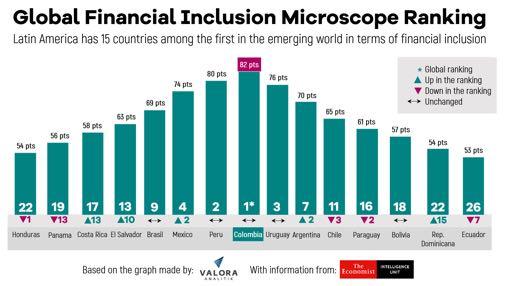
160 | FINTECH COMPANIES IN COLOMBIA ΙΙΙ
meet consumer needs on an ongoing basis. It is enough to observe the current trends where payment gateways are naturally integrated with e-commerce, which in turn are integrated with traditional payment systems and offer as an alternative access to new payment systems offered by new Fintech companies. Another example could be the Open Banking model, which seeks the exchange of public, aggregated and transactional information from
fnancial institutions (and other participants in the fnancial system), as well as from users, in order to promote greater competition among intermediaries and the offering of products and services tailored to users. In other words, I, the user, own my information and authorize its use so that fnancial service providers can make decisions with that information or build products to fulfll it.
CONCLUSIONS
As a corollary, and leaving aside all-important aspects for the understanding of the success of the Fintech industry, and especially in this section related to Rapi Credit, we consider it important to at least state the following conclusions:

Financial inclusion is a way to reduce social gaps and poverty.
The technological and digital revolution are enablers of other important elements to reduce poverty and social gaps. Technology and digitalization can change life in developing countries if governments actively and specifcally promote the use of these tools for education, health, insurance and in general to give 100% of the population access to what they have not had so far.
The regulatory framework for the Fintech industry and for other industries that
develop by making use of the capabilities enabled by technology and digitalization, will be key to produce the desired positive impact, maintain the stimulus to innovation and business development, create clear operating rules for new players and domestic and foreign investors, and above all, to avoid the disconnect of the country with the development occurring in the rest of the world.
The consumer, today more than ever, must be treated and understood as the subject influenced by this technology, so the conditions of education, protection and encouragement for approaching these new developments will be a fundamental responsibility to move successfully into the future.
RAPICREDIT | 161
Helping Fintechs and Banks create memorable experiences









162 | FINTECH COMPANIES IN COLOMBIA ΙΙΙ
DIGITAL-FIRST:

Simply being digital is no longer necessarily synonymous with being disruptive. Although digitization offers a first approach, the real revolution lies in optimizing the banking customer experience. Fintechs capable of ofering their users intuitive, personalized, frictionless andabove all - (hyper)secure digital experiences will be the ones that position themselves one step ahead of the competition.
Put another way, merely being digital without putting the customer right at the center of the strategy is like aspiring to drive a rudder without wheels-you guessed correctly: in the midst of this extended analogy, CX is indeed the engine that drives this important industry.
INFOBIP | 163
A SOIL THAT WILL NOT BE FERTILE WITHOUT A FLUID, PERSONALIZED CX READY TO FLOURISH.
INQUIRING ABOUT THE IMPACT OF CX WITHIN THE FINTECH INDUSTRY IN COLOMBIA
After conducting two detailed studies commissioned by Infobip from the consulting frm Frost & Sullivan, we were able to take a close look at both sides of the coin:
Colombian fnancial clients’ perception of the impact of the CX obtained
Did you know that 6 out of 10 Latin Americans would be willing to change fnancial institutions in search of better service? That’s right, today’s people no longer swallow whole -a statement that, if you think about it, applies to any feld. In fact, it is estimated that bank customers are up to 80% more likely to switch banks in order to fnd one capable of putting their experience at the center of its strategy.
When studying the panorama in Colombia, the fgures seem to point to the same thing: users are expecting to obtain end-to-end experiences of immeasurable quality. Once the country’s banking customers were questioned about the degree of relevance or importance that, for them, customer experience (CX) has on
the image they have of fnancial institutions, it was established that a massive 70% consider that -in efect- its impact is highly signifcant. Unfortunately, when this same question was asked to Colombian institutions, the answers seemed to be the opposite, resulting in a negative and contradictory gap of perceptions.
The perception of Colombian financial institutions regarding the impact of the CX ofered
The following fgures alone reveal the implicit irony behind an industry that is still unaware of the full potential hidden behind the optimization of the digital customer experience.
When fnancial institutions in the tricolor country were asked how important they considered CX to the growth and reputation of their business, only 47% considered it to have a signifcant impact and, even more alarmingly, a considerable 13% did not consider it to be important at all. The conclusion? Customers expect more than many of their fnancial institutions are willing to ofer. The result? Negative gaps leading to increased customer dissatisfaction rates and, consequently, churn rates. Negative perception gaps between fnancial institutions and their customers.
164 | FINTECH COMPANIES IN COLOMBIA ΙΙΙ



INFOBIP | 165
IT IS A FACT, TODAY’S CUSTOMERS DEMAND BETTER EXPERIENCES, BUT HOW TO OFFER THEM?
A quantitative and qualitative research-driven, data-driven approach - based on the wellfounded idea that information is power - is the frst step when it comes to designing seamless end-to-end customer journeys. In other words, understanding the specific needs of users, their points of friction, desires and daily motivations makes it possible to design customer experiences that are more contextualized, tailored, personalized and, therefore, efective. For this reason, it is important to draw the current landscape in order to know how to color between the lines of the future. Thus, the following factors must be considered:
1. What fricts the financial customer experience.
of Latin Americans consider that the service they receive from their fnancial institutions is not good.
believe that banks and Fintechs are unable to solve their problems or concerns completely.
believe that fnancial institutions do not care enough about their clients.
is the average number of poor interactions that today’s customers are willing to endure before deciding to switch institutions.
2. Customer demographics
Knowing how to communicate with customers through their preferred channels is an art and omnichannel is the brush that brings magic to life. Here are some statistics not to lose sight of as far as the Latin American Fintech universe is concerned:
of Generation X prefers to interact through live chats.
of Millennials prefer to communicate through messaging apps.
of Generation Z are inclined to interact through the use of social networks.
It is worth noting that people’s demographic profle will not only determine which channel is the most efective to interact with each one, but will also alter their scale of priorities regarding their demands and what they expect to get from Fintechs
Just to give an example, obtaining “good customer service” -automated and frictionless- is a priority among a considerable percentage of Baby Boomers (26%), Millennials (20%) and Generation Z (25%).
3. Understand what everyone understands by “good customer service”.
The meaning of these four words may vary from person to person, based on the universal law that governs the human race: subjectivity. Therefore, only by fully understanding what fnancial clients understand by good service or customer experience, will it be possible to satisfy their desires and demands.
Here is some data to highlight regarding Latin American customers’ perception of the factors that, for them, enhance their service, their experience and -ultimately- their satisfaction:
56% 62%
166 | FINTECH COMPANIES IN COLOMBIA ΙΙΙ
50%
58% 56% 52% 3%
43% 36%
demand self-service solutions that encourage quick self-management and resolution of problems and concerns.
want to be able to interact through digital channels.
AUTOMATION: the ally that every Fintech should have on its side
Did you think that process automation was only for improving and speeding up support or customer service processes? Perhaps it is time to rethink this limiting notion. Although the use of intelligent agents or keyword or natural language processing (NLP) chatbots does indeed enable more agile processes - it is estimated that banking chatbots are capable of reducing customer interaction time to 4 minutes - automation can go much further!
Through automation, many Fintechs manage essential factors such as the following in a measurable and scalable way:
Cost reduction: by automating those tasks that are too repetitive, it is possible to manage them in less time and, therefore, reduce what is known as the headcount (a term that, like many others, translates into money).
Personalization of communications to increase their effectiveness: through automation, it is possible to understand in greater detail the characteristics and preferences of each user, thus being able to offer them more personalized and contextualized communications that appeal to their specifc needs and requirements.

Improvement of the overall customer experience: by being able to obtain faster, simpler, more fluid, personalized and personalized experiences that invite autonomy or - in other words - selfmanagement of their doubts, inconveniences or cases, customer satisfaction will increase proportionally.
Identity verifcation: how complex or simple and seamless it is to register or verify identity

INFOBIP | 167
will largely depend on customer satisfaction. Therefore, thinking of alternatives that facilitate user identity verifcation -e.g. 2FA or Mobile Identity- will be essential to generate trust in people and, at the same time, provide a frictionless and smooth experience.
Remember: security is important, yes, but ensuring it doesn’t have to afect the customer experience.
IT’S NOT ENOUGH TO BE DIGITAL IF YOU’RE NOT WILLING TO GO THE EXTRA MILE
Today, the term ‘Fintech’ is one of the most talked-about terms in the finance industry. However, it is undeniable that the term has been miscoined and, sometimes, used lightly by more than one person. At the end of the day, it’s not just about having a banking app and that’s it, right?
Today, fnancial technology is turning the way marketers operate upside down as they seek to accelerate and adopt new, truly customerfocused strategies. By joining the digital transformation, financial institutions are
looking to, among other things, improve their engagement and customer experience.
Improve their engagement and customer experience - according to their particularities - in order to increase customer satisfaction. In this sense, Fintechs ofer the potential to alter all aspects of the banking and fnancial sector through the adoption of a wide range of new digital technologies.

WHAT TODAY’S FINTECHS SHOULD BRING TO THE TABLE
In addition to offering greater agility in transactional terms, due to the particularities of their business model, Fintechs have the capacity or potential to provide a datadriven approach, which is in turn oriented to understanding the banking customer and from there to give life to efective strategies.
Additionally, digital platforms allow to extract key behavioral clues that users themselves throw within their navigation or digital trail , in order to fnd the magic formula that seeks to satisfy all their needs and expectations to the fullest.
168 | FINTECH COMPANIES IN COLOMBIA ΙΙΙ
INFOBIP, ON THE RADAR OF INDUSTRY AROUND THE WORLD
With +700 direct carrier connections , coupled with its global and regional presence, Infobip has positioned itself as the best-connected cloud communications platform in the world. Thus, its Croatian origins and its mission to create better and more robust digital communications bridges between businesses and their customers are the driving force behind all its eforts.
When it comes to the fnancial industry, they know that their experience and success stories are the perfect combination to enable institutions to go one step further by delivering best-in-class omnichannel experiences.
In addition, its security solutions are what the industry is clamoring for in order to scare away the criminals that now increasingly haunt the complex virtual universe. Infobip frmly believes that by adopting new technologies and solutions such as Moments , its omnichannel marketing automation and customer engagement center in the cloud, financial institutions will be able to better understand what motivates customers and what are the frictions within their experience in order to adapt it assertively and, at the same time, predict what fnancial products and services one user or another might require, need or want. This solution allows, among other things, to automate banking customer journeys and interactions with customers in a personalized and more assertive way.
Likewise, Answers , its chatbot development platform, is the missing piece in the fnancial customer service puzzle. It offers seamless handofs from virtual assistants to experienced physical agents where - thanks to unified databases and omnichannel historiescustomers can avoid having to repeat the same information over and over again to different agents, falling prey to harmful data silos that will end up hindering their experience.
Finally, Conversations , your cloud contact center promises not only to enable better CX but also to streamline and reduce costs within internal fnancial processes.

INFOBIP | 169
Infobip knows that customer experience is a science that requires having the right tools at hand. They understand that the equation is not complete without an omnichannel customer experience that is up to the challenge that comes with competing in a sea awash with fsh and Fintechs.
Verify, evaluate and onboard new customers in no time.


Verifca, evalua e incorpora nuevos clientes en un abrir y cerrar de ojos

170 | FINTECH COMPANIES IN COLOMBIA ΙΙΙ
THE MOST FLEXIBLE WAY TO DO THIS IS CALLED METAMAP
La Forma Más Flexible De Hacerlo Se Llama
Nadie tiene una bola de cristal para conocer la vida de una persona o sus verdaderas intenciones, pero sí existe una empresa dedicada al desarrollo de software que tiene a la mano el score de datos de la población, cuando se trata de un relacionamiento fnanciero. Hablamos de MetaMap, la compañía que le dio vida a un nuevo tipo de mapa en el que queremos vivir, en términos de inversión.
No one has a crystal ball to know the life of a person or their true intentions, but there is a company dedicated to the development of software that has at hand the data score of the population, when it comes to a financial relationship. We are talking about MetaMap, the company that gave life to a new type of map in which we want to live, in terms of investment.

As users, we want privacy guarantees, controlling who sees our merits; on the other hand, we expect a meritocratic scenario, where true and relevant attributes are recognized. What is
certain is that MetaMap broke paradigms about human attributes and their one-dimensional scores, such as FICO, SAT or IQ scores, which for decades have driven important interactions with fnancial, education and even employment services. These, however, are limited in scope as they only capture information on a small minority of people in the world. MetaMap is determined to go further with a revamped system of one-dimensional scores and two-dimensional maps, with the intention of capturing a larger community and providing more opportunities for the world’s citizens.
Como usuarios, queremos garantías sobre la privacidad, controlando quién o quienes ven nuestros méritos; por otro lado, esperamos contar con un escenario meritocrático, en el que se reconozcan los atributos verdaderos y relevantes. Lo cierto es que MetaMap rompió los paradigmas sobre los atributos humanos y sus puntuaciones unidimensionales, como la puntuación FICO, SAT o CI, que durante décadas han impulsado importantes interacciones con servicios fnancieros, educación e incluso de empleo. Estos, tienen un alcance limitado ya que sólo captan la información de una pequeña minoría de personas en el mundo. MetaMap está decidida a ir más allá con un sistema renovado de puntuaciones unidimensionales y mapas bidimensionales, con la intención de captar una mayor comunidad y dar más oportunidades para los ciudadanos del mundo.
METAMAP | 171
METAMAP | 171
Promesa Sin Fronteras En Un Mundo Sin Fronteras
A NEED THAT FOUND AN ANSWER
MetaMap was founded in 2017 in San Francisco, USA. Some time before, Filip Victor, CEO & Cofounder, arrives in North America with the idea of making a positive contribution to society and demonstrating that he is a person with all the fnancial capabilities to invest and work. However, the reality was diferent. He was denied access to bank accounts, apartment rent and other services because he did not have a historical record in the United States. Since then, the idea of parameterizing everything that makes up a person’s reputation in the global environment has gained momentum. The MetaMap team,
formerly known as Mati, began the arduous task of fnding more sources of information and data that form a person’s profle.
“Not everyone has a creditscore, but there are many, many other ways to prove that a person is worthy of a fnancial company lending them money or giving them a card. What we do is map people and establish a network to make it easier for everyone to fnd each other,” says Santiago Bolivar, Head of Acquisition Marketing at MetaMap.

menciona antiago olívar, Head of cquisition Mar eting en MetaMap.
industria bancaria y fnanciera son sectores muy comple os en cuanto a la relación con el cliente. enfrentan constantemente a una serie de riesgos en relación con la verifcación de identidad lavado de dinero, entre otros. obstante, el mundo futuro de los datos de identidad estructurados es un mundo que MetaMap sin fronteras . Las fronteras físicas entre los países, así como las fronteras digitales entre en línea, se convierten en portales sin fsuras.
EMPRESAS FINTECH EN COLOMBIA ΙΙΙ 172 | FINTECH COMPANIES IN COLOMBIA ΙΙΙ
THE PROMISE WITHOUT BORDERS IN A WORLD WITHOUT BORDERS
The banking and financial industry is a very complex sector in terms of customer relations. customer relationship. They constantly face a number of risks related to identity verifcation and money laundering, among others.
However, the future world of structured identity data is a world that MetaMap calls “borderless”. Physical boundaries between countries, as well as digital boundaries between online services, become seamless portals.

We are well aware that the Latin American market has found it necessary to develop and implement systems and processes to prevent money laundering in its fnancial ecosystems. However, the digitalization of these processes is unevenly applied. In addition to the real problem of money laundering, today, digital fraud joins the list of problems to be regulated. For its part, the region has tried to adopt international standards recommended by the Financial Action Task Force (FATF).
Action Task Force (FATF), or local regulatory frameworks, with varying degrees of success.
However, a common denominator in Latin America is the lack of interoperability between the diferent fnancial sector regulations. The truth is that Fintech regulation is not aligned with LDP regulation, and in turn, LDP regulation is contrary to tax regulation. For regulated entities, this represents a regulatory burden that translates into a barrier to entry for new players, in addition to a lack of competitive ofer in fnancial services and a lag in innovation.
That said, we see several eforts towards the homologation of the sector according to each country. This is how MetaMap turns barriers into portals. Therefore, they create “metamaps”, being ideal navigation tools that unlock borderless access to billions of people in need of service providers.
MetaMap manages an extensive portfolio, backed by more than 250 people, which continues to grow, experts in human resources recruitment, cryptos, exchange, neobanks, and more sectors and industries. Its products are categorized by one of the company’s key words, merits:
METAMAP | 173
COMPLIANCE MERIT BLOCKS
Identity document fraud detection: Verifying that the user’s identity document is valid, belongs to the user and is trustworthy.
AML Watch List: Fully compliant with local fnancial regulators.
Biometric verification: Checking that a user’s photo matches validated sources and passes video life verifcation.
Email verifcation: Verifying that the user is the owner of an email, and if there is a risk of fraud associated with that email.
Government Data: Verifying that the data submitted by your users matches official government records.
Telephone verifcation: Verifying that the user is the owner of a telephone number, and whether there is a risk of fraud associated with that number.
Electronic signature: Digitally signing legal documents with biometrically verifed users.
Device verification: Complementing cybersecurity eforts and stopping account fraud.
Location intelligence: Personalizing and geo-targeting business ofers and services based on users’ location in the world at the country, state and zip code level.
Custom Document: Verifying that the document or images uploaded by a user match the custom document template.
User login: Creating a verifcation habit for some users. Especially as the user base grows.
Custom watch lists: Checking if users match a custom list of people to approve, reject or review.
Custom input: Creating custom fields to manage user input as part of the metamap.
Facial analysis: Comparing images of faces from diferent sources to verify that the faces belong to the same person.
Face ID access: Conveniently authenticating an existing user with a face selfe.
FINANCIAL MERIT BLOCKS
Credit check: Assessing loan applicants’ ability and intention to repay and ofering instant loan experiences to customers.
Work account data: Allowing users to connect their work account from independent platforms (such as Rappi) or traditional companies to verify their employment and income.
Banking data: Instantly verifying users’ fnancial capabilities.
Payroll data (coming soon): Allowing users to connect their payroll account data to verify their employment and income.
MERIT BLOCKS FOR WORK AND RECRUITMENT
Judicial records: The choice of people to join the platform or organizations can be one of the most important and risky decisions. MetaMap helps mitigate these risks by enabling criminal and other legal checks on potential workers by accessing local government databases in several countries.
Bank account verifcation (coming soon): Bank account verifcation gives peace of mind that money is being paid into the correct account and avoids situations where the wrong account is credited.
Asset verification (coming soon): Asset verifcation can ensure that assets used on the platform, such as cars and motorcycles, are of the right quality.
“We are like a human atlas that allows us to discover the world of other people we don’t know, and what we can ofer others based on our merits. Normally most online interactions revolve around simple products and gadgets, we believe that the future of the Internet, which we are helping to build, will be much more human.”
THE ORIGIN OF THE NEW VISION
Since its founding as Mati, the company was very clear that it adopted a Greek name that represents an amulet to protect people from harm. Mati always worked to help online merchants and fght against electronic fraud, before publicly proclaiming itself to be the next VISA. But aspirations, shared with Filip’s desire to help, led the company to broaden the scope of the brand to encapsulate the largest service ofering to consumer and business customers. From there, the name MetaMap was born. The prefx meta comes from the word “beyond,” so MetaMap means a map beyond other maps. It also comes from the popular concept of metaverse, the new generation of the Internet
with open data, interoperable parts and virtual presence.
Companies that are expanding with MetaMap in Colombia and the world

Reizen
It is a car rental company between individuals without driver better known as “carsharing”, it is a peer-to-peer rental unique with this model in Colombia and Latin America.
They started working with MetaMap approximately in June 2021, the main problem was the limitation with its internal security system because the way it was managed only allowed them to meet and verify customers with Colombian nationality, and they wanted to expand.
During this time of negotiations, Reizen tried to solve the problem and cover the risks to a proportionally lesser extent through the Colombian company Experian Datacredito, but at a higher cost.
METAMAP | 175
Quantitative results
The client-user margin has increased by 24% because, due to its global coverage, it can now ofer its services to people all over the world. Due to their lower cost, they optimized operating costs by 3%, which improved their proftability. The fraud attempt rate has been reduced by 9%, and according to satisfaction surveys, the trust and user experience index has improved by 16%.
Qualitative Results
Reizen had a positive impact on end users because they now have a more intuitive and agile verifcation process for their customers, a greater context of information that allows them to make better decisions, a more accurate result and feedback to both the company and the customer, a higher rate of trust from their users and customers.
Binance
Improving the user experience during account creation, achieving compliance with local regulations for fat connections.
Creditas
Reducing its loan default rate by more than 50%.
Bitcoin Market
Reducing their manual review rate, resulting in the length of their account creation process improving their conversions.
MetaMap solves all fraud, digital identity and compliance needs. From government databases to targeted checks and watch lists, extracting and making sense of user data for easy use.

176 | FINTECH COMPANIES IN COLOMBIA ΙΙΙ
COLOMBIA SAYS YES TO METAMAP
To date, the company has completed 417,000 successful verifcations in Colombia, representing about 1% of the population, completing the verifcation process in two minutes per person. But this is only the beginning. MetaMap can read all the following data about the Colombian population: document number, date of issue, place of issue, age range, full name, middle name, first name, last name, middle name, gender, presence of criminal record, NIT, tax status, bank account count, commercial industry debt count, fnancial industry debt count, savings account, solidarity industry debt count, service industry debt count.
AN ATLAS THAT DISCOVERED AND GOT TO KNOW THE WORLD OF DATA
MetaMap is clear that it has developed a portfolio that truly allows you to discover and learn about the world of everyone, even those who previously had no fnancial involvement. All this is ofered to others based primarily on their merits and aspirations.
For MetaMap there are two indispensable properties to build the real atlas:
Privacy, to be able to control who sees our merits.
Meritocracy, so that only true and relevant attributes are recognized
“Going forward, I believe infnitely in the power of MetaMap and our vision to put users on the digital map, making them visible perhaps for the frst time. The opportunities are endless, and I look forward to iterating our product, adding many more benefits to our platform, and ultimately helping an increasingly diverse set of people do business without borders,” confrms Filip Victor.
reputation
HOW TO INTEGRATE METAMAP
There are three ways to integrate MetaMap, regardless of the niche or core business:
With the MetaMap API. By creating custom fows and building your own UX. The collected information is sent to MetaMap and its validity is verifed in seconds.
With web or mobile SDK. Creating custom flows, using a pre-built UX. Copying a few lines of code provided in the dashboard and pasting them into the application or website.
Direct linking (no code). Creating custom fows, using a pre-built UX. Customers just copy the link provided in the control panel and share it via email, SMS or WhatsApp.
A PARTNER WITH A NAME OF ITS OWN
The time has come to unleash borderless growth. Thanks to metamaps, everyone can generate customizable trust flows that allow service providers to reach more customers. MetaMap is the piece of your infrastructure that lets you know you are working with people you trust. If we had to defne the company in three words, we can safely say that MetaMap means: trust, fexibility and compliance.
Come for complience, stay for the future of the online
METAMAP | 177
The strategic ally that will drive your company’s growth with a large portfolio of fnancial solutions.


178 | FINTECH COMPANIES IN COLOMBIA ΙΙΙ
LATAM TRADE CAPITAL: THE FINANCIAL
ALLY OF COMPANIES
Facilitating access to fnancing for Latin American companies is one of the main challenges Latam Trade Capital has set itself. Since its creation more than 15 years ago, this company has accompanied entrepreneurs in Chile, Colombia and Peru with products designed to improve their liquidity, such as factoring, confirming, international factoring, franchising, strategic business, among others.
Latam Trade Capital was born from the merger of Latam Factors in Chile, a major player in assetbased financing, with a U.S.-based company specializing in trade fnance.
In 2019 they entered the Colombian market through GFO, the largest non-bank factoring
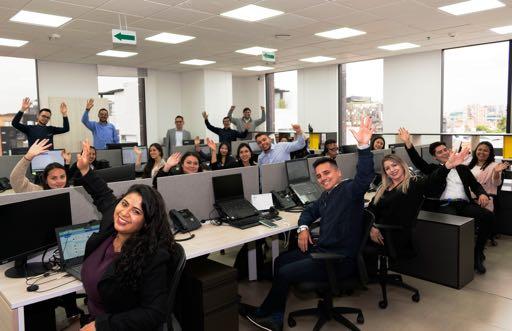
company in the country, which was born more than 20 years ago in Cali. Since then they continue to bet on boosting SMEs and large companies in the country with unique products that adapt to their needs. “
Our technological and fnancial solutions have been oriented to support growth and meet the challenges faced by SMEs, which are not efficiently served by traditional Colombian banking products. We have incorporated solutions for corporate and other financial companies with flexible, stable and scalable resources and processes that strengthen the growth of our clients”, says Johanna Montes de Oca, its Country Manager.
LATAM TRADE CAPITAL | 179
SOLUTIONS that ft particular needs
Latam Trade Capital’s main priority is to be the fnancial ally of businessmen, since in addition to ofering them a broad portfolio of solutions that adapt to their needs, it establishes a continuous financing quota that allows them to leverage their operation in future negotiations.
Innovation in fnancial services has been a pillar as a business generator for this company that seeks to diferentiate itself from the solutions ofered by traditional banking. The development of strategic solutions has leveraged the growth of large companies in the corporate segment, providing a constant flow of resources by establishing an agreement to discount invoices in the future, within a solution called strategic alliances. In addition, they are seeking to support the export sector, so they launched a specialized product called international factoring, which seeks to leverage the exports of businessmen in the Latin American region.
Latam Trade Capital’s added value for the Latin American market
The possibility of being able to access fnancing without increasing debt levels has become a necessity for business fnances today. With the high volatility of the fnancial market and recurring interest rate hikes, obtaining a constant flow of resources is becoming increasingly difcult. So financing solutions that move away from traditional credit have become quite relevant, and that is where this company comes in.
“We are a solutions provider, not just a product provider. Products are tools used to deliver comprehensive solutions to our clients, with whom we partner to identify problems and customize solutions for them.” Oswaldo Sandoval, CEO Latam Trade Capital.
Among the services offered to its clients, there are both economic and non-economic benefts that facilitate the operations of small and large companies in the region, since they enable immediate access to liquidity, in addition to freeing up operational burdens, reducing collection management and solving nonpayment problems if they arise. Moreover, it allows its clients to access fnancing resources 100% digitally, which speeds up the process and reduces delays, providing quick responses that expedite the disbursement of resources, which is crucial to meet the needs of companies.
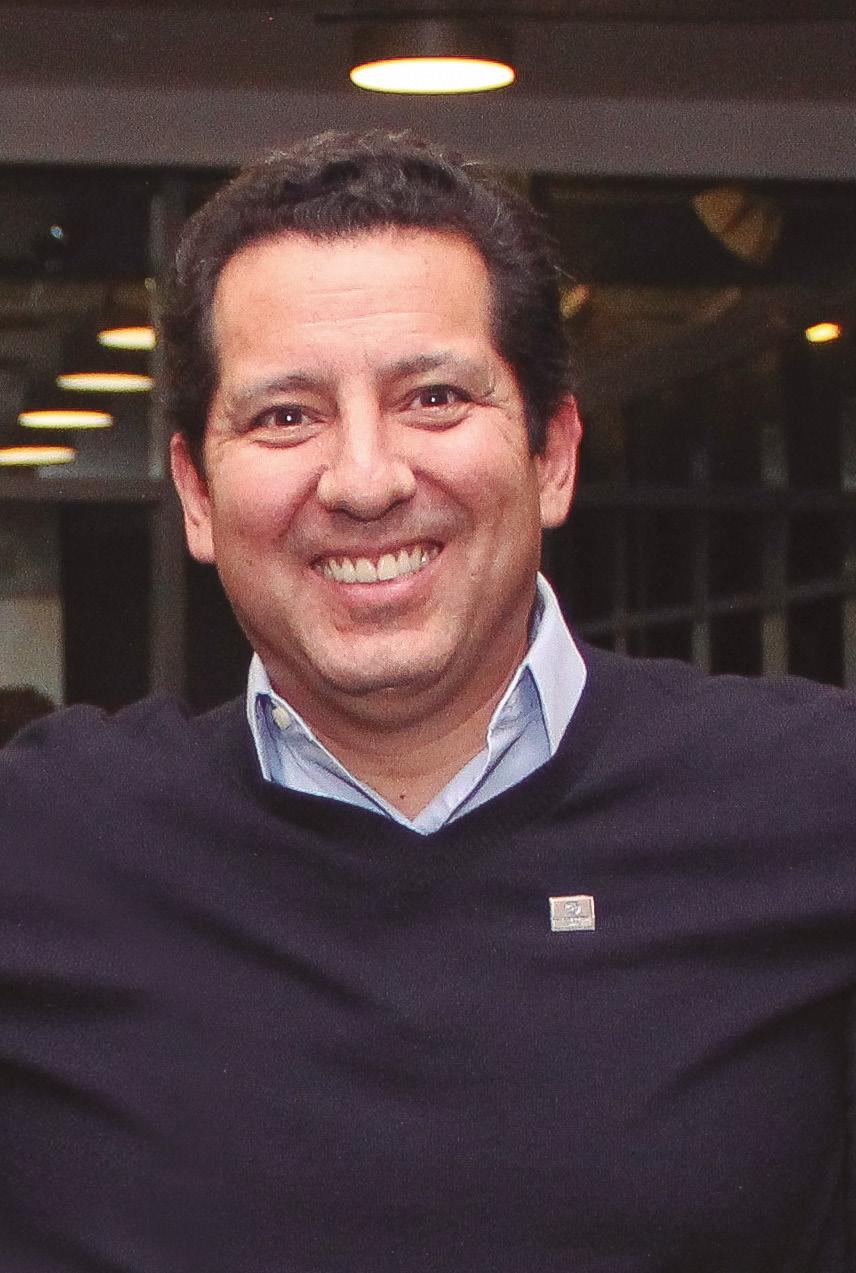
180 | FINTECH COMPANIES IN COLOMBIA ΙΙΙ
Oswaldo Sandoval
Our products DOMESTIC FACTORING
Traditional Factoring is a product for small and medium-sized companies (SMEs) that allows them to quickly finance working capital by converting credit sales into cash transactions. This is an agile process that allows the client to receive its resources in a short period of time, without having to wait for the payment term agreed with its clients.
Benefts
Provide working capital to SMEs to pay their suppliers on the corresponding dates. It does not increase companies’ debt levels. Sell on credit with the certainty that you will find secure financing in advance to cover your cash needs, both with your customers, suppliers and collaborators.

Cash flow relief, allowing companies to concentrate operational and fnancial eforts on their business.
Outsource collection management, relying on a company specialized in this area. Quick information and return of surpluses, as soon as funds are available.
Financing the business of our clients from the beginning, supporting their growth, until the
fnal success. We are the fnancial allies that your company needs!
INTERNATIONAL FACTORING
International Factoring is a product designed especially for export activities, providing credit risk coverage on an individual buyer, the rapid growth of your sales or access to a longer payment term.
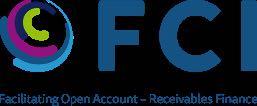
This fnancial package is complete and fexible. Thus, you can use the service you need, whether it is export fnancing, fnancial risk coverage and/ or collection abroad.
Thanks to our global network of Factoring companies, in addition to providing collection and hedging support, you can operate safely, as we evaluate your buyer abroad.
Members of:
LATAM TRADE CAPITAL | 181
CONFIRMING
Confirming is a financial service that helps companies to easily manage the payment to their suppliers, relieving their cash fow.
Benefts?
Allows early payments taking advantage of discounts for prompt payment.
Allows payments after the term stipulated in the fair terms law.
Enhances the bargaining power of companies with their suppliers, improving the commercial relationship.
Improves cash management in accounts payable.
All operations travel through iProveedor, allowing companies to see in real time all accounts payable to their suppliers.
STRATEGIC ALLIANCES
Strategic Alliances are unique products designed by Latam Trade Capital for companies in the business and corporate segment that are looking for options to enhance their growth. At LTC we seek to create sustainable relationships over time through stable, fexible and scalable fnancing, all this through the fnancing of their accounts receivable on a permanent basis.
Clients who choose this line of fnancing have access to long-term working capital through a strategic alliance that will accompany and leverage the growth of their company, allowing them to obtain permanent liquidity without indebtedness.
FRANCHISES
This is a line of fnancing to fnancial companies, through the purchase and refnancing of assets at a discount. Franchises provide access to liquidity to support the growth of the business, expand the customer portfolio and the stock of placements. With our Franchise product we become your financial ally. You only have to worry about selling, LTC fnances your growth.
Benefts?
Our Franchise product is oriented to generate a partnership relationship with our franchised customers, seeking the diversifcation of their payers and their billing volume, allowing them a greater growth hand in hand with a fnancial ally, who in addition to providing fnancing, ofers operational benefts such as the delegation of collection, support with risk analysis, and the use of
RENTORING®
Rentoring® is a unique product in the market designed by CONIX and LTC, which seeks to encourage the development of companies in Colombia from industrial automation processes, through the generation of liquidity, allowing the increase of installed capacity and improving profitability and indebtedness indicators. Generating liquidity and improving cash flow without generating indebtedness.
At the end of the operation, which is typically less than the economic life of the assets required, the client can return it, renew the operation or acquire it for a minimum reasonable market value.
Benefts?
Costs are 100% tax deductible. A long-term funding relationship is generated. Fixed assets of the highest quality are obtained, covered by insurance, warranties and maintenance in the hands of expert professionals.
Possibility of carrying out larger operations. No taxes are assumed (withholding tax). We establish covenants of easy compliance, adaptable to the requirements and needs of each company.
Speed in the structuring of the operation, with a single credit study and a single shipment of information.
182 | FINTECH COMPANIES IN COLOMBIA ΙΙΙ
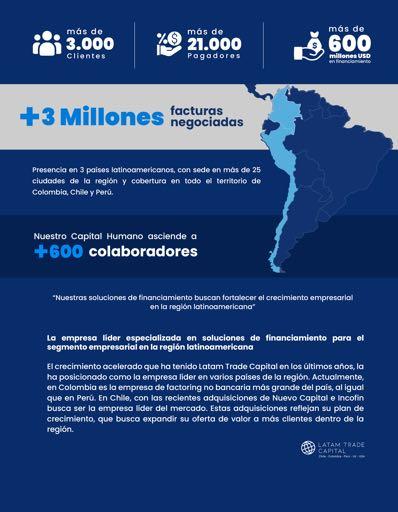
LATAM TRADE CAPITAL | 183
Factoring Myths
Factoring is an option only for small businesses: False. The reality is that factoring is also beneficial for large organizations.
Factoring is very expensive: False. In these operations cost efficiencies can be achieved in terms of volume of invoices to be negotiated, reviewing in parallel rate options with different financial institutions.
It only works for companies with liquidity problems: False, it is a tool that allows companies to organize their cash flow and obtain higher profits.
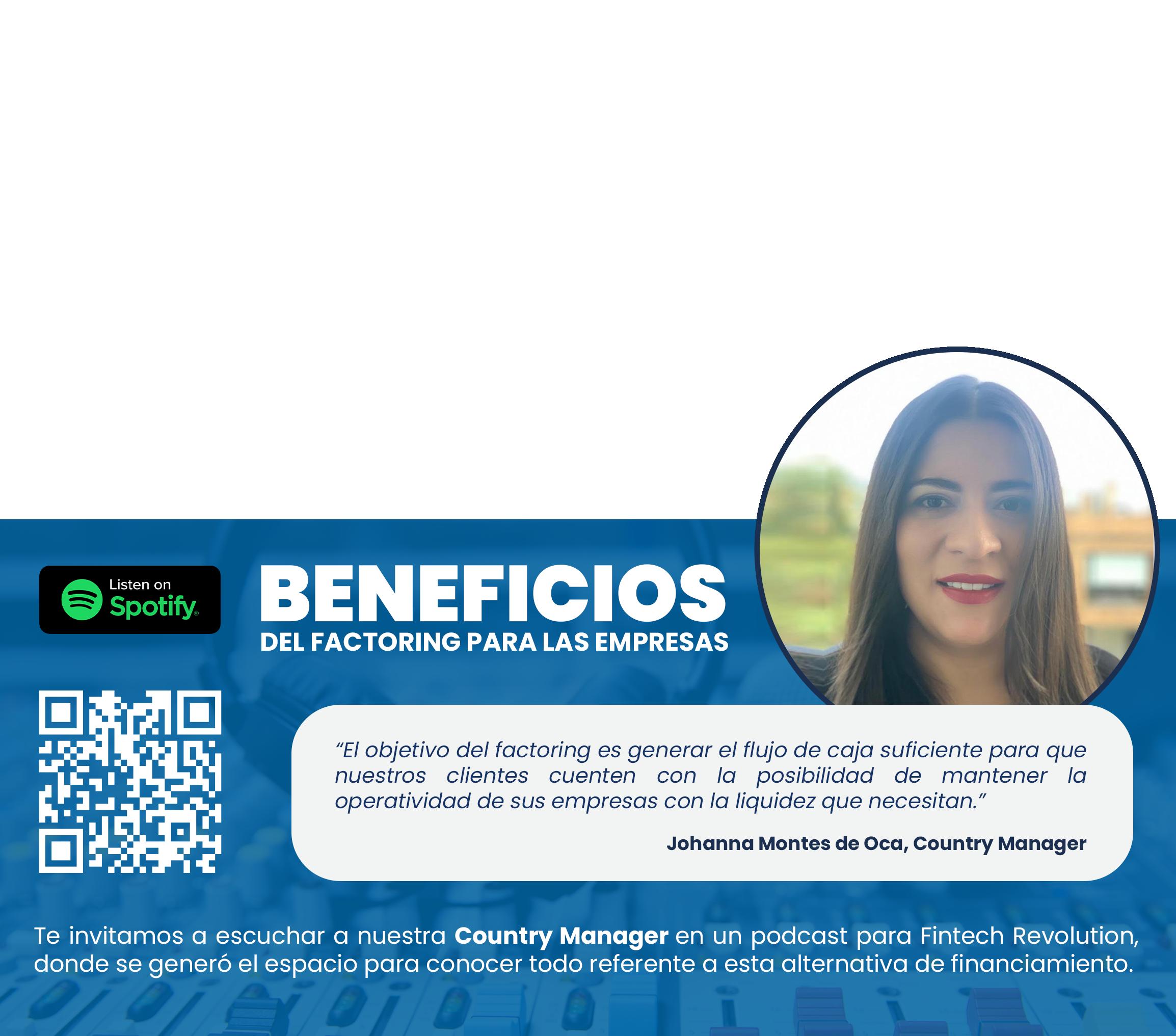
It is a long and tedious process: False. This is a process that is carried out in an agile and simple way, thanks to the fact that it takes place in a totally digital environment.

184 | FINTECH COMPANIES IN COLOMBIA ΙΙΙ

LATAM TRADE CAPITAL | 185


68 DIGITAL CREDIT 12 CRYPTO & BLOCKCHAIN 14 BUSINESS FINANCES 4 INSURTECH 5 NEOBANCO 50 DIGITAL PAYMENTS 19 PFM & WEALTHTECH 22 REGTECH 9 CROWDFUNDING 86 CORPORATE AFFILIATES ECOSYSTEM OF ASSOCIATES


188 | FINTECH COMPANIES IN COLOMBIA ΙΙΙ
ECOSYSTEM OF ASSOCIATES
DIGITAL CREDIT
ABL Capital
ADDI

Adelanta tu pago
Afore
Agaval
Agricapital
Avanzo
Avista
Bankamoda
Bemus
CelYa
Cofnancer
Creci
Credilike
Credissimo
Creditek
Creditoapp
Créditos
Emonkey
Financap
Finewapp
Finky
Finsocial
Fintegra
Gulungo
H.C. Colombia
Invest Latam
Jeeves
Juancho te Presta
Koggi
Kredicity
Kredit
Kuenta
Libertec
Lineru
Linxe


Orbe
ExcelCredit
Fie
Finesa
Finaktiva
Loan Link

Me Presta Online
Monet
Mono Colombia
Mutuo Financiera
On Credit
CRYPTO & BLOCKCHAIN
Binance
Bitpoint



Bitsafe
Buda
Chainalysis
Koibanx
Let´s Bit
Minka
One2Credit
Orange Tech
Panacash
Paynet
Plurall
Prestagente
QNT
Rapicredit
Rayo
Referencia
Sempli
Siiki Credit
Sistecrédito
Solventa
Supre
Tribal Credit
Ubuntec
Valcrédito
Velara
Viventa
Wadana
Wiipo
Reserve
Ripio Colombia
TRU
Wallib
Facturaenlinea.co e Bill
Fisapay
Greensill
I
proveedor
Libera
Liquitech
Mesfx
Nubloq
Siigo

ECOSISTEMA DE AFILIADOS | 189
BUSINESS FINANCES 30 CarteraOK Collect Pay Colfmax Factoring Exponencial Confrming
INSURTECH
Emilian R5 Seguro Canguro
Teca
NEOBANCO
Dibanka Iris Nequi Nubank
DIGITAL PAYMENTS
Armatuvaca
Bold
Cajero
Cobru
Coink
Daviplata
Deel
Ding
DLocal
Druo
Ebanx
Ecollect
Epayco
Epik
Finzi
Fis Global
Flexibility
Global 66
Go Ky
Imix
Inswitch
Kupi
Kushki
Lyra
Lean Core
Mercado Pago
Movii
NovoPayment
Owo Tech
Pandaid
Pagomás
Paymovil
Payqubit








Pay Retailers
PFM & WEALTHTECH
Abaco
Bankiando
Biocredit
Carteras Colectivas
ContratoMarco
Enbanca
Factcil
Figuro
Finerio
Inve
Hola Préstamo
Makers Solutions
NoTeCuelgues.com
Oink
Pay U
Payvalida
Powwi
PTM
Punto Pay
PuntoRed
Recaudia
Sumup
Super Pagos
SuRed
TowerTech
Tpaga
Transfriendo
Tu Compra
Vita Wallet
YellowPepper
Qiip
Resuelve tu Deuda
Sesocio.com
Tranqui Trii
Tributi
190 | FINTECH COMPANIES IN COLOMBIA ΙΙΙ










ECOSISTEMA DE AFILIADOS | 191
REGTECH
2Transfair
Andes
Become Digital
Datainnova
Floid
Fondo de Coberturas
Crediticias
Garantías Comunitarias
CROWDFUNDING
Agrapp
Arkangeles
Finnova
Lisim
Lleida.net
Movizzone
Mareigua
MO Technoogies
Naas
QUASH
Qualita
ReconoSer ID
Risktech
Shareppy International
SoyYo
Tekbees
Truora
Tusdatos.co
Imoblo
Inverti
Mint
CORPORATE AFFILIATES
Acciones y Valores
ACH Colombia
American Express
American Smart Systems & Networks – ASNETS
Arus
Asesoftware
Bancamía
Banco de Bogotá
Banco Pichincha
Banco Popular
Banco Serfnanza
Banco W
BCP
Belvo Technologies
Bolsa de Valores de Colombia
Bolsa Mercantil de Colombia
Buguroo
Bytte
Cacao Paycard
Chubb Seguros
Cidenet
Citibank
Claro
Clouxter
Cobis
Comfama
Coophumana
Corbanca
Credibanco
Credicorp Capital
Credifamilia
Credivalores
CVN Research
DALE
Datacrédito Experian
Dreamlab
Evertec
EY Colombia
Facebook
FGA Fondo de Garantías
Fiduoccidente
Findorse
Fiserv
Fluid Attacks
Fundación Mundo Mujer
G + D
Garantisa
Gases del Caribe
Geopagos
GFO
Giros y Finanzas
GM Financial
Indra
Infobip
Interactuar
Itaú
K2
Terranta
Unergy
Vaki
Kandeo
Kiban
Koncilla
Lexis Nexis
Mambu
Mastercard
Nimmök
Novatec Solutions
Olimpia
Pedersen
Pirani
Poincenot








Proseguir
PwC
Redeban
Santander Consumer
Seguros Mundial
Skandia
Sophos Solutions
Telesign
Thales
Todo1
Transportadora de Valores Atlas
Transunion
Tridy
Ufow
Veritran
Visa
192 | FINTECH COMPANIES IN COLOMBIA ΙΙΙ










ECOSISTEMA DE AFILIADOS | 193
Creating the fnancial and technological future of Colombia
Acknowledgements
This third issue has not been easy. I am infnitely grateful for the unconditional support of my daughter and my wife, who gave me encouragement every day so that I would not faint.
I thank the design team headed by Beatriz Osuna, who has once again done a spectacular job. To the pre-press and printing team of Promograf, led by Germán Izquierdo, who take care of every last detail so that the printing and binding comes out perfect. To my father for his valuable support.
This third issue would not be possible without the invaluable support of the Colombia Fintech Association, headed by Erick Rincón who, with his great energy and hard work, welcomed this new initiative with great enthusiasm; to its board, its collaborators, its members, who kindly took the time to listen to me, to share their stories, experiences, knowledge, dreams and desires. To all the valuable team in each of the companies of the Fintech ecosystem, who with their hard work, efort, talent and dedication, have made Colombia a benchmark country in the Fintech world and who surprise us every day with their innovation and new developments.
A very special thank you to: Andrés Albán, Erick Rincón, Juan Camilo González, Guillermo Guzmán, Mike Simmons, Juan Diego Osma, Gabriel Alzate, Ana María Prieto, Esteban Velasco, Mayra Granada, Silvia Flórez, Luis Carlos Ramos, Daniel Navarro, Sandra Rubio, Alexandra Baquero, Camilo Zea, Daniel Marterón and to Carolina Vélez on behalf of all Fintech women, for their very valuable articles that enrich this work and are a great contribution to the ecosystem.
To all the companies that are part of this edition, who generously shared their history, efort, work, tenacity, enthusiasm, energy, dedication, dedication, passion: Iris Bank, Sistecrédito, Fondo Nacional de Garantías, Trii, Floid, Luegopago, Nimmök, Movii, Nubloq, Sumup, Epik, Rapicredit, Metamap, Infobip and Latam Trade Capital; companies with a great commitment to our country and that have allowed this book to become a reality and you dear reader to enjoy it.
I thank them all for their infnite patience. Mom, thank you very much.
Javier Raventós




 Javier Raventós
Javier Raventós
 Javier Raventós
Javier Raventós





































































 Sede FNG en Bogotá
Sede FNG en Bogotá

























































































































 Daniel Navarro
Flor Suárez
Iván Aguado
Daniel Navarro
Flor Suárez
Iván Aguado












































 Usuario
Contraseña
¡Bienvenido!
Ingresa los datos a continuación
Ingresar
Olvide mi contraseña
Usuario
Contraseña
¡Bienvenido!
Ingresa los datos a continuación
Ingresar
Olvide mi contraseña

























































































